

Kruger National Park
QUICK FACTS
- World-famous for it's wildlife
- Kruger Park is state-owned and accommodates budgets on both the low-end with self-catering, and on the high-end with luxury concessions
- Luxury customers usually fly in to nearby airports (KMIA / SZK / HDS) from either Cape Town or Johannesburg
- Self-drive possible but flying more common for luxury itineraries
- Game viewing best during the dry winters months May to Oct
- Wet summer season brings full waterholes, lush bushveld, many newborn wildlife and the summer migrant birds arrive
- 15+ luxury lodges in 9 private concessions (each run by a particular operator) over an area of 1,950,000 hectares. Bare in mind that the majority of this is state-owned and run.
ADDITIONAL READING
- https://www.safari.com/blog/top-5-kruger-national-park-safaris
- https://www.safari.com/blog/top-10-luxury-lodges-in-the-greater-kruger-park
Lodge and package options are shown below, but if it seems daunting, feel free to contact [email protected]

Sub regions inside
Broader region.

The Kruger National Park is one of the most famous and visited National Parks in Africa, for good reason. Home to an incredibly diverse wildlife population including the Big 5, a wide range of predators, the biggest collection of mammal species in Africa and an amazing range of bird species - the Kruger Park is a mecca for wildlife encounters.
Over and above the endless African wildlife within the reserve, there are also an incredibly large and unique variety of luxury lodges within and surrounding Kruger National Park.
The Kruger National Park is a destination that is generally considered to be good all year-round.
The attraction to the Kruger National Park is most certainly the wildlife and there is no question that the dry winter season from May to October is considered the best time to experience phenomenal game viewing and walking safaris. The bush is less dense and animals tend to gather around the fewer permanent water sources, allowing for better viewing opportunities.
Mid-winter - June to August - is a very comfortable time of year to visit the Kruger as there are few mosquitoes, little if any rain and temperatures are pleasantly warm during the day and refreshingly cool at night. The bone-dry, end-of-winter months of September and October often experience uncomfortably hot and humid conditions but concentrations of animals around water sources are at their highest - this period is often regarded as the best game-viewing time for a Kruger safari.
The summer rains arrive from November onwards , peak in January and February and end around April. The Kruger is transformed into a beautiful, thriving green landscape and it makes for superb photography. Game viewing is still good with many young animals around, making it a predator's paradise. It is also the best time for bird watching as well as safari-and-beach holiday combinations.
The Kruger National Park is considered a low malaria area, however, we would recommend consulting a medical practitioner for advice about malaria.
The Kruger National Park is also very popular during the long December/January school holidays, so should you be looking to travel during this time period, we strongly recommend that you book well in advance and consider the northern parts of the park or the Kruger's private reserves and concessions, should you desire a less crowded experience.
The Kruger National Park is regarded as the ultimate safari destination and the largest in South Africa . With almost two million hectares of pristine wilderness, the park is split into northern and southern reserves. The northern reserves are often referred to as the Greater Kruger National Park .
Home to the famous Big 5 : lion, leopard, rhino, elephant and buffalo, and the highest number of large mammal species on any African reserve, the Kruger offers a rewarding safari experience and an array of accommodation options including luxury lodges and self-catering. Activities offered at most reserves include morning and afternoon/evening open vehicle game drives and guided bush walks. Some reserves offer optional local village tours, hot air ballooning, elephant interactions, visits to animal rehabilitation centers, treehouse sleep-outs and photographic safaris.

Apr 17, 2024
Great experience!
Leigh-Ann was very helpful, responsive and knowledgeable about our safari options. Handled our safari booking, transfers and even hotel in Cape Town for us! We’re excited for our trip - Thank you :)
Apr 16, 2024
Sara is really friendly and helpful. She has planned everything according to our wishes and made all our wishes feasible.
Apr 12, 2024
Anja is very attentive and patient.
Apr 11, 2024
Shann is a great professional
Shann immediately demonstrated pleasant professionalism, competence, experience and patience. She advised and accompanied me in organizing the trip. She listened to all my needs and the suggestions were very fruitful for me. he was very kind and always available even during the holidays. thank you Shann
It was easy
It was easy, it all worked as planned, our expectations were exceeded. Anja was easy to communicate with through Whatsapp and always responded promptly to any questions.
Apr 10, 2024
She made it so easy to book
She made it so easy to book - Leigh-Ann was great to deal with . She made it so easy and worked with the dates I gave her . I appreciate it so much and when I book my next safari - I hope to have the same experience - which was awesome !!!!
Botswana Experience
Anja, our agent, was very kind and helpful all the time to organize the perfect trip. She did it quickly and efficiently. The amount of days we spent in every place was perfect to really enjoy the hotels and the different activities they proposed (in general the hotels are very nice but we don’t have the time to really experience the place but here we did). Also the selections of hotels was very very nice. Nice infrastructure, excellent service (very professional) and outstanding places to visit (all the parks were great). We had a wonderful experience with the company in Botswana.
Thank you Heleen for great service and…
Thank you Heleen for great service and always very helpful with all the changes we made. highly recommended
Keith was extremely helpful during the…
Keith was extremely helpful during the booking process. He is the only reason I continued the booking process with your firm. There were issues with your website among other things that had me feeling uncomfortable. Keith has great energy which eased my concerns. I feel the package Keith put together is great and I expect to have a wonderful trip.
Private Vehicle Morning Safaris
Private vehicle afternoon safaris, private vehicle full day safaris.
- 3 Day Best of Kruger Safari
- 4 Day Best of Kruger Safari
- 4 Day Kruger and Panorama Safari
- 5 Day Kruger and Panorama Safari
3 Day Best of Kruger Private Safari
- 4 Day Kruger and Panorama Private Safari Tour
- 5 Day Kruger and Panorama Private Safari Tour
3-4-5 Day Kruger Safari Packages
Rated on TripAdvisor as leading Kruger Safari packages with 1564 – 5 Star Reviews / Departing Johannesburg every Monday – Wednesday – Saturdays
Private Kruger Safari Packages
4 day private kruger and panorama safari, 5 day private kruger and panorama safari, private kruger day safaris, trip advisor reviews, explore our range of specialized tours.
Choose a private safari for a personalized and exclusive wildlife experience with your own guide and vehicle, offering flexibility and intimacy in exploring Africa’s incredible wildlife.
Choose from our range of private Safari packages that including options for couples, family safaris, and fly-in safaris.
Customize your adventure to match your preferences, whether you’re seeking a romantic getaway, an exciting family experience, or a luxurious fly-in safari.
Experience a variety of safari options, complete with all the expected comforts and inclusive of conservation fees, making our Kruger Park safaris a cost-effective choice for your thrilling adventure.
SATSA Accredited
Being a SATSA accredited company means we are committed to adhering to and governed by the regulations established by the South African Tourism Services Association.
Professional
From booking your accommodation to planning your day trips into the Kruger National Park in the company of one of our tour guides, Kurt Safari will do it all for you.
In order to guarantee the finest possible African experience during your stay, we make it a priority to offer our guests round-the-clock support.
We cherish the African wilderness we call home, and our entire team, including guides and consultants, are local residents living near Kruger National Park.
With more than 20 years of experience
With over two decades of experience guiding guests through the magnificent Kruger National Park, Kurt Safari stands out as South Africa’s premier Kruger National Park safaris tour operato r . Our range of Kruger National Park safari travel packages caters to clients seeking an authentic African safari experience, where rustic adventure meets modern comfort. Every aspect of our Kruger Park safaris and tours is meticulously tailored to accommodate various budgets, preferences, and tastes.
Our Kruger Park safaris offer options for both budget-conscious travelers and those looking for a touch of luxury. Guests not only have the opportunity to explore the best of Kruger National Park along its most wildlife-rich routes but also to discover some of the region’s most fascinating and beautiful attractions.
Guided by trained and passionate guides, guests can enjoy up to 9 hours of safari time in the Kruger National Park on our Full Day Safaris, a longer duration compared to most other companies. We use comfortable open-air safari vehicles, providing guests with a remarkable bird’s-eye view of the wildlife encounters.
The majority of our private Kruger Park safaris and tours take place in the wildlife-rich Southern Kruger region, home to the renowned Big 5 – Lion, Elephant, Buffalo, Leopard, and Rhino, as well as herds of zebra, wildebeest, and a plethora of bird species, with over 148 mammal species residing in the Kruger National Park.
Kurt Safari offers a range of Kruger National Park safari packages, including 3, 4, 5, and 8-day options, including Photographic and Birding safaris led by experienced guides.
Booking any of our Kruger Park safaris is easy through our website. You can choose the package that best suits your needs, book directly online, and make secure payments. Alternatively, feel free to reach out to us to speak with one of our knowledgeable consultants.
Our base is in Hazyview, just a short 15-minute drive from the Kruger National Park. Our consultants, guides, and management team are primarily locals with a deep understanding of the Kruger National Park and its wildlife. They can provide you with valuable insights that you won’t find online, ensuring a memorable holiday.
For clients on overnight Kruger Park Packages, we arrange stays at quality private lodges, a short 10-15 minute drive from the Kruger National Park. These lodges offer top-notch quality, including Wi-Fi, breakfasts, and dinners, combined with air-conditioned accommodations, enhancing your safari experience.
Kurt, the Director of Kurt Safari, has guided Kruger Park safaris for nearly 12 years before founding our company. We are now rated as the leading safari operator on TripAdvisor. Our packages have been personally designed after years of trial and error, with a focus on quality guiding and safety, complemented by amenities such as quality accommodation, fantastic meals, and an affordable and memorable experience.
We look forward to welcoming you to Kruger and hope you enjoy your Kruger Park safari with us.
Welcome to Krugersafaris.com, where you can explore a range of affordably priced safaris in Kruger Park, along with valuable travel information.
Embark on your adventure with us.
Krugersafari.com stands as one of Kruger’s premier tour operators, with over two decades dedicated to welcoming guests from around the globe to partake in the ultimate Kruger Park safari experience.
We offer a diverse range of exceptional Kruger safaris for our clients to select from. Each safari is conducted in an open safari vehicle and led by one of our experienced guides, each with years of expertise in guiding tours through the Kruger. Our safari packages are meticulously crafted to ensure you have an unforgettable time in our beautiful country. Recognizing that for many of our guests, a visit to the park is a once-in-a-lifetime adventure, we strive to make our Kruger Park safaris as enchanting, captivating, and memorable as possible. Whether you’re seeking a single-day excursion or a 3-day, 4-day, or even 5-day adventure in the Kruger, we have the perfect tour for you. Our offerings include shared safaris, private Kruger Park safaris, and packages for those interested in exploring the Panorama Route and the Kruger National Park.
Enhancing your Kruger Park experience is the newly introduced Umbhaba Eco Lodge, offering world-class service and quality, complete with en-suite air conditioning. In cases where Umbhaba Eco Lodge is fully booked, we utilize the Sanibonani Lodge in Hazyview.
The Krugersafari.com Experience
A journey to the park with us promises a relaxed experience, and our well-organized itineraries and inclusions in each tour ensure you are well taken care of and in excellent company.
Our guided tours are competitively priced and efficiently arranged, with accommodation included in each overnight package, the style of which varies based on the Kruger tour you choose.
We specialize in small guided group Kruger Park safaris, and with daily departures from Johannesburg to Hazyview, you can arrive in the city in the morning and be enjoying the Kruger in the afternoon! Our Kruger safaris are perfect for both local and international visitors.
Each safari vehicle is open, providing excellent visibility to easily spot animals amidst the wild vegetation. This exceptional visibility makes our safaris ideal for both aspiring and seasoned photographers looking to capture unique shots. For those seeking a more photography-focused safari, explore our custom photographic safaris.
The Kruger National Park unquestionably ranks as the best place in South Africa to encounter the Big 5: Lion, Leopard, Elephant, Rhino, and Cape Buffalo. A day trip to the park is sufficient to spot these iconic animals and more. Keep in mind that when exploring the Kruger, you never know what awaits around the next bend in the road! The Kruger boasts an incredibly diverse array of wildlife species, along with hundreds of bird and reptile species.
While we offer a wide array of Kruger Park safaris and thrilling game drives for our guests to choose from, we are also more than willing to customize a package to fulfill all your wildest safari dreams! We always go the extra mile for our guests, understanding the profound impact a real African safari can have. Our accreditation with SATSA ensures that the safari you book will meet all your expectations, providing a safe, reasonably priced, and one-of-a-kind experience. Each of our safaris promises to deliver the African adventure you desire.
You can find pricing details for our best-selling Kruger Park safaris on our website.
If you have any questions about our tours, please feel free to reach out to our helpful team based in Hazyview. You can also visit TripAdvisor to peruse our latest reviews.
We eagerly await the opportunity to welcome you to the African continent. You can book your safari through our website or contact us via email.
Essential information for kruger park safaris.
The magnificent Kruger National Park stands as one of South Africa’s most beloved and iconic landmarks. Every year, this conservation reserve warmly welcomes numerous visitors from around the globe. Many of these guests embark on various Kruger Park trips or opt for a self-driven adventure through the park, all seeking the serene solitude that can only be found in the wild. However, it’s not just the tranquility that draws visitors to the park; it’s the captivating wildlife.
Credit goes to Paul Kruger, the former president of the now-defunct Transvaal Republic, who dedicated himself to setting aside a portion of Transvaal for the preservation of animals. Without his tireless efforts, the park’s inhabitants would have long vanished from the landscape. In 1898, when the park was initially established, hunting was rampant, and trophies of big game like lions and elephants were highly coveted by foreign visitors. To safeguard the local wildlife from complete extinction, the park was designated as a no-hunting zone, and it remains one of the world’s oldest and largest conserved areas to this day.
Today, we enjoy the fruits of the wisdom and foresight of those who came before us. A Kruger Park safari is an unforgettable experience, and it’s more affordable than you might imagine. Initially, tourists didn’t enter the park; however, around 1927, the first paying visitors were permitted to explore it. In those early days, there were no accommodations inside the park, so visitors had to exit before sunset.
As time passed and transportation methods evolved, more tourists began arriving, and accommodations were developed to allow them to stay overnight. Entry fees were never excessively high, earning the park a reputation as the “People’s Park,” a place where anyone could experience the wonders of conservation. Today, even a 7-day safari is quite budget-friendly, and there’s always the option of a self-driven adventure through the park.
Booking a Kruger Park safari or a Kruger Day Tour has never been easier. A quick online search will yield a plethora of options, many of which are offered by reputable safari companies like ours. Why choose to book a safari instead of going for a self-drive? Well, in reality, it requires less planning and can save you a few bucks (pun intended).
The Establishment of an Iconic Conservation Park
Although the Kruger National Park was officially declared in 1898, it wasn’t until 1927 that it was officially named the Kruger National Park and opened its gates to tourists. Those early years were quite intriguing, as tourists would traverse the park on a train, providing limited visibility of the wildlife. The route was fixed and unchangeable, but it was considered the safest way for early visitors to experience the park. These were the days before the advent of the automobile, so it’s easy to imagine how the park’s accessibility changed after cars became commonplace.
By 1928, a board of directors was overseeing the Kruger Park, and it was determined that in order to make the park more accessible to visitors, overnight accommodations were needed. The park’s first rondavels, round-hut-style accommodations that have since become synonymous with the park, were constructed at Skukuza, Pretoriuskop, and Satara. As more and more guests flocked to the park, additional accommodations were added for their convenience, while the former ranger lodgings were also converted into unique guest accommodations.
For those who have researched South Africa and the Kruger Park in particular, it’s well-known that the summers in the region can be exceptionally hot and humid. One can sympathize with the park’s earliest overnight guests who grappled with the challenge of staying cool. In fact, staying overnight in one of the rondavels was not a popular choice in those days. While it was a novelty, the heat was often unbearable, and mosquitoes were a constant nuisance that couldn’t be kept out. These days, rondavels are equipped with fans, and some even have air conditioning. Additionally, in those early days, the accommodations did not provide complete isolation from the wilderness. As the park expanded and construction progressed, guests gained more protection from the wildlife and access to ablution blocks where they could bathe or shower.
The Flora and Fauna of Kruger National Park
While the park’s wildlife is the primary attraction for visitors, the plant life in the area is equally as captivating as the animals. The flora within the park is incredibly diverse, and the park is divided into four distinct regions, each characterized by its unique plant species.
- Thorn Trees and Red Bush-Willow Veld Located in the western and central parts of the park, just south of the Olifants River, this region is dominated by red bush-willow and acacia (thorn) trees. Marula trees are also abundant in this area, while acacia trees line the rivers and streams. The Nwatimhiri Bush and areas along the Sabie River are particularly dense with vegetation.
- Knob Thorn and Marula Veld South of the Olifants River and to the eastern part of the park, you’ll find the knob thorn and marula veld. This region offers ample grazing grounds and is characterized by red grass, buffalo grass, knob thorn trees, and marula trees, making it an essential part of the park’s ecosystem.
- Red Bush-Willow and Mopane Veld In the northern part of the park, west of the Olifants River, the predominant vegetation consists of red bush-willow and mopane trees.
- Shrub Mopane Veld The northeastern part of the park is predominantly covered by mopane trees.
It’s important to note that these regions host a wider variety of plants and trees than those mentioned above. The abundance of these trees and bushes contributes to the naming of the areas, and each region plays a crucial role in supporting the park’s diverse wildlife.
Notable Wildlife and Conservation Efforts
Kruger National Park is renowned for being home to the Big 5, which includes lions, leopards, elephants, rhinos, and buffalos. While these iconic animals are a major draw for Kruger visitors, the park also houses a broader array of species than any other park on the African continent, totaling 147 species of animals. In addition to numerous predators and large animals like elephants, the park is home to a variety of antelope species such as kudu, impala, nyala, and eland. Furthermore, the park serves as a sanctuary for endangered and rare species, such as the wild dog, underscoring its importance in wildlife conservation.
Anti-Poaching Measures
Due to the presence of numerous endangered species within the park, extensive efforts have been in place for many years to combat poaching. Anti-poaching units are equipped with cutting-edge prevention tools, including night vision technology and advanced telescopes. Game rangers, law enforcement officers, and military personnel have all actively participated in the campaign to curtail poaching activities. While there has been a reduction in poaching incidents, animals, particularly rhinos, remain under constant threat.
While elephants are sporadically targeted by poachers, it is the rhinoceros that often makes headlines. Poachers enter the Kruger National Park during full moon nights, targeting both black and white rhinos for their valuable horns. These horns can fetch approximately $66,000 per kilogram on the black market. Despite bans on horn trade in most countries, these restrictions have had limited impact on deterring illegal activities.
Exploring the 12 Principal Camps of Kruger National Park
Kruger National Park offers a multitude of reasons to visit, and among them is the rich history and warm hospitality found in each camp. The park is a laid-back haven, where even the bustling main camps exist in their own tranquil bubble, far removed from the modern world. Before delving into discussions about the park’s historical significance, its incredible wildlife, or the safari experiences it offers today, let’s take a closer look at each of the 12 main camps.
Located in a mountainous area, Berg-n-Dal is a unique camp that has preserved its natural environment and habitat. Dry riverbeds run along its southern and northern borders, and the camp boasts large trees. Wildlife enthusiasts can spot creatures like wild dogs, klipspringers, and leopards near the camp. Berg-n-Dal is one of the newer camps in the park, offering a range of facilities and comfortable accommodations.
Crocodile Bridge
As one of the smaller camps in Kruger National Park, Crocodile Bridge takes its name from the nearby Crocodile River. It’s an excellent spot for game viewing, especially along the Southern Circle, where lions are frequently sighted. Other animals in the area include kudu, giraffes, spotted hyenas, and cheetahs. This camp has garnered multiple nominations as the best camp in the park.
Letaba is ideally situated at the park’s midpoint, acting as a bridge between the north and south. Its name means “River of Sand,” and it’s renowned for its elephant sightings. The area around Letaba is lush and green, bursting with nighttime activity, including bats, owls, nightjars, frogs, and cicadas. It’s a prime spot for observing elephants and bushbucks.
Lower Sabie
Lower Sabie sits on the banks of the Sabie River, offering a serene and laid-back atmosphere. The camp is well-known for its majestic trees, making it an ideal location for leopard sightings. Other animals that frequent the area include hippos, lions, and various antelope species. Lower Sabie provides excellent accommodations.
Mopani camp is surrounded by Mopani trees and features a massive baobab tree at its center. The camp’s vegetation is left in its natural state, and wildlife enthusiasts can spot hippos, waterbucks, and tsessebes. The camp borders Pioneer Dam, attracting animals for afternoon and morning water breaks.
Olifants is renowned for its breathtaking views, perched high on a hill above the Olifants River. The camp is surrounded by viewing platforms that offer an excellent vantage point for observing wildlife near the water below. Animals like crocodiles, lions, elephants, and hippos can be spotted here. The camp also offers great accommodation options and a picturesque picnic area.
Orpen, along with its satellite camps Maroela and Tamboti, enjoys a strategic location. The camp is named after Eileen Orpen, the land’s owner who donated it to the park. This grassy area is ideal for observing grazing animals, and the surrounding open plains are home to numerous lion prides. The night air resonates with the roars of lions, creating an unforgettable experience. Orpen offers diverse wildlife sightings, including the Big 5, wildebeests, and jackals.
Pretoriuskop
Nestled among ancient granite rocks, Pretoriuskop is home to fascinating granite boulders. As one of the park’s oldest camps, it retains a historical charm in its layout and style. The camp is known for sightings of Sable antelopes, Lichtenstein’s Hartebeests, wild dogs, and kudus. Its proximity to one of the park’s entry points makes it a popular choice for visitors.
Punda Maria
Punda Maria, located in the park’s northernmost region, experiences scorching temperatures even during winter. It boasts a unique sandveld habitat with diverse plant life, earning it the nickname “botanical gardens of the park.” Wildlife enthusiasts may encounter nyala, wild dogs, and zebra herds. Punda Maria is an ideal destination for those seeking tranquility.
Satara was one of the first camps to build rondavels, offering overnight stays to interested guests. Today, it’s a bustling camp renowned for excellent game viewing opportunities. Nestled in a wooded area, Satara is considered rustic and a haven for birdwatchers. Visitors can spot lions, giraffes, wildebeests, and the elusive honey badger.
Shingwedzi, another camp in the park’s northern region, is celebrated for wildlife sightings, including nyala, waterbucks, and elephants. The scenic route along the Shingwedzi River provides access to the camp. With its rustic charm and limited modern conveniences, Shingwedzi offers a true break from the ordinary. The camp’s sparser vegetation makes wildlife spotting easier.
Skukuza is often saved for last on our list, serving as the capital of Kruger National Park. It’s the central hub where day visitors typically stop for lunch. Situated along the Sabie River’s southern banks, Skukuza boasts multiple lookout points and a tranquil atmosphere. Visitors can encounter animals such as spotted hyenas, bush babies, and warthogs. The camp also offers a range of accommodations and modern conveniences.
Each of these main camps provides a unique experience and a glimpse into the rich tapestry of Kruger National Park.
Additionally, the park features satellite camps, bushveld camps, overnight hides, bush lodges, luxury lodges, and campsites to cater to various preferences and interests.
Exploring Kruger National Park from the comfort of an open safari vehicle remains a highly popular way to experience the park. It allows guests to get up close to nature while ensuring their safety. With the wind in your hair and the captivating sounds of Africa all around, a safari in an open vehicle will create lasting memories. Additionally, it provides excellent opportunities to capture stunning photographs.
At Kurt Safari, we provide some of the most competitively priced Kruger National Park safari experiences. We offer private Kruger National Park tours and day tours, giving guests various options to consider when planning their visit to the park. Don’t hesitate to book your tour with us today.
Commonly asked questions about kruger national park, is a kruger national park safari the finest african safari experience.
The Kruger National Park stands as a renowned and captivating tourist destination in South Africa. This wildlife sanctuary is globally acclaimed for its rich assortment of animals, diverse biomes, and plant life. Its establishment dates back to May 1926, thanks to the dedicated efforts of game warden James Stevenson-Hamilton and the late President Paul Kruger. The Kruger National Park came into existence through the merger of various lands and the Sabi Sand Game Reserve, forming the expansive park we know today. Its primary purpose has always been the conservation of Lowveld animals.
Within the Kruger National Park resides an astonishing array of animal, plant, and bird species. It boasts some of the world’s largest and swiftest creatures, such as the African Elephant, Cape Buffalo, White and Black Rhinos, and lions, all of which draw visitors from around the globe. The park’s location in the Lowveld region offers a surprising diversity of biomes. Each of these biomes features remarkable variations in terms of animals and plant life. Travelers can traverse sandy and arid areas with resilient plants, sparser landscapes, and animals adapted to the hot and unique environment. Further exploration leads to lush savannah bush with abundant water, trees, and plant species.
Due to its vastness and diversity, every visit to the Kruger National Park promises a unique experience. Some days, guests may witness the Big 5 within a few hours, while on other days, they might encounter zebras and impalas. This unpredictability is what makes the Kruger Park a beloved and frequently visited destination, offering spontaneous and thrilling adventures.
Embarking on safaris within the Kruger National Park is an excellent way to immerse oneself in its wonder and beauty. Knowledgeable guides can lead guests to various exceptional areas, share informative and fascinating insights, and enhance their understanding of the park. These guides are well-trained and deeply passionate, which reflects in the exceptional treatment guests receive during safaris.
Kurt Safari proudly holds the title of the No.1 Rated Kruger National Park Safari Company. We offer high-quality and affordable 3-4-5 Day packages and day safaris led by experienced guides. The park’s vast expanse, coupled with its breathtaking landscapes and an astounding variety of animal species, is incredibly inviting. The Kruger National Park is steeped in captivating history and compelling stories that captivate and entertain individuals of all ages and interests. Safaris in the Kruger create indelible memories, often leaving guests with lasting impressions of adventure in one of South Africa’s wildest and most diverse places.
With numerous ways to explore and experience the Kruger National Park, the ease of booking a safari, and the friendly and helpful nature of the guides, embarking on a Kruger Park Safari is a decision you’ll never regret.
Is Kruger National Park a Hazardous Destination?
Kruger National Park enjoys global acclaim for its incredible wildlife, picturesque landscapes, and rich history. Every day, thousands of people visit the park, eager to explore its offerings. The Kruger Park boasts numerous captivating sights, including scenic hilltop camps with river views, lookout points near rivers or watering holes, and picturesque clearings by the roadside. Visitors have the opportunity to encounter animals throughout the park, which also means the possibility of interactions and potential risks, both with wildlife and fellow humans.
Among the notable dangers:
African Elephants: While these gentle giants are usually passive, they can become agitated and defensive when their calf is present. Elephants have a strong maternal instinct and will protect their offspring at all costs. Agitated elephants may provide warnings before attacking, but danger arises when separating the calf from its mother or when there is limited space to move. Fortunately, elephant attacks are not common occurrences.
Buffaloes: Buffalo herds pose a greater threat than elephant herds. When provoked, buffaloes can attack without warning. They are social animals that often defend themselves in groups. When a vehicle threatens the herd, they may charge or stampede, causing chaos and a serious danger to all involved. Buffaloes have been known to damage vehicles and harm people.
Hidden dangers include:
On-Foot Dangers: Guests walking in the Kruger, whether on a bushwalk or within rest camps, may encounter hidden dangers such as snakes and spiders. The park is home to 152 spider species, including potentially dangerous ones like the Button Spider, Sac Spider, and Violin Spider. When on foot, guests should also be cautious of snakes, which can seek shelter in various places and strike without warning when threatened.
Curious Vervet Monkeys: Some park residents, like Vervet Monkeys, are curious and may come into close proximity to humans. These clever animals travel in large troops and are commonly found near rest camps where they can access trash cans and fresh food. Vervets may enter people’s accommodations and can become aggressive when cornered or injured. A troop of Vervet Monkeys can pose a danger to both visitors and themselves.
In summary, while the Kruger National Park offers incredible wildlife encounters, visitors should be aware of potential dangers and exercise caution. It’s crucial to respect the park’s wildlife and follow safety guidelines to ensure a safe and enjoyable experience.
What is the price of a Kruger National Park safari?
Kruger National Park stands as the top tourist destination in South Africa. Its immense size, abundant wildlife and plant species, along with exceptional photography opportunities, make it a must-visit when traveling to South Africa. Many international visitors may not be fully aware of what to expect and the associated costs during their stay at Kruger National Park.
The overall cost of your safari experience in Kruger largely depends on your preferences and activities. Entrance fees to the park can vary based on your nationality. South African citizens pay R200 per adult and R50 per child, while international guests are charged R400 per adult and R200 per child. In addition, all visitors, regardless of nationality, must pay daily conservation fees of R400 per adult and R200 per child.
Visitors have the option of embarking on a self-drive safari, where they take charge of their entire adventure, from driving around the park to creating their own schedule. Self-drive safaris are popular among those who wish to explore Kruger National Park at their own pace, spend quality time with family and friends, and avoid strict schedules. The costs associated with a self-drive safari typically include entrance and conservation fees paid at the gate, fuel expenses, funds for food and snacks during the day, and money for souvenirs. Accommodation, if needed, is a separate cost and can sometimes be relatively expensive.
Alternatively, there are numerous safari companies that offer guided tours, providing a wide range of experiences at varying costs. Many of these companies offer 3/4/5-day safari packages, catering to different budgets. These packages can range from budget-friendly options to more luxurious tours that include meals. It’s essential to research different safari companies to find one that aligns with your preferences and budget. For guests opting for a 3/4/5-day safari, accommodation costs are usually included in the tour package, allowing them to focus on the experience rather than worrying about where to stay.
Safari experiences with a tour company offer the advantage of exploring more of Kruger National Park while being guided by experienced tour guides who provide valuable insights about the park and its wildlife. Guides keep track of animal sightings, ensuring reliable and exciting tours. On the other hand, self-drive safaris provide a relaxed and cost-effective alternative, allowing guests to spend the entire day making memories with family and friends at their own pace. Newcomers to Kruger Park are encouraged to consider guided tours, especially if they are not familiar with the park’s landscape and surroundings.
Which Kruger National Park Camps are considered the finest?
The Kruger National Park is enveloped by an incredibly diverse landscape, featuring a wide range of biomes that house distinct plant life, climates, and wildlife. Given its extensive size, the park offers numerous opportunities for visitors to take a break, enjoy meals, cool off, and find accommodation after a day of exploration. Throughout the Kruger Park, there are a variety of unique rest camps, tent camps, and lodges designed to accommodate and meet the expectations of any traveler.
Indulgent Retreats: Within the Kruger National Park, there are numerous exceptional rest camps, each offering unique features that set them apart. If you seek central access to the park, luxurious accommodation options, breathtaking scenery, and a wealth of amenities like a cinema, library, and restaurants, Skukuza is an ideal destination. Satara, located right in the heart of lion territory, is renowned for its prime location. Guests are virtually guaranteed to encounter numerous lion prides while visiting this area and staying at the camp. Satara Camp has a rustic charm and is not as bustling as Skukuza, providing the luxury of a modern camp combined with the tranquility of a smaller rest camp.
Elephant Haven: Elephants are a major attraction in the Kruger Park, making an area known for spectacular elephant sightings immensely popular. Olifants Camp is situated atop a hill, offering unparalleled views. The camp is celebrated for its breathtaking vistas and is often considered one of the finest camps in the Kruger. Its peaceful ambiance and reputation as an elephant hotspot make it a unique and highly regarded choice for accommodation.
Secluded and Serene: For those who prefer a lighter, more minimalist experience, there are plenty of rest camps that offer excellent camping opportunities. Berg en Dal is one of the larger camps in the Kruger, but its location in a hilly area surrounded by dry riverbeds creates one of the most serene and relaxed places to spend the night. Some of the best camping spots are situated near the camp’s fences, providing unobstructed views of the Kruger’s natural beauty, free from the interference of buildings and trees. Balule, located close to the center of the Kruger Park, is the second smallest camp in the park. Despite its proximity to Satara, Balule is a preferred choice for those seeking peace and solitude. Balule is a satellite camp without electricity, where the kitchen operates on gas, and it boasts spacious areas that offer less shade but more opportunities for stargazing. The camp is frequently visited by hyenas and elephants that patrol the low fence, allowing guests to feel truly immersed in nature during their stay at Balule Satellite Camp.
What wildlife can be observed in Kruger National Park?
Kruger National Park is home to a diverse array of mammal, bird, and plant species. Its establishment dates back to May 1926, but even before that, the Sabi Sand Reserve was dedicated to conserving Lowveld wildlife. When Kruger National Park was founded, it was declared a sanctuary where no animals were to be hunted.
The Lowveld region is renowned for its unique mammal species, many of which are exclusive to this area. Among the notable mammals in the park, Lions take the spotlight as the second-largest cat species globally and the largest in South Africa, second only to the Tiger. Lions are highly social creatures, often found in large prides comprising a dominant male, juvenile males, numerous lionesses, and their cubs. Another sought-after cat species in the park is the elusive Leopard, known for its solitary and secretive hunting behavior, blending seamlessly into the savannah vegetation. The Cheetah, the world’s fastest land animal, surprises many safari-goers with its appearance, resembling a Leopard but with a more slender build and smaller spots. Other lesser-known and rarer cat species in the park include the Rooikat, Wild Cat, Serval, and Caracal, which are solitary and often nocturnal hunters.
Antelopes are a predominant presence in Kruger National Park and are usually among the first animals encountered upon entering the park. The common Impala is a highly social species found in large herds, often mingling with Zebra and Buffalo herds. Known as the “McDonald’s of the Kruger” due to their abundance, Impalas are easy prey for many predators. Other notable antelope species in the park include the Kudu, which serves as a symbol of Kruger National Park, and the Eland, the world’s largest antelope species. These magnificent antelopes are highly prized in hunting reserves but are protected within the park.
Among the park’s largest animals are the African Elephant, renowned for its majestic herds and strong maternal instincts. It is the largest and heaviest land animal globally. The Black and White Rhinos, while popular, face severe threats from poaching, and their populations have significantly declined. Other notable giants in Kruger include the Cape Buffalo and the Blue Wildebeest, commonly found near water sources and interacting with Zebra and Impala herds. While mostly passive, they can be dangerous if provoked.
The variety of animals in Kruger National Park is astonishing. Zebras are a delight to observe as they socialize with Impalas and engage in unique interactions. Wild Dogs, although rare, are highly sought-after animals often on the wish list of safari-goers. Hyenas are more active in the afternoon and can be recognized by their distinctive calls. Giraffes are a fun encounter, though sometimes challenging to spot amid the trees. They travel in small herds, making a memorable sighting nearly guaranteed during your adventure in Kruger Park.
What bird species can be observed in Kruger National Park?
While Kruger National Park is renowned for its diverse mammal and reptile species, the rich variety of bird species within the park often goes unnoticed. Yet, the park offers exceptional opportunities for birdwatching, attracting enthusiasts with thrilling sightings.
One of the most iconic and sought-after birds in Kruger National Park is the Bateleur Eagle. This striking bird is frequently spotted perching in trees near sandy areas of the park, delighting birdwatchers on Kruger Park Safaris. Another common sight at rest camps is the Greater Blue Eared Starling, a beautiful blue bird often seen flying close to people in search of food scraps. The park is also home to a variety of eagle and hawk species, including the Bat Hawk, Hawk Eagle, and Crested Eagle, among others.
A well-known avian resident of the Lowveld is the African Fish Eagle. Its distinctive call often precedes its appearance as it soars through the skies. This majestic raptor is frequently seen near bodies of water capable of sustaining it. Their sizable nests, averaging 2 meters in diameter and a meter deep, are often found in trees near watering holes. African Fish Eagles may have multiple nests that they visit when food is scarce in a particular area. Another bird closely associated with Kruger National Park is the humble Helmeted or Spotted Guinea Fowl. These small birds are commonly observed in small flocks in rest camps, picnic areas, and along roadsides, particularly in the mornings. Local lore suggests that Guinea Fowls should only be eaten during months without an ‘R’ in their names, such as May, June, July, and August.
A group of birds, known as the “Big 6” of birds, mirrors the concept of the Big 5 mammals. This group includes the Kori Bustard, recognized as the world’s heaviest flying bird; the Martial Eagle, strong enough to knock an adult off their feet; the Leppetfaced Vulture, Africa’s largest vulture; the Pel’s Fishing Owl, often referred to as the leopard of the group due to its rarity; the Saddle-billed Stork, known for its vibrant plumage; and the Southern Ground Hornbill.
Kruger Park also hosts numerous common bird species commonly found in the Lowveld region. Birds like the Hadida, Hammerhead, Hoephoep, Kingfishers, Woodpeckers, and the Piet-my-Vrou are frequently seen throughout the park, providing a sense of familiarity and comfort to many visitors.
Discover Southern Africa?
Southern Africa offers a diverse and stunning landscape, from shifting red desert sand dunes to lush green forests teeming with life. Travelers to this region have the opportunity to embark on an unforgettable journey to some of its most coveted destinations, including Cape Town, the Garden Route, and Namibia. These tours are conducted in groups and led by experienced guides who are well-acquainted with the routes, top attractions, and hidden off-the-beaten-path adventures.
Whether you opt for a Namibia tour, a Cape Town exploration, or a Garden Route adventure, each journey is infused with a blend of history, discovery, and enjoyment. Don’t forget to pack your hiking boots and a quality camera to capture the memories of this remarkable trip.
The featured tours encompass essential elements like accommodation, entry fees to various attractions listed in the itinerary, comfortable transportation throughout the tour, and a few added surprises. To gain a more precise understanding of what each tour entails, we recommend thoroughly reviewing the details of each offer.
With a wide array of Southern Africa tours available, you can easily find and book the one that suits your preferences through our website. If you encounter any challenges in selecting the right tour for your needs, feel free to reach out to us directly for a conversation with one of our consultants.
- [email protected]
- Plan my Safari
Kruger National Park Safaris
The Kruger Park is famous for its Big 5 game viewings and nearly 2 million hectares of pristine bushveld. Luxurious lodges are scrattered throughout this vast area, each offering a unique experience in South Africa’s favourite park.
Jock Safari Lodge Safaris
3 day kruger park jock safari lodge.
Embark on a remarkable 3-day adventure at Jock Safari Lodge, immersing yourself in the untamed wilderness of Kruger National Park, where thrilling game drives and luxurious accommodations await.
- Collection from OR Tambo Airport Bus Terminals by 07:00am
4 Day Kruger Park Jock Safari Lodge
Experience the ultimate wildlife adventure with a 4-day stay at Jock Safari Lodge. Encounter the Big Five, indulge in luxurious accommodations, and immerse yourself in the natural wonders of Kruger National Park.
5 Day Kruger Park Jock Safari Lodge
Embark on a remarkable 5 Day safari expedition at Jock Safari Lodge, nestled within the iconic Kruger National Park. Encounter the Big Five, indulge in luxury accommodations, and create lifelong memories in the heart of the African wilderness.
Rhino Post Lodge Safaris
3 day rhino post lodge safari experience.
Embark on an unforgettable journey through the wild wonders of South Africa with our exclusive 3-day Rhino Post Safari Lodge package. From the moment you arrive at Johannesburg OR Tambo Airport, we’ll whisk you away on an incredible safari adventure.
4 Day Rhino Post Lodge Safari Experience
Prepare to be transported into a realm where untamed beauty meets luxurious comfort. Your journey begins with collection at a convenient location, followed by a scenic drive to Rhino Post Safari Lodge. Nestled within a private concession, the lodge offers a sanctuary of serenity and elegance.
5 Day Rhino Post Lodge Safari Experience
Welcome to an extraordinary 5-day safari expedition at the esteemed Rhino Post Safari Lodge, nestled within the breathtaking Kruger National Park. Get ready to embark on an immersive journey through the African wilderness, where thrilling encounters and unrivaled luxury await.
Hamiltons Safari Lodge Safaris
3 day hamilton’s tented lodge safaris.
Staying in luxury tented accommodation that exudes ‘Out of Africa’ romance and elegance, you’re promised an outstanding safari experience with morning and afternoon game drives and a magical “sofa safari” from the privacy of your own viewing deck. Hamiltons Tented Camp is situated in pristine bushveld on a 10 000 hectare private concession which is restricted to the exclusive use of safari lodges operating in the concession.
4 Day Hamilton’s Tented Lodge Safari
Hamiltons Tented Camp is an exclusive safari destination located in northern Mpumalanga Province on a 10 000 hectare private concession in the iconic Kruger National Park. It’s named after Colonel Stephenson Hamilton who was instrumental in establishing the national park which is the oldest and largest one in Africa. Hamiltons Tented Camp captures the romance and elegance of the pioneering safari era with its themed ‘Out of Africa’ décor. Luxurious features include antique hip baths, an outdoor shower, dreamy beds draped in breezy mosquito nets, cooling air-conditioning and warm fires in winter as well as Nomadic African spa treatments which you can have in the comfort of your safari tent. Dining at Hamiltons Tented Camp is a decadent affair, complete with fine crystal wine glasses, pewter silver water jugs and elegantly-dressed butlers waiting attentively on you.
5 Day Hamilton’s Tented Lodge Safari
Imbali safari lodge safaris, 3 day imbali lodge safari.
The 3-day Imbali safari tour takes guests to the heart of the Kruger National Park to the Mluwati Concession. Glorious days at Imbali Safari Lodge are spent exploring the vast wilderness region on sunrise and sunset game drives and enjoying hours of relaxation and pampering back at the lodge, as well as a magical “sofa safari” from the privacy of their own viewing deck. The private concessions within the iconic Kruger National Park are areas of land where carefully selected operators have a license to offer all the benefits of a luxury safari lodge on a private reserve. Guests staying at Imbali Lodge are taken on game drives in an open safari vehicle within the private concession and have access to the public roads of Kruger Park.
4 Day Imbali Lodge Safari
The 4-day Imbali safari tour takes guests to the heart of the Kruger National Park to the Mluwati Concession. Imbali Safari Lodge is one of three luxury safari lodges in the private concession and promises guests luxurious accommodation in a spectacular setting and an outstanding safari experience. The private concessions within the iconic Kruger National Park are areas of land where carefully selected operators have a license to offer all the benefits of a luxury safari lodge on a private reserve. Guests staying at Imbali Lodge are taken on game drives in an open safari vehicle within the private concession and have access to the public roads of Kruger Park.
5 Day Imbali Lodge Safari
Imbali Safari Lodge is a splendid 5-star luxury lodge that lies nestled in a grove of ancient Jackalberry and Tamboti trees on the banks of the seasonally-dry N’waswitsontso River in the iconic Kruger National Park. It’s one of three luxury lodges in the Mluwati Concession. The safari operators have exclusive access to the 10 000-hectare private concession and unrestricted access to the public roads of Kruger Park. Each air-conditioned deluxe suite is stylishly decorated in neutral colours with enchanting African touches. Large glass doors open onto a private viewing deck with its own plunge pool.Luxurious features include an ensuite bathroom with stone and marble fittings and a Victorian-style bath and walk-in shower and a massive King-size bed with mosquito netting and quality linen.
Hoyo Hoyo Lodge Safaris
3 day hoyo hoyo lodge safari.
The private concessions within the iconic Kruger National Park are areas of land where carefully selected operators have a license to offer all the benefits of a luxury safari lodge on a private reserve. Guests staying at Hoyo Hoyo Tsonga Lodge enjoy game drives in an open safari vehicle within the private concession as well as the Kruger Park itself. Glorious days at Hoyo Hoyo Tsonga Lodge are spent exploring the vast wilderness region on sunrise and sunset game drives and enjoying hours of relaxation and pampering back at the lodge, as well as a magical “sofa safari” from the privacy of their own viewing deck.
4 Day Hoyo Hoyo Lodge Safari
The 4-day Hoyo Hoyo safari tour takes guests to the heart of the Kruger National Park to the Mluwati Concession. Hoyo Hoyo Tsonga Lodge is one of three luxury safari lodges in the concession and promises guests luxurious accommodation in a spectacular setting and an outstanding safari experience. The private concessions within the iconic Kruger National Park are areas of land where carefully selected operators have a license to offer all the benefits of a luxury safari lodge on a private reserve. Guests staying at Hoyo Hoyo Tsonga Lodge enjoy game drives in an open safari vehicle within the private concession as well as the Kruger Park itself.
5 Day Hoyo Hoyo Lodge & Sabi Sands Umkumbe Lodge Safari
Enjoy on an extraordinary 5-day, 4-night combo safari through South Africa’s captivating Kruger National Park. Experience the renowned Hoyo Hoyo Lodge, where modern comfort meets traditional African design. Delight in exhilarating open vehicle safari drives, seeking the impressive Big Five and more. Savor delectable meals and embrace the serene atmosphere of the lodge. Continue your adventure at Umkumbe Lodge in Sabi Sands Private Game Reserve, renowned for its remarkable wildlife sightings. Immerse yourself in the wilderness and treasure unforgettable moments before concluding your journey in Johannesburg. Prepare for a safari expedition brimming with enchantment and awe-inspiring wonders.
5 Day Hoyo Hoyo Lodge Safari
Hoyo Hoyo Safari Lodge is a luxury ecotourism destination that’s located in Mluwati Concession in central Kruger National Park. It’s architectural design isinspired by the rich cultural heritage of the local Tsonga tribe and you experience their vibrant lifestyle through its colourful décor elements, unique spa treatments and fascinating storytelling. Guests have exclusive access to the private concession as well as unrestricted access to the public roads in the Kruger Park. Mluwati Concession is one of only a few private concessions in the national park, in a protected wilderness area that’s renowned for its outstanding biodiversity and incredible Big 5 sightings.
6 Day Hoyo Hoyo Lodge & Sabi Sands Umkumbe Lodge Safari
Embark on an extraordinary 6-day safari adventure through Kruger National Park. Begin at the renowned Hoyo Hoyo Lodge, where modern comfort and traditional African design blend seamlessly. Enjoy thrilling open vehicle safari drives, encountering the Big Five and other fascinating wildlife. Indulge in delectable meals and soak in the tranquil ambiance of the lodge. Continue the adventure at Umkumbe Lodge in Sabi Sands Private Game Reserve, renowned for its exceptional wildlife sightings. Immerse yourself in the wilderness, capturing unforgettable moments. Conclude your journey in Johannesburg, filled with enchantment and awe-inspiring wonders. This safari expedition promises a remarkable experience in South Africa’s captivating wilderness.
Shishangeni Lodge Safaris
3 day shishangeni lodge safari.
The lodge can accommodate 44 guests in 22 individual chalets, with units decorated in contemporary style with earthy colours/ Each unit comes fitted with mosquito nets, sports a balcony with a view, en-suite bathrooms, outside shower, air conditioning, telephone, mini-bar a fireplace and seating area. Free Wi-Fi is available in public areas.Dinner comprising traditional cuisine is served at the restaurant or around a boma fire under the stars. In addition to the main lodge guests can also book in one of the two additional camps.
4 Day Shishangeni Lodge Safari
The lodge offers big five game viewing, superior service, excellent cuisine, and accommodation in the form of luxury chalets and tents in the Mpanamana Concession. The lodge can accommodate 44 guests in 22 individual chalets, with units decorated in contemporary style with earthy colours/ Each unit comes fitted with mosquito nets, sports a balcony with a view, en-suite bathrooms, outside shower, air conditioning, telephone, mini-bar a fireplace and seating area. Free Wi-Fi is available in public areas. Dinner comprising traditional cuisine is served at the restaurant or around a boma fire under the stars. In addition to the main lodge guests can also book in one of the two additional camps.
5 Day Shishangeni Lodge Safari
Take a large shot of African nature, add wildlife and luxury, and stir in some superior service, and you find yourself describing Shisangeni Private Lodge. The lodge is situated in a private concession in the Kruger National Park, with the perennial Crocodile River to the south and Mozambique in the east forming its borders. This is a place where the people love to enchant you with traditional stories around boma fires under an African sky, where you can experience magnificent sunsets, game and predators at the watering hole, early morning or late afternoon game drives with an expert guide and sundowners in the bush, a pampering at the spa, a splash in the pool, with endless photo opportunities.
Camp Shonga Safaris
3 day shonga camp safari.
Together with Shishangeni Private Lodge and Camp Shawu, Camp Shonga forms part of a trio managed by BON Hotels. It is situated in a private concession in the Kruger National Park, with the perennial Crocodile River to the south and Mozambique in the east forming its borders.
4 Day Shonga Camp Safari
Camp Shonga is that small intimate bush retreat that you have dreamt about all your life. Built in pristine bush in the foothills of the Lebombo Mountains, it mainly offers views over the African bushveld.
5 Day Camp Shonga Safari
At Camp Shonga emphasis is placed on guests’ engagement in the environment. Although located in the Big Five terrain of the Kruger National Park, the camp is ideal for the guest that want to experience and gain knowledge about the region and its diverse eco-systems.
Camp Shawu Safaris
3 day camp shawu safari.
Camp Shawu is the epitome of that picture of the ‘real Africa’ painted by famous explorers during colonial times.
The suites are built out of authentic Buffalo dung walls and have decks overlooking the dam where many animals come down to drink during the day. Guests can experience excellent game viewing from the decks of the camp and can go on game viewing drives with expert guides.
4 Day Camp Shawu Safari
It is an adventure camp in a private concession of the Kruger National Park and offers guests a range of activities and elegant accommodation on the edge of the Mpanamana Dam. The camp is named after a famous elephant, ‘Shawu’, who had the longest tusks ever recorded in South Africa and roamed this valley for sixty years.
5 Day Camp Shawu Safari
Camp Shawu is the epitome of that picture of the ‘real Africa’ painted by famous explorers during colonial times. It is an adventure camp in a private concession of the Kruger National Park and offers guests a range of activities and elegant accommodation on the edge of the Mpanamana Dam. The camp is named after a famous elephant, ‘Shawu’, who had the longest tusks ever recorded in South Africa and roamed this valley for sixty years. The suites are built out of authentic Buffalo dung walls and have decks overlooking the dam where many animals come down to drink during the day. Guests can experience excellent game viewing from the decks of the camp and can go on game viewing drives with expert guides.
Package Safaris:
Payment gateways, accommodation:, extra information:, contact us:.
© 2024 Krugerpark.travel | All Rights Reserved | Privacy Policy | Terms & Conditions The Kruger Safari Co. is a destination management company (DMC) and is not an entity of the South African National Parks Board (SANparks).
Specials Enquiry
Kruger national park safaris enquiry.
- Destinations
Kruger National Park
South africa.
An Unmatched African Safari Destination
Immerse yourself in one of the world's greatest wildlife havens, the Kruger National Park. South Africa’s largest national park offers a safari experience beyond comparison – teeming wildlife like the Big 5, diverse landscapes, and luxurious accommodations.
Diverse Wildlife and Unforgettable Safaris in Kruger National Park
The Kruger National Park is home to the legendary Big 5 , consisting of the lion, leopard, rhino, elephant, and African buffalo. However, there are many other fascinating wildlife species.
From small critters to majestic giants, Kruger guarantees wildlife encounters that will make your safari a truly unforgettable experience.
Unique Safari Experiences Tailored to Your Interests
From exciting morning game drives to thrilling night safaris and guided bush walks, we can design your Kruger safari to match your interest. Whether it's bird-watching, photography, or tracking the Big 5 , your Kruger safari experience will be as unique as you are.
Luxury Lodges in the Heart of Kruger
Experience the African wilderness from the comfort of Kruger's luxury lodges . Offering stunning views, world-class service, and an exclusive, immersive safari experience, these lodges are the perfect place to relax after a day of thrilling wildlife encounters.
The Best Time to Visit the Kruger National Park
While the Kruger National Park offers excellent wildlife viewing throughout the year, the dry winter months (May to September) are considered the best time for game viewing.
However, the wet summer season (October to April) is perfect for bird-watching and ooh-ing and aah-ing over adorable newborn wildlife .
Exploring Beyond the Borders of Kruger National Park
While Kruger is the crown jewel, the surrounding private reserves such as Sabi Sand , Timbavati , and Manyeleti offer even more exclusive safari experiences with fewer crowds and excellent wildlife viewing opportunities. Here you can often drive off-road to get a closer look at wildlife, go on walking safaris, and embark on night game drives to see the nocturnal wildlife in action. It’s also super easy to pair your Kruger safari with a relaxing beach holiday in Mozambique or Mauritius or with a visit to the breathtaking Victoria Falls .
Our Commitment to Conservation and Community Upliftment
If you book your dream African holiday with Rhino Africa, your visit directly protects this spectacular wildlife haven and uplifts local communities. Therefore, you're supporting sustainable tourism initiatives that have a lasting positive impact on our continent.
Plan Your Kruger National Park Safari with Rhino Africa
Ready to venture into the African wilderness? Contact Rhino Africa today, and let our Travel Experts tailor the perfect Kruger National Park safari for you.
With our in-depth knowledge, first-hand experience and passion for our continent, we'll ensure your Kruger safari is a journey of a lifetime.
In Africa, It's Not About What You Know, But Who You Know.
We've partnered with the best to ensure you get front row seats at the best possible price., frequently asked questions.
We've taken the liberty to answer everything you may need to know about visiting Kruger National Park
Kruger is a year-round destination, but it remains seasonal. In other words, the best time to visit the Kruger National Park for a safari depends on your safari interests. Here's what you can expect to experience through the months of the year.
November to December: The summer months are hot and humid with either continual rains or very typically afternoon thundershowers, which generally clear before the game drives depart. Many newborn animals are around, most notably the impala lambs, which are beautiful but vulnerable to predators.
January to March: These usually are drier months with very hot days. If you're an avid birder, this is the time to see the beautiful migratory birds. Going on early morning drives with early returns to escape the heat is typical.
April: The vegetation starts changing from a thick, lush green bush to a slightly sparser and browning bush during this autumn season. The temperature starts cooling down at night, but the daytime is still warm. There could be an occasional thunderstorm in the afternoon.
May to June: You can expect cold temperatures at dawn and night during the winter months. Warm clothing is recommended, such as gloves, scarves, beanies and insulated jackets. The vegetation turns brown, and trees start losing leaves. Therefore, this sparser vegetation allows for better wildlife visibility during game drives. During this time, large herds of elephants are very mobile, increasing your chances of spotting them en route!
July to September: Over these months, the bush is very dry. Evening and early mornings are chilly, so layer up for your game drives! Game viewing is fantastic due to excellent visibility, and the wildlife congregates around the scattered watering holes. One of the best moment for Kruger National Park safaris !
September to October: Spring is at the height of the dry season, boasting hot, dry winds and colourless, sparse vegetation. Because the rivers and dams are low, you can see high concentrations of wildlife in these areas, making game viewing excellent. The first rain generally falls towards the end of October, and signs of spring and a new wet season are evident.
Whichever season you choose, our Rhino Africa Travel Experts will ensure you pick the best time to visit Kruger National Park according to your safari expectations.
The cost to visit Kruger National Park can range anything from $500 to $2,500 per person per night, depending on service providers, availability, and seasonality. We also have a selection of curated Kruger National Park tours, starting at $1700, but remember that all our tours can be tailor-made to suit your preferences.
In 2022, a day ticket for international travellers entering Kruger National Park costs anything from $28 per adult, per day and from $14 per child per day.
However, please note that the total cost to visit Kruger National Park depends on several factors, including but not limited to the duration of your trip, the type of accommodation, and the specific location within the reserve.
We always recommend that you stay at least three nights and choose one of the private concessions within the Greater Kruger National Park for a more exclusive Kruger National Park safari experience.
There are several ways of getting to Kruger National Park, each of which has a slightly different cost implication and levels of convenience to consider.
If you plan to travel from Johannesburg to Kruger National Park , daily charter flights operate between Johannesburg OR Tambo International Airport and many of the private lodges in and surrounding the Kruger. A "lodge hop" in a small light aircraft to your lodge of choice is the easiest and most convenient way to travel to the safari destination. The flights take about 90 minutes and deliver you straight to the corresponding airstrip of the lodge you are travelling to. Luggage is, however, limited to 20kg in soft-sided bags on these flights.
Alternatively, you can touch down in Kruger Mpumalanga Airport, Hoedspruit or Skukuza Airport, where a road transfer, often a game drive in itself, will bring you to your final destination. Commercial flights from Johannesburg take one hour, Durban an hour and a half, and from Cape Town to Kruger National Park , it's only just over two hours.
Self-driving to Kruger Park is feasible and enjoyable for those with more time. The gate is about a six-hour drive from Johannesburg, and the tarred road is well maintained, with clean service stations along the way. In fact, the Maputo Corridor means you will be travelling on a dual carriageway for most of the way. Fuel is never a problem in South Africa, and you won't get lost with Google Maps or Waze. Roads are also surprisingly well-signposted, and traffic density is generally low.
Based on your lodge of choice, time, and budget, our Travel Experts will gladly advise you on the best way to get to Kruger National Park or the surrounding reserves.
Where is Kruger National Park, and what is its history? Kruger National Park stretches across the northeastern part of South Africa and was originally founded by Paul Kruger in 1898 and called the Sabi Game Reserve. In 1926, it was enlarged and made into a national park. In 2002 the Kruger National Park became part of the Great Limpopo Transfrontier Park. This peace park links Kruger with the Gonarezhou National Park in Zimbabwe to the north and with the Limpopo National Park in Mozambique to the east.
The park is part of the Kruger to Canyons Biosphere, an area designated by the United Nations Education and Scientific Organisation (UNESCO) as an International Man and Biosphere Reserve (the "Biosphere").
Early History
Evidence of early humans is found in the area, dating back as early as 1,500,000 BC. The San people also existed in the area as far back as 100,000 BC. In 200 AD, while looking for more grazing land for their cattle, the first Nguni speaking people migrated south into the area and displaced the San.
By 800 AD, the Arabs started raiding the area for slaves, using the ports in Mozambique. A civilisation also sprang up in the northern regions of the park, and they built the Thulamela Stone Citadel, which was occupied between 1250-1700 AD. They also extracted iron ore from up to 200 mines, converting it into iron for trade.
The first known European to explore the now Kruger National park area was Francois de Cuiper, who led a Dutch East India Company expedition from the Cape Colony in 1725. However, the expedition was attacked by local tribes-people near Gomondwane and driven away.
Around 1838, Voortrekker expeditions led by Louis Trichardt and Hans van Rensburg explored the Lowveld, and later wagon routes were established to and from the Kruger area.
Gold was first discovered in September 1873 at Pilgrim's Rest and then in 1881 at Barberton. Fortune seekers rushed to the Lowveld. The prospect of finding gold banished all fear of lions, crocodiles, and malaria. This started the dramatic decline of wild animals in the region due to the hunting and trading of animal horns and skins.
The Park since the 20th Century
In 1912, a railway line was routed through the reserve. Stevenson-Hamilton (a British major who became the first warden of the Kruger National Park) successfully used this to get tourists to stop over for lunch. By 1916 a government commission was appointed to assess the future of the reserves. In 1926, as an act of reconciliation, the British administration officially renamed the reserve after Paul Kruger and declared it South Africa's first National Park.
In 1927, the park was opened to the public, who were charged a £1 fee. Only a handful of cars visited the new park that year, but in 1935 some 26,000 people passed through the gates. Today the number is around one million per year.
Here's a rough idea of what you can expect on a Kruger National Park safari . Please note that this differs depending on where you stay and what time of year you visit.
05:00: Wake up to get your day started!
05:30: Coffee with your ranger and tracker before going on safari, most often on an open 4x4 vehicle.
09:30: Start heading back to the lodge for a scrumptious breakfast.
11:00: Depending on where you're staying at what time of the year, you can often embark on a bushwalk with an armed tracker. This gives you a chance to appreciate the smaller wonders of the bush.
13:00: Enjoy your lunch and some leisure time.
16:00: Meet for your afternoon game drive.
16:30: Your evening game drive promises different sightings than the morning, with nocturnal animals coming out to play.
18:00: Watch the incredible sunset while you drink a G&T.
18:30: Using a spotlight, take a peek into the lives of your nocturnal creatures.
19:30: Return and freshen up for dinner.
20:00: Feast on dinner while your ranger tells you stories around the campfire.
Unfortunately, the Kruger National Park is not a malaria-free area. However, it is entirely possible to have a safe, malaria-free Kruger safari by using prophylactic drugs. Please note that we are not doctors, so you should always speak to your doctor about malaria prevention before travelling.
Here are our malaria prevention tips for your Kruger National Park safari :
1. Repel the Mosquitoes. Always wear repellent as well as long-sleeved shirts and long trousers in the evenings and mornings. Please note that clothes alone won't protect you, as they can bite through the material. Most of our lodges will have screened windows and doors, air conditioning systems, and mosquito nets to further protect you. The female mosquito responsible for transmitting malaria is a silent mossy, so you will have to ensure you repel them. They can strike at any time of day but are most active at dusk as well as dawn.
2. ALWAYS Take Anti-Malaria Tablets. The most important thing you can do to protect yourself against malaria is taking prophylactic tablets. Please note that you have to speak to your doctor before taking these tablets.
3. Keep an Eye Out for Symptoms and Finish Your Course of Meds. If you start to notice any flu-like symptoms, you must get a malaria test to be safe and catch it early because malaria reacts well to early treatment. Also, don't stop taking your meds until the course is complete!
When wondering what is the best way to visit Kruger National Park , we’ll always recommend to our guests that they opt for a private game reserve. So, what’s the difference and why a private game reserve?
Well, the public parks tend to be more crowded, and you could get stuck behind a convoy of other vehicles out on safari. This means that you might miss some animal sightings. There are also strict times when you’re allowed to be out on the roads in public areas, and you must stick to the main roads.
On the other hand, if you stay at one of the private game reserves sharing an unfenced border with the Kruger National Park, you have a more exclusive experience. The lodges within these private game reserves are also generally more luxurious. Because they have private land, you can go out on safari in open-air vehicles and go off-road to get a closer look at the wildlife. They also limit how many vehicles can be out at a time so that you have an uninterrupted view! Furthermore, there are no set times, and you can even head out on safari after dark!
You can also experience Kruger with all your senses by enjoying activities such as bushwalks, multi-day walking safaris, photo safaris, and more.
Some more useful Kruger National Park Travel Tips
Watch our travel tips videos for more insights into kruger national park, why book with us.

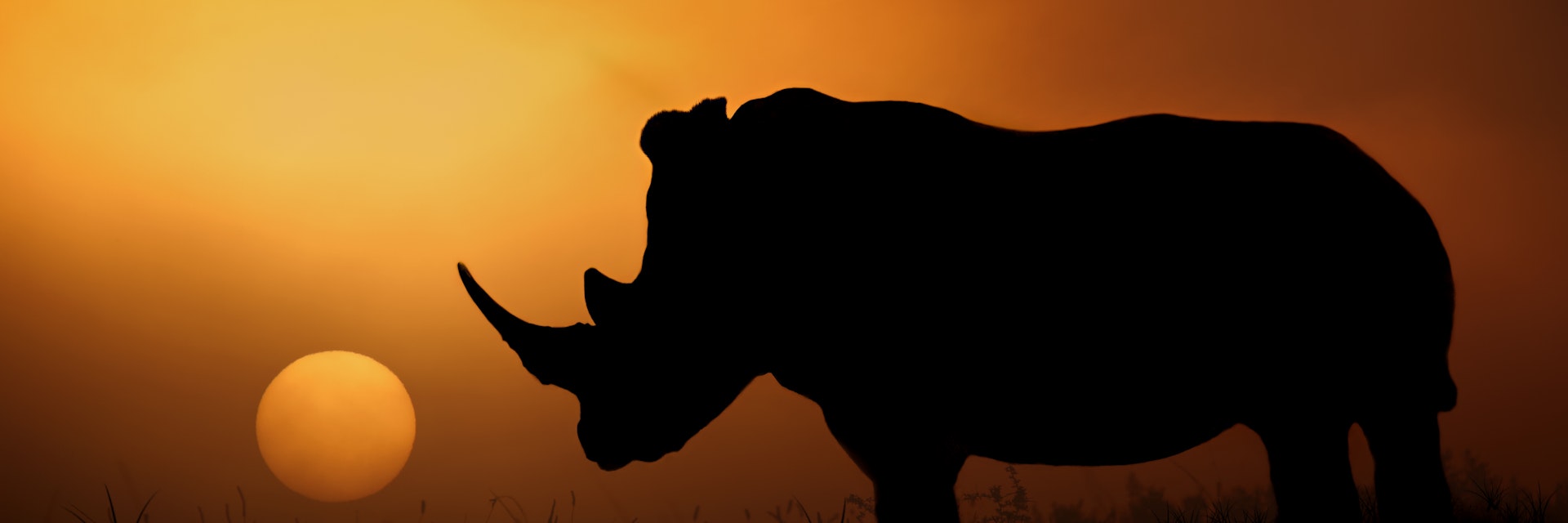
Kruger National Park
Kruger is one of the world's greatest wildlife-watching destinations. All of Africa's iconic safari species – elephant, lion, leopard, cheetah, rhino, buffalo, giraffe, hippo and zebra – share the bushveld with a supporting cast of 137 other mammals and over 500 varieties of bird.
Leave the planning to a local expert
Experience the real Kruger National Park. Let a local expert handle the planning for you.
Attractions
Must-see attractions.

Elephant Hall Museum
Even if you're not staying at Letaba Rest Camp, it's worth swinging by to check out this excellent museum. It has life-size skeletons and dozens of…
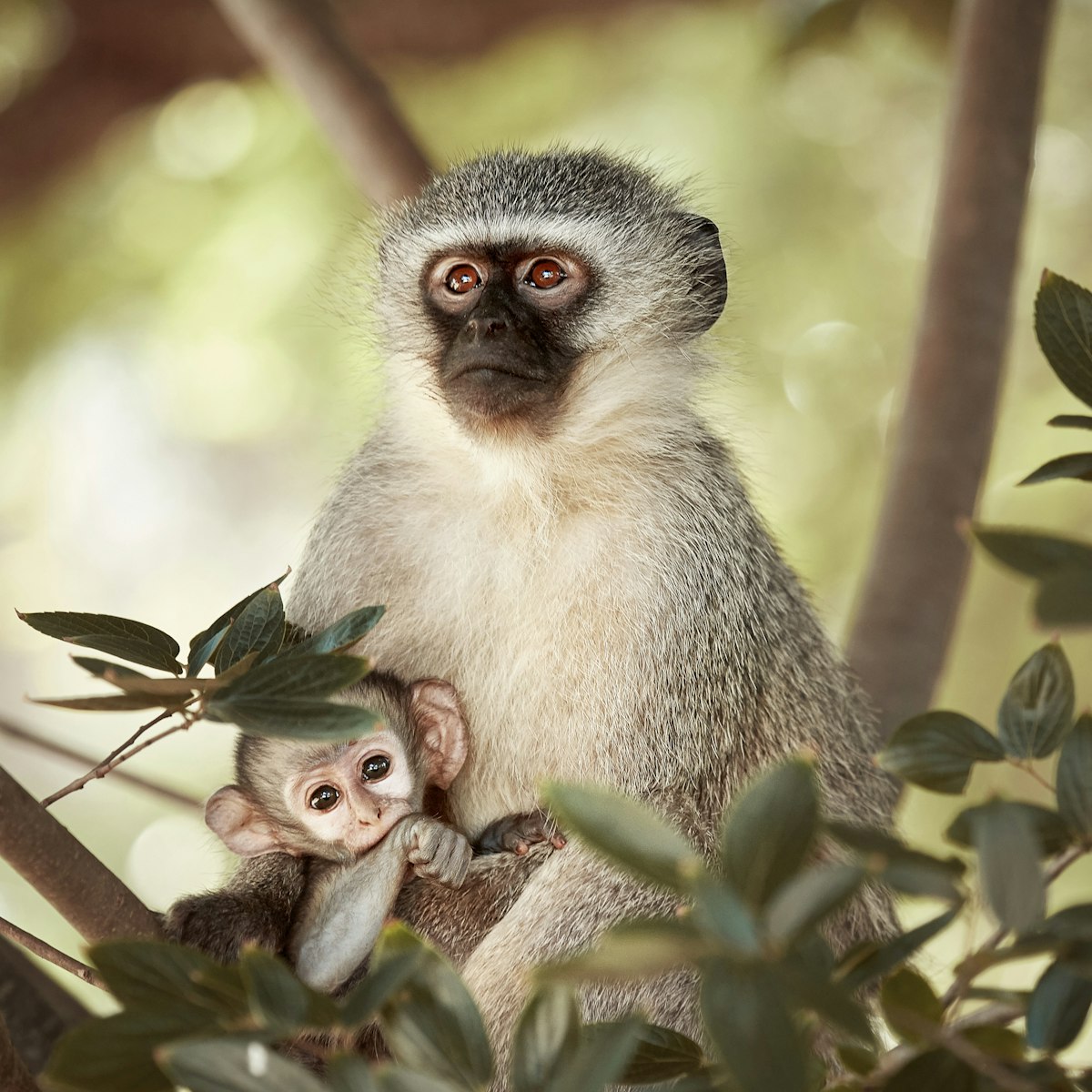
Sabi Sand Game Reserve
Within the borders of the large Sabi Sand Game Reserve are some of Southern Africa’s most luxurious safari lodges and the best wildlife watching on the…
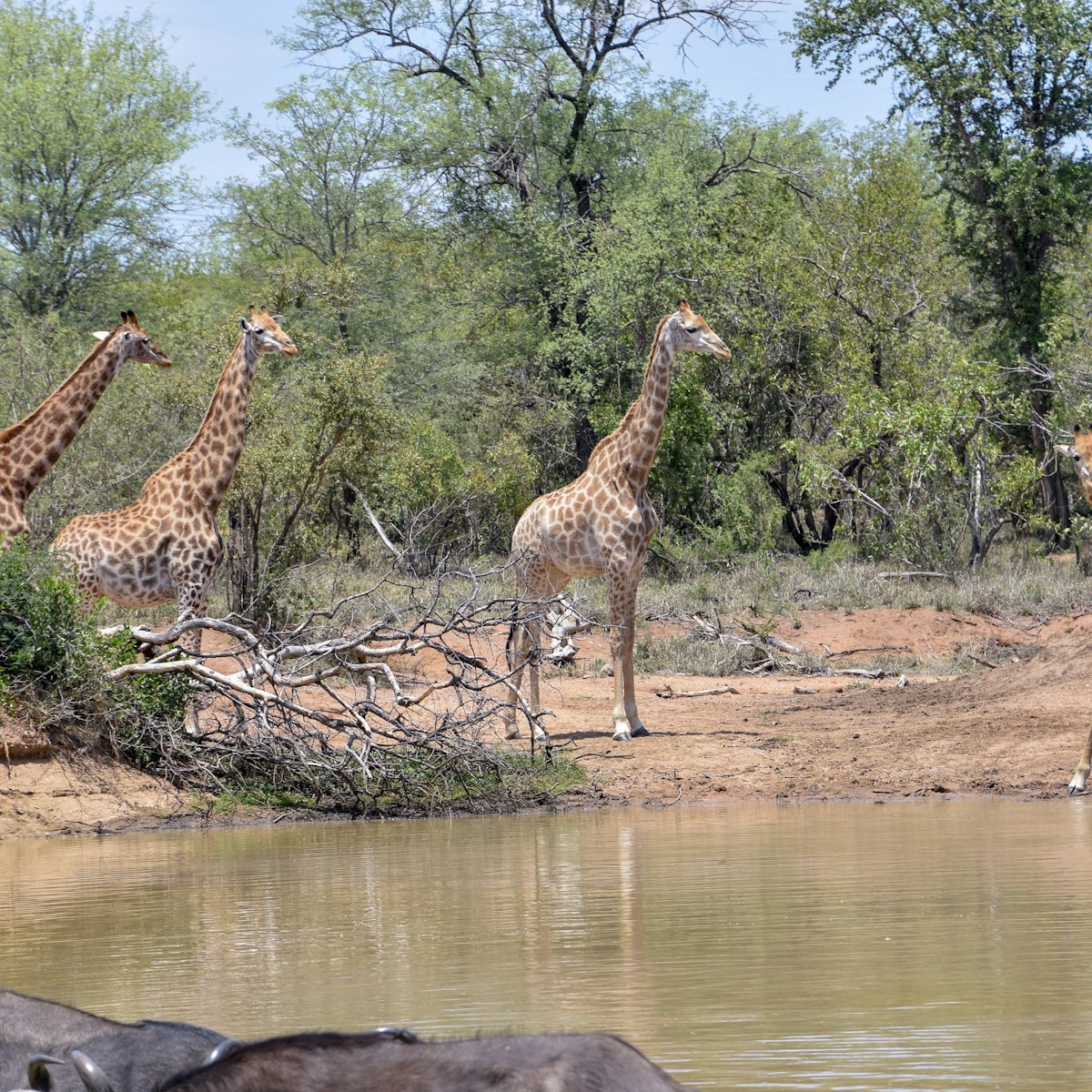
Kapama Private Game Reserve
With four luxury lodges and the Big Five in residence (as well as occasional passing wild dogs and great birding), 13,000-hectare Kapama gets all of the…
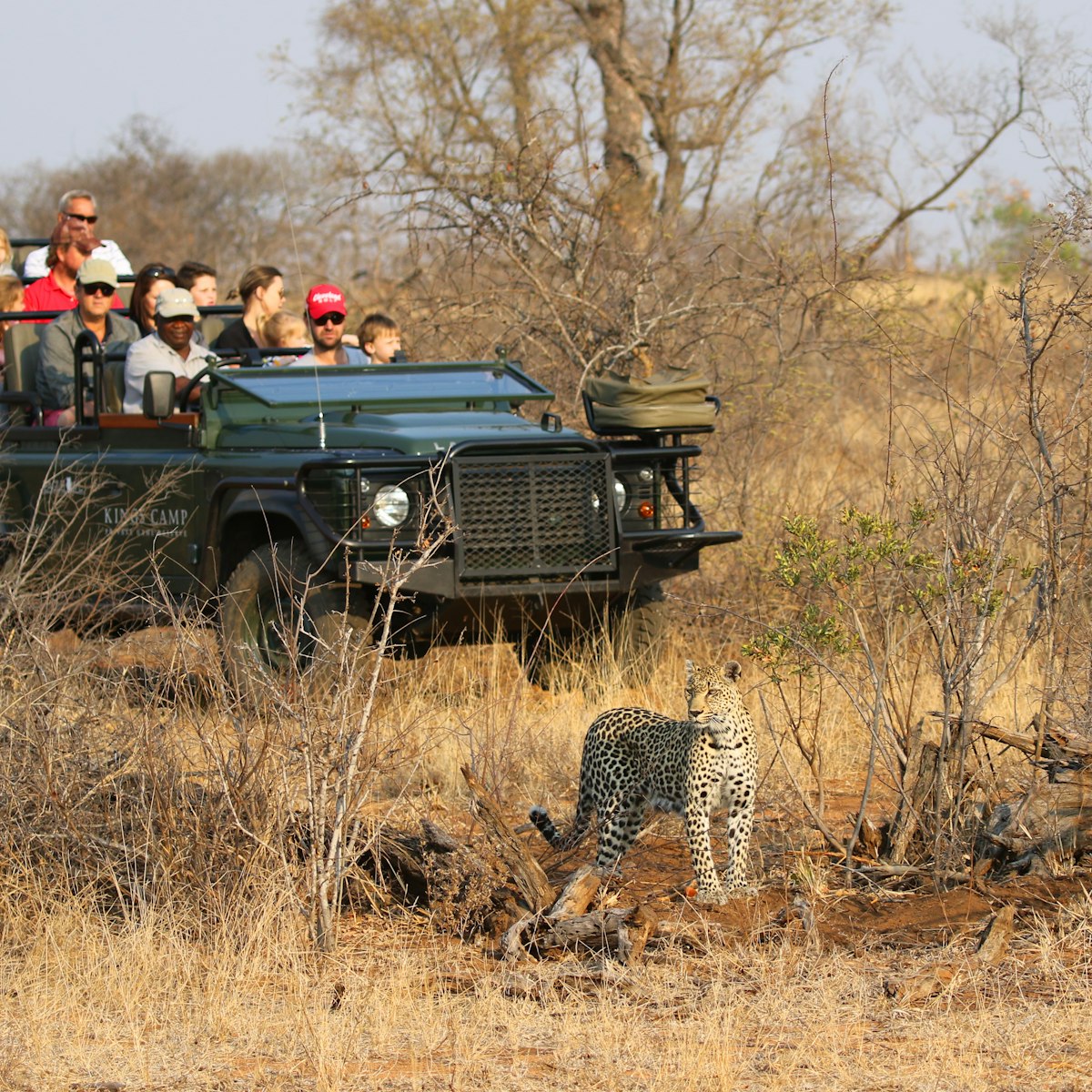
Timbavati Private Nature Reserve
Timbavati abuts Kruger National Park's western boundary and has an excellent mix of wildlife, conservation and good accommodation. Its accommodation…
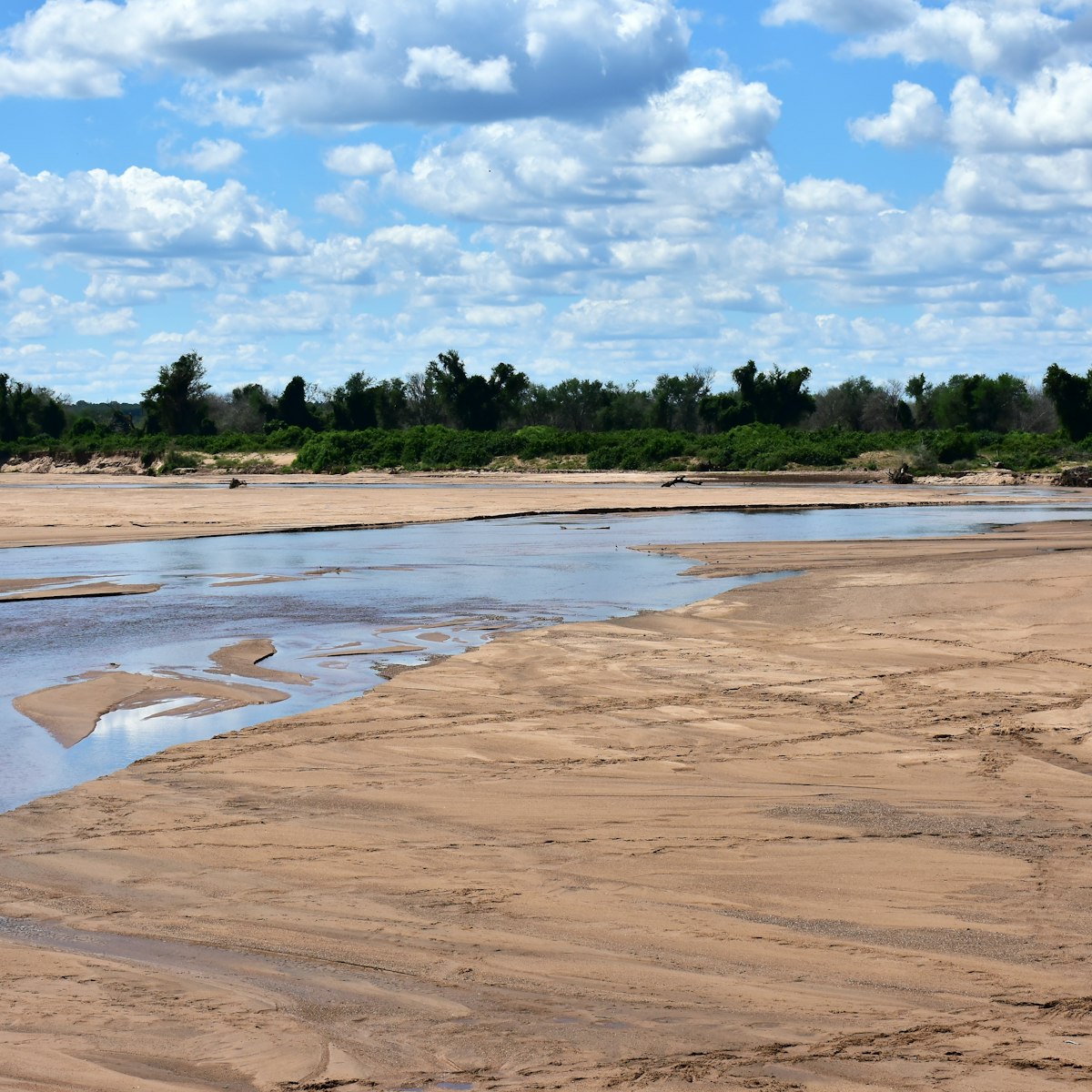
Crooks Corner
On the outskirts of a beautiful fever-tree forest, Crooks Corner marks not only the confluence of the Luvuvhu and Limpopo Rivers but also the historic…

Bobbejaankrans
This overlooks a section of the Timbavati River that animals often visit to slake their thirst. It's especially good early morning or late afternoon.

Renosterpan
This waterhole north of Berg-en-dal usually lives up to its name (renoster is rhino in Afrikaans). Late afternoon is best.

Klaserie Private Nature Reserve
A 600-sq-km (or 60,000 hectare) private wildlife reserve in the greater Kruger area, Klaserie has strong conservation credentials.
Plan with a local
Experience the real South Africa
Let a local expert craft your dream trip.
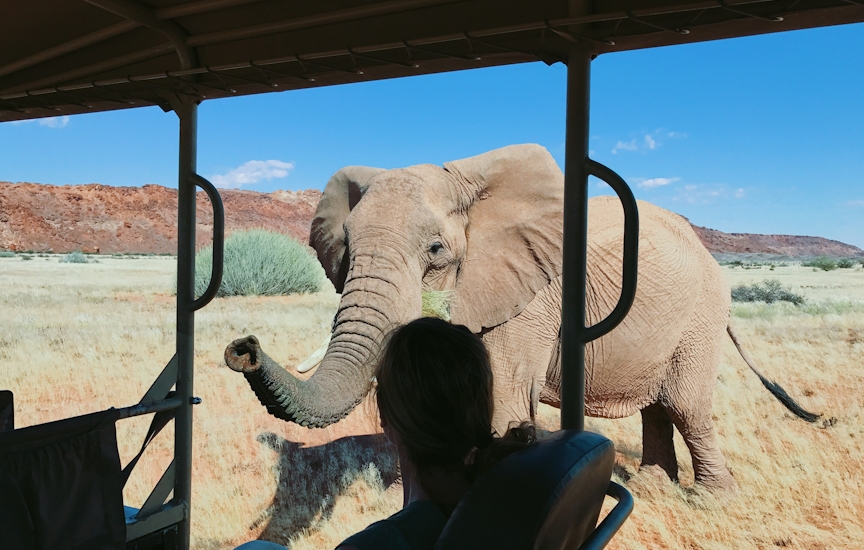
Latest stories from Kruger National Park
Filter by interest:
- All Interests
- Adventure Travel
- Art & Culture
- Beaches, Coasts & Islands
- Food & Drink
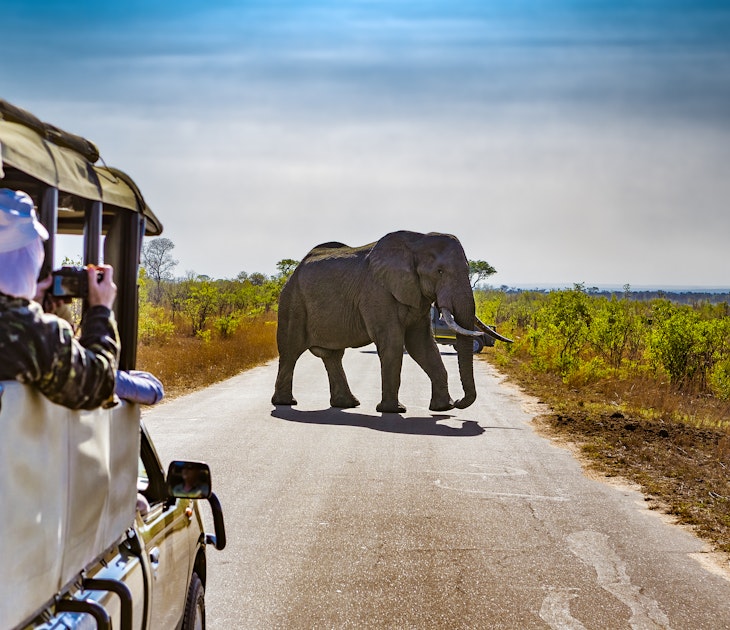
National Parks
Jan 5, 2022 • 8 min read
Preserving mountains, grasslands, beaches and deserts, South Africa's national parks are natural wonders. Here's a guide to South Africa's best reserves.
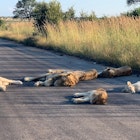
Apr 21, 2020 • 2 min read
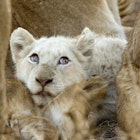
Sep 30, 2019 • 6 min read
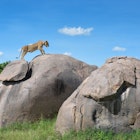
Jul 3, 2019 • 6 min read
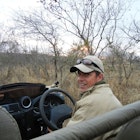
Jan 31, 2012 • 5 min read
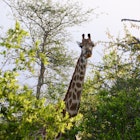
Jun 18, 2010 • 2 min read
Purchase our award-winning guidebooks
Get to the heart of Kruger National Park with one of our in-depth, award-winning guidebooks, covering maps, itineraries, and expert guidance.
Username or E-Mail
Forget Password?
Do not have an account?
Already a member.
- Umbhaba Specials
3 Day Best of Kruger Safari
- Umbhaba Accommodation
- 4 Day Kruger and Panorama Safari
- 5 Day Kruger and Panorama Safari
- Kruger and Panorama
- Group Open Vehicle Safaris
- Morning Safaris
- Afternoon Safaris
Full Day Safari
- Full Day Panorama Tour
- Full Day Cape Winelands Tour
- Full Day Cape Canopy Tour
- Full Day Walk to Freedom Tour
- Full Day Cape Point & Peninsula Tour
3 Day Best of Kruger Private Safari
- 4 Day Kruger and Panorama Private Safari
- 5 Day Kruger and Panorama Private Safari
- Private Vehicle Full Day Safaris
- Private Vehicle Morning Safaris
- Private Vehicle Afternoon Safaris
- General FAQ’s
- Accommodation Kruger Park
- Image Gallery
- Video Gallery
- Our Open Vehicle
- Kruger National Park News
- Kruger Park Mammal Guide
- Kruger Park Bird Guide
- History of the Kruger Park
- Half Day Soweto Tour
- Full Day Soweto Bicycle Tour

Book the Best 3, 4 or 5 Day Kruger Park Safaris and Tours
“Kurt Safari is the # 1 Rated Kruger National Park Safari Company on Tripadvisor. We specialise in 3, 4 and 5 Day Kruger Park Safari Packages , as well as Day Safaris and Tailor-Made Kruger Safari Trips .

Safaris Depart Johannesburg Every Monday – Wednesday – Saturday
4 Day Best of Kruger Safari
4 day kruger & panorama safari, 5 day kruger & panorama safari.

Private Safaris Depart Daily
Private Full Day Safari
Private morning safari, private afternoon safari.

4 Day Kruger & Panorama Private Safari
5 day kruger & panorama private safari.

3 Day Best of Kruger Budget Safari
4 day best of kruger budget safari, 4 day kruger & panorama budget safari, 5 day kruger & panorama budget safari.

Tailor Made Guided Safaris

Morning Safari
Afternoon safari.

2 Nights Umbhaba Eco Lodge Self-Drive Safari
3 nights umbhaba eco lodge self-drive safari.

Namibia Tours & Safaris
Garden route tours, cape town / johannesburg day tours, trip advisor reviews, for the last 20 years, kurt safari’s experienced kruger guides have been driving both local and international travellers through some of the most exquisite and wildlife-filled areas of the world-famous kruger national park..
Today, we are a highly ranked, and much recommended, TripAdvisor Kruger National Park safari company. We have curated an exclusive array of safaris, activities, and tours that promise to give you a wildlife encounter that is nothing less than absolutely extraordinary. We offer some of the very best 3, 4 and 5 Day Kruger Park Safari Packages, as well as an array of Day Safari options.
A place of untouched African landscapes, the Kruger National Park is a true haven for those seeking adventure in a place that is home to a rich and diverse wildlife and plantlife. It’s a place made for the more adventurous spirit. Have a look at our comprehensive selection of Kruger National Park packages and discover the magic within each expedition.
Our Kruger Park Safaris Depart from Johannesburg Every Monday, Wednesday and Saturday
OUR OFFICE IS THE ROADS, CAMPS AND ATTRACTIONS OF THE MAJESTIC KRUGER NATIONAL PARK. AND OUR PASSION FOR THIS EXCEPTIONAL PLACE HAS MADE KURT SAFARI SOUTH AFRICA’S MOST ESTEEMED KRUGER NATIONAL PARK SAFARIS TOUR OPERATOR
We have a selection of the very best Kruger National Park Safaris travel packages, each of which have been created for clients who are looking for that real African Safari experience, where a rustic adventure meets first world comfort. Every aspect of our Kruger Park safaris and tours are tailor made to suit a variety of budgets, experiences, and tastes.
Our Kruger National Park safaris include a range of affordable trips, created just for those travelling on a limited budget, and we also have a selection of Kruger Park tours designed for holiday makers wanting a luxury African vacation. Not only do our guests get to explore the best of the Kruger National Park , spending their days slowly driving along some of the most famous roads, those well-known for their wildlife population’s, but they also have the option to explore some of the region’s most interesting and beautiful attractions.
In the company of a trained and passionate guides, our guests spend up to 9 hours a day in the Kruger National Park . This is more time than most other companies allow for, and this means our guests have a better chance of seeing the Big 5 and more. We make use of the most comfortable, open-air safari vehicles, giving guests a real bird’s eye view of the wildlife we encounter.
Most of our Kruger Park safaris and tours are conducted in areas of the Southern Kruger, where wildlife populations are abundant. This part of the park is home to the Big 5 – Lion, Elephant, Buffalo, Leopard and Rhino – herds of rambling zebras and wildebeest, and more birds than you could imagine. The Kruger National Park has over 148 mammal species, and many of which can be seen in the Southern regions of the park.
Kurt Safari offers one of the widest varieties of Kruger National Park Safari Packages, from exciting 3, 4, and 5 Day Packages to an epic 8 day Photographic and Birding safaris. Each tour is conducted with professional guides, who are both passionate about the park and knowledgeable about its inhabitants.
To book any of our Kruger Park safaris , you can browse through our website and find the one most suitable for your needs, your expectations and your budget. You can then book directly via our website, pay online and start preparing for your trip. Alternatively, you can contact us and have a chat with one of our knowledgeable consultants.
We are based in the sleepy Lowveld town of Hazyview, which is a 15-minute drive away from the Kruger National Park . Our consultants, guides and management team are predominantly locals who’ve spent a lifetime living in the area. They all have tremendous knowledge about the Kruger National Park and its wild inhabitants and can give you the kind of advice that you won’t find online, which you can use to make your holiday simply unforgettable.
Guests who choose an overnight holiday with Kurt Safari, stay at some of Hazyview’s most incredible private lodges. Just a 15 minute drive from the park, the lodges we use are chosen for their comfort and their high standard of excellence and friendly hospitality. The lodges we choose have Wi-Fi and the booking includes breakfast and dinner. We are also able to block book accommodation.
Kurt Schultz, the Director of Kurt Safari personally guided Kruger Park safaris for almost 12 years before creating his safari company. Today, the company is rated as one of the leading Kruger Safari operators on TripAdvisor, and all of our packages have been personally curated, after many years of trial, error, and trips in the park. We believe that the Kruger Park safari should be simple but wild, with a focus on quality guiding and safety. We also believe that what can make a market truly special is the added benefits such as secluded but comfortable accommodation, indulgent meals, and the opportunity to have a memorable experience, even if you are travelling on a budget.
We very much look forward to welcoming you to one of our our favourite places, the Kruger National Park. We hope that you truly enjoy your Kruger Park safari with us.
Read our Complete Guide to the Kruger National Park here
Welcome to kurt safari. here you will find a selection of well-priced kruger park safaris as well as travel information., your adventure begins here.
Kurt Safari Co is one of the Kruger’s leading tour operators, with over 20 years spent welcoming guests from all over the world to experience the ultimate Kruger Park safari.
We have a diverse selection of fantastic Kruger safaris for our clients to choose from. Each safari is carried out in an open safari vehicle and in the company of one of our professional guides, each of whom has years of experience guiding tours through the Kruger. Our safari packages are designed in such a way that you are guaranteed to have a truly unforgettable time in our beautiful country. We know that for many of our guests, a visit to the park is a once in a lifetime adventure and so we try to ensure that our Kruger Park safaris are as entrancing, captivating and as memorable as possible. Our tailor-made safaris as well as our standard safari packages, offer something for everyone. Whether you are looking to spend a single day, 3 days, 4 days or even 5 days in the Kruger, we have the tour for you. We also have shared safaris and private Kruger Park safaris, as well as packages for guests wanting to see the Panorama Route and the Kruger National Park.
Our guests stay in the exclusive Umbhaba Eco Lodge, where they can look forward to a world class experience in their air conditioned en-suite room. Should there be no availability at Umbhaba Eco Lodge during their trip, guests will stay at the equally stunning Sanibonani Lodge in Hazyview.
The Kurt Safari Kruger Experience
A Kurt safari is a laidback experience and our itineraries, as well as all that is included in each tour, will ensure that you are well taken care of and in the best company.
Our guided tours are well priced and well organised and accommodation is included with each overnight package.
We specialise in small guided group Kruger Park safaris and with our daily departures from Johannesburg to Hazyview, you can arrive in the city in the morning and be enjoying the Kruger in the afternoon! Our Kruger safaris are ideal for both locals and international visitors.
Each safari vehicle is open, giving you ample visibility, allowing you to easily spot animals through the wild vegetation. This visibility makes each safari perfect for budding and experienced photographers looking to capture those one of a kind snaps. If you are in search of a more photographic focused safari, please have a look at our custom photographic safaris.
The Kruger National Park is without a doubt the best place in South Africa to spot the Big 5. The Kruger is home to the Lion, Leopard, Elephant, Rhino, and Cape Buffalo and a day trip to the park can offer enough time to spot these animals and many more. Keep in mind that when visiting the Kruger, you never know what is waiting around the next twist and turn in the road! The Kruger boasts a massively diverse number of wildlife and bird species.
Although we have a wide range of Kruger Park safaris and exciting game drives for our guests to choose from, we are also more than happy to customise a package to fulfil all of your wildest safari daydreams! We always go the extra mile for our guests as we know how truly amazing and memorable a real African safari should be. We are SATSA accredited, which is our guarantee to you that the safari you are paying for will live up to all of your expectations. You can look forward to a safe, well-priced, one of a kind safari. Each of our safaris will meet your expectations for that African experience you seek.
You can view the pricing of our bestselling Kruger Park safaris on our website.
Should you have any questions about our tours kindly get in touch with our helpful Hazyview based team. You can also check out TripAdvisor to see all of our latest reviews.
We look forward to welcoming you to the African continent. You can make your safari booking via our website or by getting in touch with us via email.
Kruger park safaris: must know info.
The majestic Kruger National Park is one of South Africa’s best loved iconic landmarks. Each year the conservation reserve welcomes thousands of guests from all over the world. Embarking on one of the many Kruger Park trips available, or taking a self-drive through the park , is the way that most guests are introduced to the quiet solitude that you will only find when out in the wild. But it is not the quietness that brings guests to the park. It’s the animals.
Booking a Kruger Park safari or a Kruger Day Tour has also never been so easy. A quick look online will present you with a huge number of options, most of which are from top-notch safari companies, such as ours. Why book a safari instead of doing a self-drive?
We reap the benefits of the wisdom and foresight of those who came before us. The Kruger Park safari is an experience to be remembered and it’s one that is not as costly as you might think.
The Founding of a Legendary Conservation Park
Paul Kruger , the onetime president of the now-defunct Transvaal Republic, made it his mission to have an area of the Transvaal set aside for the conservation of animals. Without his efforts, the animals that we now see roaming the park would have long been erased from the land. Back in 1898, when the park was first founded, hunting was rife and trophies of big game, such as lions and elephants were much sought after by overseas visitors.
To prevent the local animal life from becoming completely eradicated, the park became a no-hunting zone and to this day remains one of the oldest and biggest areas of conserved land in the world.
The Kruger National Park might have been proclaimed in 1898 , but it was only in 1927 that it was named the Kruger National Park and opened to tourists. Those early days were interesting, to say the least, with tourists literally flying through the park on a train. Not a lot could be easily seen, and the route was one that could not be changed. But this was the safest way for the earliest visitors to see the park. These were the days before the can.
By 1928, the Kruger Park was being steadily run by a board of directors and it was decided that in order to make the park more accessible, overnight accommodation needed to be built. The park’s first rondavels, a round hut style of accommodation that is as synonymous with the park as the Big 5, were built at Skukuza, Pretoriuskop and Satara. As more guests visited the park, more accommodation was added for their benefit while the former accommodation used for rangers was also converted into unique accommodation for guests.
Fees were never exorbitant and so the park became known as the People’s Park; a place where anyone could experience all that the conservation effort had to offer.
If you have done your research about South Africa, and the Kruger Park in particular, you will know that the summers are exceptionally hot and humid. So you can sympathise with the park’s earliest overnight guests and their struggle to stay cool.
In fact, staying over in the park, in one of the rondavels, was not a popular choice. Sure it was a novelty, but the heat was as unbearable as the mosquitoes, which could not be kept out. These days, rondavels have fans and some even have air-conditioning.
Kruger Park Flora and Fauna
While animals are what draws people to the park, the flora of the area is just as captivating as the fauna. The plants and trees of the Kruger are really diverse, and different flora can be seen in different areas of the park. The Kruger is divided into 4 distinct areas, each distinguishable based on the flora of the area.
Thorn trees and red bushwillow veld
In the west and more or less centre of the park, just south of the Olifants River, lies the red bushwillow trees as well as acacia (thorn) trees. The area also boasts plenty of marula trees. The acacia trees line the rivers and streams. Along with the Nwatimhiri Bush, the areas along the Sabie River are very dense with vegetation.
Knob thorn and marula veld
In the area south of the Olifants River, and to the east of the park, lies knob thorn and marula veld. This region provides plenty of grazing ground. Red grass and buffalo grass, as well as the knob thorn and marula trees, make this an important region of the park.
Red bushwillow and mopane veld
North of the Olifants River and to the west of the park, the red bushwillow trees and mopane trees mostly make up the vegetation.
Shrub mopane veld
Almost the entire northeastern area of the park is covered with mopane trees.
While these areas have more plants and trees than mentioned above, it is the abundance of these trees and bushes that contribute to the naming of the areas. Each region is exceptionally important for the survival of fauna.
Famous Fauna and the Effort to Conserve
The park is famously home to the Big 5, which consists of the lion, leopard, elephant, rhino and buffalo.
These iconic animals are part of the allure of visiting the Kruger, but they are not the only incredible animals to have a home here.
In fact, there are more species in the Kruger than in any other park on the African continent!
Overall, there are 147 species of animals in the park. Along with numerous predators and large species such as elephants, the park also has a host of antelope such as kudu, impala, nyala, and eland. The Kruger National Park is also home to various endangered as well as rare species, such as the wild dog.
Anti-Poaching Efforts
As the park has many endangered species, efforts to prevent poaching have been underway for many years. Anti-poaching units are equipped with the latest in prevention equipment such as night vision technology and advanced telescopes. Game rangers, the police and the army have been actively involved in the effort to stop poaching and while instances have been reduced, animals are under constant threat.
While elephants are occasionally hunted, it is the savage slaying of our precious rhinos that makes the headlines. Poachers sneak into the Kruger, often when the moon is full, and hunt rhinos for their horns. The horn is worth around $ 66 000 per kilogram and although there is a ban on the trade of the horn in most countries, the ban sadly has little effect.
Those who go on a Kruger Park safari drive are incredibly lucky to see a rhino.
Must Know Kruger National Park Rules
In the beginning, the rules for guests visiting the park were very relaxed and not widely enforced.
But as time has gone by, more rules have been added to the sheet given to guests upon entry. All of the rules are simple to understand and very easy to follow. If this is your first time going to the park, here’s what you need to know:
- Guests are only allowed to drive in the park from sunrise to sunset. Before the evening comes, guests need to be out of the park or they need to be at the rest camp they are booked into. An exception is made when guests embark on a Kruger Park night drive but guests are not allowed to self-drive after dark, so you’ll need to make arrangements and bookings for such an experience.
- Another important rule and one that applies greatly if you are going to be doing a self-drive through the Kruger is the speed limit. There is a strict speed limit in the park ; 50 km on tar roads and 40 km on gravel (dirt) roads.
- It goes without saying, but indeed sometimes needs to be said, that guests are not allowed to leave the safety of their vehicles . There are also those rare cases of guests wanting to touch the animals, which is also forbidden. One of the major park rules is that people must remain in their vehicles.
- Feeding or disturbing the animals is also very much against the rules . Littering goes in this category and it is also forbidden. Because all of the animals are wild, feeding them can do more harm than good. Animals also often mistake litter for feed and end up eating the litter and becoming ill or dying.
- If you will be doing more than a Kruger Park day tour, then there are other rules that you will have to adhere to. Being booked into your camp before 14:00 pm and leaving by 10:00 am the following day is a must.
- Another thing to take into consideration is the noise rule . Camps are generally quiet places. What keeps them quiet is the rule that states that guests must limit noise between the hours of 21:30 pm and 6:30 am. Cell phones are permitted in the camps, but minimal use is encouraged.
- Only safari vehicles and private vehicles are granted access to the parks . Motorbikes are not allowed and roller-skates and skateboards are not permitted.
- All of the rules and regulations are enforced by legislation (the National Environmental Management: Protected Areas Act of 2003). This means you can be charged or fined for breaking the rules. The rules and regulations are there for the safety of the guests while they can also make the trip more relaxed and enjoyable.
Reputable safari companies always adhere to the rules of the park.
The kruger’s 12 main camps.
There is a laundry list of reasons why you should visit the Kruger National Park.
And one of those reasons is the history and the hospitality you will find in every camp. If anything, the park is one really laid-back place to be. Even the busy main camps, of which there are 12, are in their own bubble, away from the modern world.
Berg-n-Dal is one of the few camps in the park set in a mountainous area and the natural environment and habitat have been well preserved within the camp. The camp has dry riverbeds on the southern and northern borders, along with very large trees. Some of the animals to see near the camp include the wild dog, the klipspringer, and the leopard. If you are staying over in the park, then you’ll be happy to know that there are a number of facilities available along with great accommodation.
Berg-en-Dal is one of the Kruger’s newest camps. The beautiful rocky region in which it has been built often makes it the perfect place to see cats while the camp also has an indigenous rock garden that guests can explore. The camp was originally built in 1984 but just before the camp was opened, it just about completely burned to the ground. Officials scrambled to get the facilities rebuilt, and somehow managed to get everything done in time for the opening.
The camp has been built on top of a prehistoric settlement and the area around the camp is filled with all kinds of examples of ancient life and it has a Bushman Trail which allows guests to view San Bushmen rock art. The bush walk is about 20 minutes and guests will see various ecological and geological sites when viewing the paintings.
There are a few archaeological sites close to the camp and pot shards and bone fragments have been unearthed here. Some of the latest evidence shows that those who lived in the area were from the Iron Age.
The camp is in the southern Kruger, a region of the park that is well-known for its abundant wildlife. The camp has all kinds of accommodation including camping, cottages, guesthouses and bungalows. It also has a big swimming pool, an internet cafe, a conference centre, and picnic areas for day tourists. Not many guided Kruger Park safaris stop here, but those that do enjoy a quieter setting than compared to Skukuza. The Kruger National Park accommodation at Berg-en-Dal is rustic but comfortable and affordable.
Crocodile Bridge
One of the smaller camps in the Kruger National Park, Crocodile Bridge gets its name from the Crocodile River, which flows close to the camp. Game viewing is excellent when you drive the Southern Circle which is near to the camp. In this area, lions are often spotted. Other animals known to prowl the area include kudus, giraffes, spotted hyenas and cheetahs. This camp has been time and again nominated as the best camp in the park.
Situated at the halfway point of the park, a perfect fit between north and south, is Letaba. The name means River of Sand and it is one of the best-known places to spot elephant. While a lot of areas in this sector of the park are already turning into grassland, Letaba is green and lush. And the night erupts with life. When you stay at Letaba, bats, owls, nightjars, frogs and cicadas keep the night alive. But there is more than the nightlife to keep you entertained. The areas surrounding Letaba are known for sightings of elephants and bushbuck.
Lower Sabie
Lower Sabie is situated along the banks of the Sabie River. The camp’s location gives it a laid back, calm atmosphere that guests can really unwind in. The camp is well known for having numerous, massive trees which makes it the ideal place to see leopards. Other animals you can see in the area includes hippo and lion, along with all of the usual antelope. A large number of other animals also visit the river to have a drink of water. At Lower Sabie, you will also have access to fantastic accommodation.
This is one of the camps in the park that is home to plenty of Mopani trees. But the most significant feature of the camp is the massive baobab tree that sits in the centre of the camp. Most of the camp’s vegetation is left to grow naturally. Some of the animals that you can spot in the area include hippo, waterbuck and tsessebe. The camp is on the border of the Pioneer Dam, so seeing animals late in the afternoon and early morning coming for a drink of water is the norm.
Olifants is well-known for the amazing views that it has on offer. The camp is situated high up on a hill, above the Olifants River. The camp is surrounded by viewing platforms, which offer a great way to spot the wildlife roaming near the water below. Some of the animals you can see here include crocodile, lion, elephant and hippo. Along with great accommodation, there is also a great picnic spot for day visitors.
With two satellite camps, Maroela and Tamboti, Orpen is well situated. The camp got its name from the Eileen Orpen who was owner of the land which was donated to the park and became the place where Orpen now is. This grassy area is a great place to spot grazing animals, while the wide open surrounding plans are home to many prides of lions. By night, the air is filled with the sounds of roaring lions, something that you will never forget. Orpen is well known for having a diverse array of wildlife, and some of the animals you will come across include rhino, buffalo, elephant, leopard and lion which make up the Big 5. Other animals include wildebeest and jackals.
Pretoriuskop
Pretoriuskop is a camp nestled between millions of years old outcrops of granite rocks. There are a number of interesting granite boulders in this south-western based camp. But the real attraction here is, of course, wildlife. Pretoriuskop is one of the park’s oldest camps and evidence of its age can be seen in the layout and style of the camp. The animals that are often spotted here include the Sable antelope, Lichtenstein’s Hartebeest, wild dog and kudu. Many people like to stay at this camp because it is quite close to one of the entry points to the park.
Punda Maria
Only those willing to brave the heat are brave enough to stay at Punda Maria during the intense summer months. And even in the midst of winter, this camp can get hot. Punda Maria is found in the north-most part of the park and because of the sandveld habitat, it is home to a number of interesting plants. Punda Maria is often called the botanical garden of the park. When travelling in this region you might come across nyala, wild dog and plenty of zebra herds. The drive is a long one when you are heading north. Often only those who will be spending more than a few days in the park will attempt a stay here.
Some of the first rondavels were built at Satara after more and more guests became interested in spending a night in the park. Today, Satara is a very busy camp and one known for its excellent game viewing opportunities. Satara is in a wooded area and the camp itself is considered to be rustic. If you are an avid bird watcher, this is definitely the place to go. And along with the birds you can see here, there is also a variety of animals such as lion, giraffe, wildebeest and the honey badger.
Another camp located in the northern region of the park, Shingwedzi is known for its wildlife sightings, such as nyala, waterbuck and elephant. To get to the camp, you will need to take the scenic route along the Shingwedzi River. This camp is also one that is considered to still be rustic, with a lot of the conveniences of modern living not found here, a factor that makes staying here a real break away. If it is tranquillity that you are seeking, you’ll find it here. Along with tranquillity, you will also find some interesting birds such as the Giant Eagle Owl and the Green Pigeon.
Of the plants that you can see here, there is Natal Mahogany, mopane scrub, brack thorn, sausage trees, and mustard trees. There is also a lot of bird life in the area.
As a northern camp, Shingwedzi is worlds away from the wet and humid sub-tropical southern areas of the park. Here the vegetation is sparser, which makes seeing wildlife a little easier. The further north you travel, the terrain changes from mountains and hills, to wide open plains and you can imagine cheetahs darting over the grassland. Shingwedzi is not on the day Kruger Park safari destination list because it is further away than most camps, but it is the ideal place to spend a holiday if you are looking for tranquillity.
Shingwedzi is famous for being home to some of the biggest elephants the park has ever seen. The Magnificent Seven once roamed the areas around the camp, and they became famous for having the biggest tusks ever recorded for elephants in the Kruger. An artist who learned of the elephants searched the area to find them and immortalise them in his artwork. Once the art became public, and more people learned about the elephants, guests from all over the world came to see them. The great tuskers lived in the area during the 1070s and 1980s, when the last of the tuskers died. The park has not seen the likes of these elephants again, and today, their tusks can be seen in various camps. The Shingwedzi River runs close to the camp, and it is one of the best places in the area to spot all kinds of wildlife. When the river comes down in flood, even more animals can be seen. Beyond the river lies an old alluvial plain which has a few trees and little vegetation.
Shingwedzi camp is a modern one with a touch of that rustic appeal that the Kruger has become so well known for. The camp has a restaurant and café, a swimming pool, a shop, a petrol station and a picnic area. For those who want to stay over in the camp, they are really spoiled for choice when it comes to their accommodation options. Shingwedzi has camping spots, huts, bungalows, and more luxury accommodation such as guest cottages and houses. The fixed Kruger National Park accommodation is kitted out beautifully and has fans and/or air conditioning for those intense northern Kruger summers. The camp is laid out perfectly for those wanting privacy while staying in the park and during the day, their Kruger National Park safaris offer unforgettable sightseeing.
Leaving the best for last, we have Skukuza. This camp is the capital of the park and when you are on a Kruger Park safari, this is the camp where you are sure to be stopping off for lunch. The camp is situated along the southern banks of the Sabie River and there are plenty of lookout points here. Guests stopping off for lunch can do so outside in a seating area as well as on benches that look out on the river. The camp is nice and shady, the perfect place to catch your breath, cool off and eat a snack. A few of the animals often spotted in the area include spotted hyena, bush baby and warthog.
Some wildlife comes into the camp, and day visitors enjoying a Kruger Park safari can get really up close to the wildlife. Monkeys and warthogs can be found roaming the camp in search of left over picnic snacks. Guests should be warned, however, as the monkeys can get very brazen and end up stealing food from your table or even your hand. Skukuza means “He who sweeps clean”, and it is named in honour of one of the camp’s most famous and beloved wardens, James Stevenson-Hamilton. The camp was originally called Sabie Bridge Camp, but upon the 30th anniversary of James Stevenson-Hamilton working in the park, it was renamed.
Serving as the camp’s administrative headquarters while also being the one place where all day visitors converge, Skukuza has a long and important history. As the “Capital City” of the Kruger National Park, all of the day to day administration and management of the park is done here. Well away from the prying eyes of the tourists, the park’s officials work around the clock to ensure that the park is running smoothly. Those who live and work in the park have made their homes in the quiet Skukuza Village, where there is also a school, a few shops and a weather station.
As far as Kruger National Park accommodation goes, there are all kinds of options to choose from. Camping and rondavels remain the most common and the most popular style of accommodation, although the camp does have more luxurious lodgings. There are plenty of things to do in the camp, for both day visitors and those staying over. The most luxury lodgings is the Kruger Shalati Train, which is to be built on the Sabie Bridge in 2019. The camp has a refreshing swimming pool, a golf course, and countless memorials and museums. Be sure to take a look at the dog memorial, which pays homage to the hounds that helped shape the park. You should also see the oldest hut in the Kruger, which is now a museum.
The camp has all kinds of modern conveniences, such as shops, ATMs, a classy restaurant, a café and ablution facilities. Guests staying over can look forward to air conditioned accommodation.
One of the best ways to spend your time in Skukuza, when you are on a day Kruger National Park safari is to set up a picnic while overlooking the Sabie River. You never quite know what you’ll see when you are in the camp.
Most Kruger National Park safaris will end up at Skukuza at some point in the day. We, for instance, enter the camp at around 10 am to give our guests some time to stretch their legs and grab a bite to eat.
In addition to these main camps, there are also a number of satellite camps, bushveld camps, overnight hides, bush lodges, luxury lodges and campsites.
Select your kruger park safari.
The biggest decision you need to make when planning a trip to the Kruger National Park is deciding what type of safari experience you would like to have. A quick online search brings up all sorts of safari packages, but the only way to narrow down the search is to know more or less what you want to get out of your Kruger National Park safari. It doesn’t help to book a Kruger Park day safari when what you really want is 10 days in the park.
Generally, the more time you spend in the park, the more animals you will see. The Kruger is home to hundreds of different animal species, including the Big 5. And the different regions of the park have unique habitats, meaning where you go in the park will be a deciding factor for what you see.
Kurt Safari offers guests a variety of safari packages, including 3, 4, and 5 day tours of the Kruger National Park as well as morning, afternoon and full day game drives and night drives.
Full and Half Day Safaris
To save time, and particularly if you are on a budget, opting for either a Kruger Park day tour or a half day tour is one of the easier ways to get a taste of the Kruger. Generally, we encourage visitors to spend more than a day in the park, in order to see everything. But when you are limited on either time or money, choosing a day or half a day in the park, can be a great introduction to this magnificent place.
We have Kruger Park Full Day Safaris, Afternoon Safaris , Morning Safaris and tours that combine the best of the Kruger, with a trip to the picturesque Panorama Route.
Full day private Kruger Park safaris can offer you the best way to see the park, and you have the added benefit of enjoying the sights on your own or in the company of friends and family. We offer private morning and afternoon Kruger Park safaris as well as full day safaris.
The other option is to have a full day Kruger National Park safari. Again, this private Kruger experience will give you just enough time to spot all sorts of animals. And the more time spent in the park, the more animals you are likely to see. A full day safari is also less likely to leave you feeling rushed. Along with taking you to the best places in the park, there is also the added opportunity that comes with being in the company of an experienced tour guide, who is sure to share a few stories of their time in the park.
Visiting the park during the morning or afternoon is often considered to be the best times, as the heat is not intense and the animals are likely to be grazing. During the peak heat times of the day, animals tend to seek out shade, leaving guests with a disappointing drive.
We depart on our safaris in the early morning and later afternoon, when the heat of the day has either not yet arrived or has cooled off, as these remain the best times of the day to see animals. Each of our Kruger Park Safari prices are affordable, and each will take you into the parts of the park best known for wildlife sightings.
Private 3, 4 and 5 day Kruger Park Budget Safaris
Within our selection of safari packages, we have something for every type of traveller, including those travelling as part of a small group. For these guests, we have created the 3, 4 and 5 day Kruger National Park safaris. Our tours are designed to include sophisticated,comfortable accommodation.
- The 3 day Kruger Park safari
This tour includes 3 days and 2 nights. The days are spent on safari, while in the evening you will return to the beautiful Umbhaba Eco Lodge or an equally upmarket nearby lodge should Umbhaba lack capacity. Breakfast and dinner are included as well as your transfers. Along with days spent on safari, this tour package also includes a Kruger Park night drive. With the 3 day Kruger Park safari , you will certainly have plenty to see, especially as we travel to those areas best known for animal sightings.
- The 4 day Kruger Park safari
Much like the 3-day package, your evenings will be spent at either Umbhaba Eco Lodge or a similar nearby lodge. This package includes 4 days and 3 nights in the wild, with your days being spent on safari. The ideal tour package to give you ample time in the park, you are sure to see numerous animals while you are on this safari.
- The 5 day Kruger Park safari
Finally, the last budget safari that we have available is the 5 day Kruger Park safari. While this package is similar to the 3 and 4-day tours, you will have 5 days in the park . And with this extra time, seeing the Big 5 is very much a possibility. You will be accommodated in either Umbhaba Eco Lodge or another nearby lodge.
The 3, 4 and 5 Kruger Park Classic Safaris
If you are looking to have a truly relaxing safari experience, and you are not so tightly constrained by your budget, the 3, 4 or 5 day classic Kruger Park safaris are a must. Stylish accommodation in a 4 star hotel and just the right amount of time spent in the park, when you sign up for one of our classic safaris, you will be in for a treat.
- The 3 day classic Kruger National Park Safari
Heading out early in the morning and late in the afternoon for a real Kruger experience, the 3 day classic safari is as comfortable as it is exciting. Your guide will be taking you to some of the best areas in the park, spending the day on the dusty Kruger roads looking for the Big 5 and all the other interesting park inhabitants. We offer guests transfers from Johannesburg and for the next 3 days you can sit back while we drive you through the Southern regions of the park. Breakfast and dinner are included.
- The 4 day classic Kruger National Park Safari
With 4 days and 3 nights included as a part of this tour package, you will have plenty of time to relax and enjoy your Kruger trip. The day starts early with an exciting Kruger Park tour, while the afternoons are for relaxing until late afternoon, when guests go on another game drive. This tour package also includes a night drive, something that everyone should experience at least once in their lives.
- The 5 day classic Kruger National Park Safari
The more time you spend in the park, the more opportunity you will have to see the Big 5. The 5 day classic Kruger National Park safari is a must for anyone who wants to take their time and have a truly memorable holiday. You will be accommodated in 4 star lodgings and breakfast and dinners are included. Much of this tour package is similar to the 3 and 4 day classic safaris, although you will have extra time in the park.
The 3, 4 and 5 day Kruger National Park Backpackers Safari
Not at all like the classic safari, and quite different to the budget option, the various Kruger National Park Backpackers safaris are designed for those who enjoy an on the move type of holiday.
Regardless of the number of days you want to spend in the park, your accommodation will remain the same, as guests opting for the Kruger National Park Backpackers safari will be lodged at the Bushpackers Campsite and Accommodation. This accommodation includes meals and will give you that touch of rustic living that you might be after when visiting the Kruger. This is more than a backpacker’s safari, it is also ideal for students looking for an adventure!
- The 3 day backpackers Kruger National Park safari
With 3 days spent enjoying a safari , and accommodation provided by the Bushpackers Campsite and Accommodation, guests embarking on this safari package are in for a real treat! Days will start off and end with a Kruger Park safari.And as always, we take guests to the more exciting areas of the park, where animal sightings are frequent.
- The 4 day backpackers Kruger National Park safari
Regardless of the package you select, always keep in mind that the more time you spend in the park, the more chances you have of seeing the animals you really want to see. Some guests have truly seen all they wanted to see in the 4 days that they have been on safari. We take guests to the Southern areas, as these are the most populated regions of the park.
- The 5 day backpackers Kruger National Park safari
You cannot go wrong with any 5 day safari . Giving you more than enough time to see many of the park’s inhabitants, anyone embarking on a 5-day safari is in for a once in a lifetime trip. And when opting for the backpacker’s safari, you won’t be breaking the bank. This safari also includes a tour of the Panorama Route.
The Guided Group Open Vehicle Safaris
Experiencing the Kruger National Park in the comfort of an open safari vehicle remains one of the most popular ways to see the park. Guests are up close to nature, and even though you are in an open safari vehicle, you will still be kept safe. With fresh air blowing in your hair, and the unmistakable sounds of Africa filling up the vehicle, seeing the Kruger in an open vehicle will leave you with memories to last a lifetime. And they are also the perfect vehicle for capturing some incredible photographs.
At Kurt Safari, we offer some of the best priced Kruger National Park safaris. With private Kruger National Park tours and Kruger National Park day tours, guests have a number of different options to choose from when they are planning a visit to the park.
Book your tour today.
Why book a kruger national park safari with us.

Affordable World-Class Safaris
With a range of safari options, which include all of the comforts you can expect as well as conservation fees, you can save money by booking one of our exciting Kruger Park safaris.

SATSA Accredited
As a SATSA accredited company, we are dedicated to and bound by the rules and regulations as set out by the South African Tourism Services Association.

Professional Services
From booking your accommodation, to planning your day trips into the Kruger National Park in the company of one of our tour guides, Kurt Safari will do it all for you.

Constant Support
To ensure that your stay in Africa is the best possible experience, we strive to provide our guests with 24/7 support.

We are passionate Africans
We love every part of the African wilderness that we are privileged enough to call home. Our guides, consultants and management team are all locals and we live close to the Kruger National Park.
Frequently Asked Questions about the Kruger National Park
Is a kruger safari the best african safari.
The Kruger National Park is a truly wonderful and famous tourist destination in South Africa. The animal conservancy is world known for its diverse range of animals, biomes and plant life. The park was founded all the way back in May 1926, by the hard working game warden James Stevenson-Hamilton and the late President Paul Kruger. The Kruger National Park came to be after areas around it and the Sabi Sand Game Reserve merged together to form the Kruger National Park we know today. The Kruger National Park was built with the conservation of animals in the Lowveld in mind.
The Kruger National Park is home to an unbelievable number of animal, plant and bird species. The Kruger National Park hosts some of the largest and fastest animals known in the world. Animals like the African Elephant, Cape Buffalo, White and Black Rhinos and lions are some of the most popular animals in the Park and attract visitors from around the world. The Kruger Park’s location in the Lowveld provide a surprizing amount of different biomes. Each of these different biomes have stunning diversity when it comes to animals and plant life. Guests can find a sandy and dry area that hosts resilient plants, sparser landscape and lesser animals that are adapted to the hot and unique environment, while traveling a distance onwards and encountering a dense savannah bush with lush trees, lots of water and plants.
Because the Kruger National Park is such a sprawling and diverse place, every experience is different. One day guests will be able to see the Big 5 in a few hours while other days they only see zebras and impala and this is why the Kruger Park is such a well loved and visited place, for the random and exiting adventures that await. Safaris in the Kruger National Park are also great ways to experience the wonder and the beauty of the Park as guides can take guests to a variety of unique areas, provide helpful and interesting information, and they can enlighten and enrich the knowledge of the Guests. The guides are all well trained and they are living their passion, and that passion shines through with how well guests are treated on safaris.
Kurt Safari is the No.1 Rated Kruger National Park Safari Company, we offer quality and affordable 3-4-5 Day packages and day safaris with Leading guides. The sheer size coupled with the breath-taking scenery and unbelievable amount of different animal species is very inviting. The Kruger is filled with amazing history and great stories that will entice and entertain people of any age and inclination. Safaris in the Kruger are so memorable that many guests never forget their first ever time, leaving lasting memories of adventure in one of the wildest and most diverse places in South Africa.
With so many ways to explore and experience the Kruger National Park and the ease of applying for a safari, along with the friendliness and helpful ness of the guides, you can never go wrong with a Kruger Park Safari.
Is the Kruger Park Dangerous?
The Kruger National Park is world famous for its amazing animals, stunning scenery, and great history. Thousands of people visit the Kruger Park on a daily basis and want to experience all that the Park has to offer. There are plenty of great sights in the Kruger, from stunning hilltop camps overlooking the river, lookout points near a river or watering hole and even a beautiful clearing next to the road. Guests can interact with animals almost anywhere in the Kruger National Park which means there is always a risk of an altercation, with both animals and people.
Some of the “Big” dangers
One of the animals that can potentially cause problems and cause for concern when travelling in the Kruger Park is the African Elephant. These gentle giants are passive and don’t generally cause any problems unless a calf is present. Elephants have a strong maternal instinct and will protect its calf at all costs. Agitated Elephants can attack out of nowhere but will luckily provide warning before attacking. The Danger comes when you are separating the calf from the mother or when you are backed into a difficult position with little room to move. Luckily, Elephant attacks are not a common occurrence so guests can rest assured. Buffalo herds are more dangerous than an elephant herd as if you antagonize them, they attack without warning. Buffaloes are very social animals and often attack or defend in groups. When the herd is threatened by a vehicle, they will often charge or stampede to or away from the threat, causing complete chaos and providing a serious danger to all involved. Buffaloes have been known to damage cars and kill people.
The Hidden Dangers
Taking a break from the larger dangers in the Kruger, guests also face dangers when on foot in the Kruger. Some of the more hidden dangers guests can encounter when on foot, be it during a bush walk or walking around in the rest camps, are snakes and spiders. The Kruger Park is home to 152 different species of spider that range from the Crab Spider to the Baboon Spider, but out of all these, guests should avoid the Button Spider, Sac Spider and the Violin Spider as they are the three most dangerous species in the Park. Snakes have a tendency to seek shelter in a variety of places, from holes and bushes, to cracks in a wall and inside containers. Snakes are one of the biggest threats a guest can encounter while in a rest camp or bush walk as they are always well hidden and strike without warning when threatened.
The common treat
Some of the residents of the Kruger Park are extremely curious and will often be in closer interaction to humans, one of these residents is the Vervet Monkey. Vervet Monkeys are very clever animals that travel in large troops and are very common near rest camps where trash cans fresh food can be found. Vervets can enter people’s homes and cause havoc and will sometimes lash out and attack people when cornered or injured. Where there is one, there are plenty and many members of a troop can attack, causing a dangerous situation for both parties.
How much does a Kruger Park safari cost?
The Kruger National Park is the most popular tourist attraction in South Africa. The pure size of the reserve paired with the large amount of animal and plant species as well as stunning photography opportunities makes the Kruger a must visit when visiting South Africa. Many visitors to the Kruger National Park are international and are not as knowledgeable to what they can encounter and what they can expect everything to cost while they are staying here.
Your whole safari experience and the cost of it all depends greatly on what you want to do while in the Kruger. Entrance fees to the Kruger National Park vary, depending on where you are from. Guests with a South African ID will pay R200/adult and R50/child, while guests from outside SA will pay R400/adult and R200/child. Everyone international or not must pay conservation fees per day staying in the Kruger, with R400/adult and R200/child.
Guests can easily take part in a self drive safari, which means that guests are responsible for everything the whole safari, driving from place to place and making their own adventure. Self drive safaris are very popular among guests looking to experience the Kruger National Park at their own pace, spending time with family and friends without being on a tight schedule or rush. The Costs regarding a self drive safari are generally the entrance and conservation fees paid at the gate, fuel money, money for food and snacks for the long day ahead and money for souvenirs. Accommodation, should you wish to stay over are paid separately and can sometimes be pricey.
There are plenty of safari companies that can take guests on amazing safaris. There are a large variety of different tours that guests can take that will provide them with different experiences and that will cost differently. Many companies have a 3/4/5 day safari series that allow guests to experience the Kruger National Park in multiple days. Many of these 3/4/5 day safaris range from cheap budget safaris to expensive tours through the park and surrounding areas with meals included. Every safari company is different and its worth doing your homework. For the Guests that are planning on taking a 3/4/5 day safari will see that their accommodation costs are also included into the tour costs allowing guests to focus their minds on the experience and not where they are going to spend the night(s).
A Kruger Safari with a safari company allows guests to experience more of the Kruger National Park, they are driven around by an experienced tour guide that provides them with very interesting information about the park and the animals they will encounter along the way. Guides stay in the loop with animal sightings providing very reliable and exciting tours. Self drives are relaxing and cheaper alternatives to Guided Tours. Guests have the whole day to get where they need to do and make memories along the way with friends and family and isn’t a rushed affair. Newer guests to the Kruger Park are encouraged to take part in a guided tour as they are not always familiar with the landscape and the suurroundings.
Which Kruger Camps are the best?
The Kruger National Park is surrounded in a truly stunning landscape with a large variety of different biomes that house different plant life, climate and animals. The Kruger National Park is a very large conservation reserve and because of its large size, it needs to provide plenty of opportunity for guests to stretch their legs, enjoy some food, cool off and lay down their heads after a long day. The Kruger Park is littered with a variety of unique rest camps, tent camps and lodges to accommodate and meet any person’s expectations.
Luxury Living
There are so many amazing rest camps in the Kruger National Park, each providing something unique that other camps don’t have. If you are looking for central access to the Kruger National Park, great accommodation options, stunning scenery and plenty of amenities like a cinema, library and restaurants, Skukuza is the perfect place to visit. Satara is famous for its location, smack in the middle of Lion territory. Guests are guaranteed to encounter plenty of lion prides while visiting the area and staying at the camp. The Camp has a rustic appeal and isn’t as busy as Skukuza, meaning you will have the luxury of a Modern camp with the peace of a small rest camp.
Home of the Elephants
Elephants are always a huge attraction in the Kruger Park and is one of the most popular animals, which means an area that is known for their amazing elephant sightings will be an immediate hit. Olifants is built on the top of a hill that provides a view that is almost unrivalled. The camp is known for its stunning views and is also the home of Elephants. Olifants is often considered one of the best camps in the Kruger, because of its views, its peacefulness and because it is a hotspot for elephants, providing a truly unique experience as the accommodation options are also top notch.
Secretive and Relaxing
For those who prefer to live a little lighter, there are plenty of rest camps that provide great camping spots. Berg en Dal is one of the larger camps in the Kruger but its location in a hilly area surrounded by dry riverbeds, provides one of the most relaxing and chilled places to stay the night. Some of the best places to set up your tent is near the fences of the camp as you have a front row seat to the beauty of the Kruger and your views aren’t obstructed by buildings and trees. Located close to center of the Kruger Park, Balule is the second smallest camp in the Park. Though it is located close to Satara, many people who want some peace and quiet often flock to Balule. Balule is a satellite camp that has no electricity, with the kitchen run on gas, and has very spacious areas that mean less shade but more places to do stargazing. The camp is frequented by Hyenas and Elephants that patrol the low fence. Guests can truly feel close to nature while staying at Balule Satellite Camp.
Which animals can you see in the Kruger National Park?
The Kruger National Park is home to a large variety of different species of Mammals, Birds and Plants. Since the inception of the Kruger National Park back in May of 1926. Back then, before the founding of the Kruger, the Sabi Sand Reserve already focussed on the conservation of animals of the Lowveld. When the Kruger National Park was founded, it was declared that no animals are to be hunted as they were found on Conservational Ground. The Lowveld is known for a large variety of unique mammal species, many of which can only be found in the Lowveld. The Kruger Park is home to a surprising number of wild cats, the most common of the Kruger Wild Cats are the Lions. Lions are the 2nd largest species of cat in the world and largest in South Africa, only bested by the Tiger. Lions are very social animals that can live in large prides that consist of a dominant male, a number of juvenile males, many lionesses and their cubs. The most popular or sought-after cat is the Leopard , a solitary and secretive hunter that blends in perfectly into the savannah plant life. The Cheetah is the world’s fastest land animal and a true surprise for anyone on a Kruger Park Safari. The Cheetah has an appearance similar to the Leopard but is much less stocky and has smaller spots. The other cat species in the Kruger National Park are lesser known and much rarer than the Lion and Leopard. The Rooikat, Wild Cat , Serval and Caracal are very solitary animals and are much harder to encounter while on safari as many of them are nocturnal hunters.
Antelope make up a majority of the animals that can be encountered in the Kruger National Park and is probably the first animal you will encounter when entering the Park. The most common antelope in the Kruger is the Impala . These social animals can be found in large herds and are often in the vicinity of Zebra and Buffalo herds. Impala are known as the McDonalds of the Kruger as there are so many of them in the park and they are an easy catch for most predators. Some of the famous antelope in the Kruger Park include the Kudu , which is used as the face of the Kruger National Park, and the Eland , the largest species of antelope in the world. These stunning antelope are prized animals on hunting reserves but are luckily safe in confines of the Kruger National Park.
Though not belonging to the same species, the following animals are some of the largest animals in Africa. The African Elephant is the majestic and gentle giant of the Kruger National Park and is well known for its amazing herds and strong maternal instincts. The African Elephant is the largest and heaviest land animal in the world and one of only a few species of elephant in the world. The Black and White Rhinos are some of the most popular animals in the Kruger National Park, but unfortunately due to poaching their numbers have dropped dramatically and there are very few left in the wild. Some of the more common of these giants are the Cape Buffalo and the Blue Wildebeest . These animals are most commonly found near water sources and socializing with Zebra and Impala herds. These animals are mostly passive but can be very dangerous if provoked.
The variety of animals that can be encountered in the park is staggering. Zebras are always fun to see in the Park as they socialize with Impalas and interact uniquely with them. Wild Dogs , though rare are very popular animals and on many people’s wish list during safaris. Hyenas aren’t very common during the daytime but are quite active during the afternoon. You can often hear Hyenas long before you encounter one. Giraffes are great fun to encounter and can sometimes be tricky to spot amongst the trees. They travel in small herds, but you are almost guaranteed to encounter one on you adventure through the Kruger Park.
Which birds can be spotted in the Kruger National Park?
The Kruger National Park is mostly known for their large variety of mammal and reptile species and not many people give much attention to the large variety of bird species and the amazing bird watching opportunities the Park has to offer. The Kruger Park has a diverse and unique variety of bird species. Birdwatching in the Kruger National Park is a very popular activity that provides plenty of great sights and thrills. One of the most iconic and popular birds in the Kruger National Park is the Bateleur Eagle. This beautiful bird can often be seen perching in trees near more sandy parts of the Kruger. The Bateleur is a very sought-after bird by bird watchers and is a true blast to encounter while on a Kruger Park Safari. One of the most common birds you will likely see when stopping at a rest camp is the Greater Blue Eared Starling, that beautiful blue bird that often flies close to people in search of dropped food. The Kruger National Park is actually home to a number of different eagle and hawk species. Some species like the Bat Hawk , Hawk Eagle , Crested Eagle amongst the many. One of the most iconic birds in the Lowveld is the African Fish Eagle. This majestic raptor can more often than not be heard before you spot them circling in the skies. Its iconic whistle has become synonymous with the lowveld is often spotted near bodies of water that can sustain it. Their rather large nests are often seen near watering holes in the trees, with nest sizes averaging 2m in diameter and a meter deep. These birds often have more than one nest that they travel between when food is scarce in an area. A bird that, by many people, has become synonymous with the Kruger National Park is the humble Helmeted or Spotted Guinea Fowl. These little birds can often be seen in small flocks in rest camps, picnic areas and next to the road in the mornings. A common story that is known in the Lowveld is, Guinea Fowls can be eaten but only during months that do not contain an R in them like May, June, July, and August. There is a grouping of birds that were created to mirror the Big 5 of mammals. The big 6 consists of the Kori Bustard, known as the world’s heaviest flying bird, the Martial Eagle, that is strong enough to knock an adult man off his feet, the Leppetfaced Vulture, Africa’s Largest Vulture, The Pel’s Fishing Owl, known as the leopard of the group because of how rare it is, the Saddle-billed Stork, the most colourful of the group and the Southern Ground Hornbill. The Kruger Park also houses some of the more common birds that can be found around the lowveld. Birds like the Hadida, Hammerhead, Hoephoep, Kingfishers, Woodpeckers, and the Piet-my-Vrou are all common and can be found spread out through the park and provide a sense of familiarity for most people.
Explore Southern Africa
From rolling red desert sand dunes that shift in the afternoon breeze, to vibrant, natural green forests brimming with life, Southern Africa is as diverse as it is beautiful.
Those travelling to Southern Africa can enjoy a truly memorable journey to some of the most desired destinations such as Cape Town , the Garden Route and Namibia . Tours are carried out in groups, and in the company of a guide who knows the roads, the best attractions and those secret off the beaten track adventures.
Namibia tours, tours of Cape Town and Garden Route tours all include a slice of history, a dash of discovery and a whole lot of fun! Bring along your hiking boots and good camera, and prepare yourself for an unforgettable trip.
The featured tours include your accommodation, entry fees for the various attractions on the itinerary, comfortable transportation while on tour, and a few added extras. To get a more accurate idea of what to expect, be sure to read through each tour on offer.
With a wide selection of Southern Africa tours available, you can find and book a tour via our website. If you are having difficulty finding the right tour to meet your needs, you can always contact us directly and have a chat with a consultant.
Proceed Booking
Already a member.
Username or E-mail
Don't have an account? Create one.
Or continue as guest.
- You are here:
- South Africa Tours
- All Kruger Tours
- Top 20 Best Kruger Safari Tours
Your Safari
Tour length, rates in usd $ – change currency, starting from.
- Johannesburg (365)
- Cape Town (9)
- Hoedspruit (4)
- Port Elizabeth (0)
- Pretoria (9)
- Nairobi (0)
- Entebbe (0)
- Zanzibar (0)
- Dar es Salaam (0)
- Kampala (0)
- Victoria Falls Town (0)
- Windhoek (0)
- Addis Ababa (0)
- Mombasa (0)
- Livingstone (2)
- Antananarivo (0)
- Nelspruit (9)
- Bujumbura (0)
- Hazyview (8)
- Diani Beach (0)
- Upington (0)
- Blantyre (0)
- Lilongwe (0)
Comfort Level
- Luxury+ (31)
- Luxury (96)
- Mid-range (196)
- Budget (76)
Private or Shared Tour
- Private tour (142)
- Shared tour (269)
Safari Type
- Lodge, tented camp or hotel (381)
- Camping (30)
Operator Rating
- & up (414)
Specialized Tours
- Fly-in safaris (15)
- Family (192)
- Beach time (9)
- Honeymoon (127)
- Gorilla trekking (0)
- Photographic safaris (2)
- Mountain climbing (0)
- Walking safaris (2)
- Self-drive (6)
- Guided self-drive (5)
- Chimp trekking (0)
- Overland tours (6)
- Cycling safaris (0)
- Canoe safaris (0)
- Horseback safaris (0)
- Birding tours (0)
- Accessible safaris (0)
- Golf & Wildlife (0)
Other Tour Features
- Airport transfer is included (399)
- Itinerary can be customized (186)
Filter by Operator
Filter by accommodation, operators from.
- South Africa (397)
- Tanzania (0)
- United Kingdom (16)
- United States (5)
- Australia (3)
- Belgium (0)
- Botswana (0)
- Comoros (0)
- Denmark (0)
- Ethiopia (0)
- Eswatini (0)
- Germany (0)
- Ireland (0)
- Lesotho (0)
- Madagascar (0)
- Mauritius (0)
- Mayotte (0)
- Mozambique (0)
- Namibia (0)
- Netherlands (0)
- New Zealand (0)
- Nigeria (0)
- Portugal (0)
- Reunion (0)
- Seychelles (0)
- Singapore (0)
- Switzerland (3)
- United Arab Emirates (0)
- Zimbabwe (6)
Top 20 Best Kruger Safaris - Compare 411 Tours
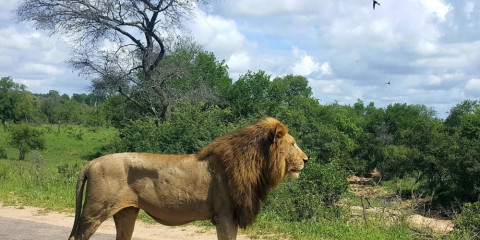
3-Day Best Budget Kruger Park Safari
$556 pp (USD)
South Africa: Shared tour (max 6 people per vehicle) Guest House
You Visit: Johannesburg (Start) , Kruger NP, Nelspruit (End)
Elephant Herd Tours & Safaris Tour operator has an office in South Africa
4.8 /5 – 90 Reviews

5-Day Kruger Park and Manyeleti Bongan African Lodge
$851 pp (USD)
South Africa: Shared tour (max 12 people per vehicle) Lodge
You Visit: Johannesburg (Start) , Manyeleti GR (Greater Kruger) , Central Kruger, Blyde River Canyon (Panorama Route) , Kruger NP, Johannesburg (End)
Bongan Safaris Tour operator has an office in South Africa
4.9 /5 – 18 Reviews
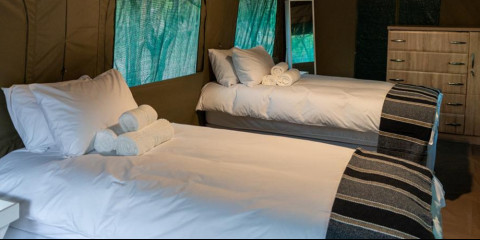
4-Day Ultra Budget Glamping Kruger Safari
$516 pp (USD)
South Africa: Shared tour (max 10 people per vehicle) Tented Bush Camp
You Visit: Johannesburg (Start) , Kruger NP, Panorama Route (Highlight) , Johannesburg Airport (End)
MoAfrika Tours Tour operator has an office in South Africa
4.9 /5 – 1133 Reviews

4-Day Safari to Kruger National Park via Panorama Route
$990 pp (USD)
South Africa: Shared tour (max 6 people per vehicle) Lodge
You Visit: Johannesburg (Start) , Kruger NP, Johannesburg (End)
Wildlife Safaris Tour operator has an office in South Africa
4.9 /5 – 258 Reviews
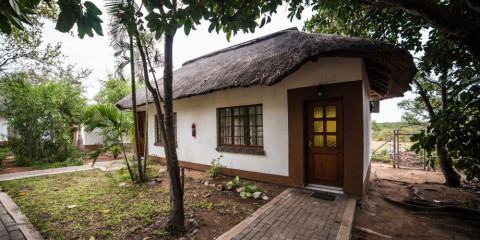
4-Day Tremisana Lodge Kruger Park Safari
$887 pp (USD)
South Africa: Shared tour (max 9 people per vehicle) Lodge
You Visit: Johannesburg (Start) , Balule NR (Greater Kruger) , Balule NR (Greater Kruger) , Kruger NP, Blyde River Canyon (Panorama Route) , Johannesburg (End)
Viva Safaris Tour operator has an office in South Africa
4.9 /5 – 261 Reviews
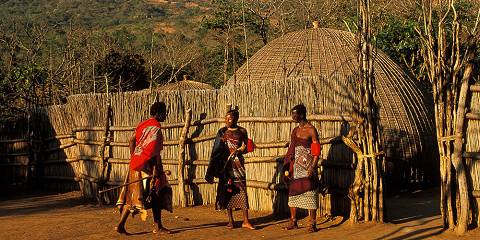
3-Day Kruger Safari and Swaziland Cultural Tour
$868 to $955 pp (USD)
South Africa & Eswatini: Shared tour (max 6 people per vehicle) Lodge
You Visit: Johannesburg (Start) , Southern Kruger, Mantenga Village (Highlight) , Kruger NP, Johannesburg (End)
Balanta Imagine Safaris Tour operator has an office in South Africa
5.0 /5 – 1 Reviews

5-Day Tented Safari with Panorama Route Tour
$1,346 pp (USD)
South Africa: Private tour Camping & Lodge
You Visit: Johannesburg (Start) , Hoedspruit (Town) , Kruger NP, Johannesburg (End)
Khalanga Safaris Tour operator has an office in South Africa
5.0 /5 – 62 Reviews

3-Day Luxury Mdluli Game Lodge Kruger National Park
$527 pp (USD)
Gems of Africa Safari and Tours Tour operator has an office in South Africa
4.9 /5 – 98 Reviews

3-Day Big 5 Budget Safari, Kruger National Park
$376 pp (USD)
South Africa: Shared tour (max 10 people per vehicle) Lodge
Safari With Us Tour operator has an office in South Africa
5.0 /5 – 217 Reviews
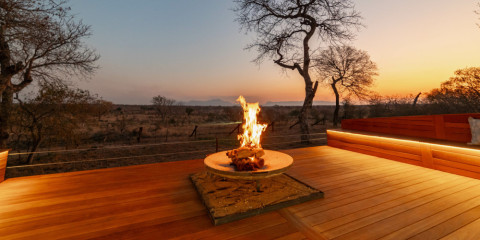
4-Day Safari in Style - Lodge Living & Kruger Safari Fun
$1,100 pp (USD)
You Visit: Johannesburg (Start) , Balule NR (Greater Kruger) , Central Kruger, O.R. Tambo Airport (Johannesburg) , Johannesburg (End)
Shinzelle Safaris Tour operator has an office in South Africa
4.9 /5 – 63 Reviews

4-Day Kruger Safari, Soweto & Apartheid Museum
$871 pp (USD)
South Africa: Private tour Lodge & Tented Camp
You Visit: Johannesburg (Start) , Soweto (Johannesburg) , Kruger NP, Johannesburg Airport (End)
Nhlalala Travel Tour operator has an office in South Africa
4.9 /5 – 33 Reviews
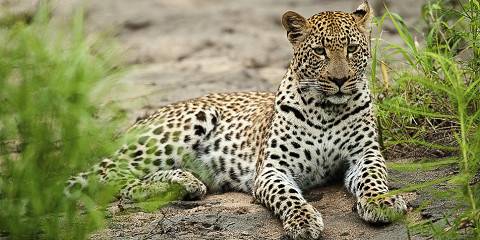
3-Day Johannesburg to Kruger National Park Safari
$591 pp (USD)
South Africa: Shared tour (max 9 people per vehicle) Camping
Mbombela Experience Tours & Transfers Tour operator has an office in South Africa
5.0 /5 – 32 Reviews

4-Day & 3-Night Kruger National Park Budget Safari
$583 to $649 pp (USD)
South Africa: Shared tour (max 8 people per vehicle) Guest House
You Visit: Johannesburg (Start) , Southern Kruger, Kruger NP, Johannesburg Airport (End)
The Mzansi Experience Tour operator has an office in South Africa
4.8 /5 – 63 Reviews

7-Day Classic Eco-Safari in Kruger (Transfers Incl)
$4,082 pp (USD)
South Africa: Private tour Lodge & Guest House
You Visit: Johannesburg (Start) , Klaserie NR (Greater Kruger) , Kruger NP, Panorama Route (Highlight) , Blyde River Canyon (Panorama Route) , Johannesburg (End)
5.0 /5 – 42 Reviews

4-Day Zula Mdluli Safari Lodge
$1,911 to $2,026 pp (USD)
South Africa: Private tour Lodge
You Visit: Johannesburg (Start) , Waterval Boven (Village) , Kruger NP, Panorama Route (Highlight) , Hazyview (Town) , Johannesburg (End)
Zula Zula Adventure Bus Tour operator has an office in South Africa
5.0 /5 – 2 Reviews

5-Day Discover the Ultimate Escape Unlock Your Getaway
$1,699 to $2,255 pp (USD)
South Africa: Private tour Tented Camp & Hotel
African Wildlife Plains Tour operator has an office in South Africa
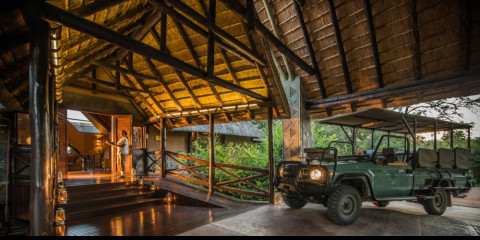
5-Day Luxury Kruger Park and Sabi Sand Safari
$2,921 pp (USD)
South Africa: Private tour Lodge & Chalet
You Visit: Johannesburg (Start) , Kruger NP, Sabi Sands (Greater Kruger) , Johannesburg (End)
Safari.com Tour operator has an office in South Africa
4.7 /5 – 186 Reviews

6-Day Sabi Sands and Kruger Park Safari
$4,121 to $4,521 pp (USD)
You Visit: Johannesburg (Start) , Sabi Sands (Greater Kruger) , Kruger NP, Johannesburg Airport (End)
Discover Africa Safaris Tour operator has an office in South Africa
4.9 /5 – 420 Reviews
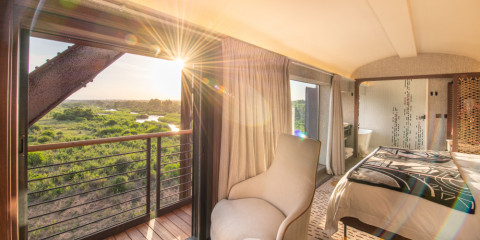
4-Day Kruger National Park Train on the Bridge Safari
$2,008 to $2,344 pp (USD)
You Visit: Johannesburg (Start) , Kruger NP, Johannesburg Airport (End)
The Kruger Safari Co. Tour operator has an office in South Africa
5.0 /5 – 125 Reviews

5-Day Mid-Range Kruger Safari
$1,151 pp (USD)
South Africa: Shared tour (max 9 people per vehicle) Hotel
Socioolite Travel and Tours Tour operator has an office in South Africa
5.0 /5 – 17 Reviews
Related Searches
- Kruger Safari Tours
- Kruger Luxury Tours
- Kruger Camping Safaris
- Kruger Self-drive Safari Tours
- 4-Day Kruger Packages
- 4-Day Kruger Safaris From Johannesburg
- 5-Day Kruger Itineraries
- Kruger Tours for Families
- 1-Week Kruger Safaris
- Seven Day Kruger Safaris From Johannesburg
- Kruger Lodge Safaris
- 7-Day Kruger Itineraries
- Kruger National Park Safari
- Planning your Kruger Park Safari
- What to Bring on Safari
- What to Expect on Safari
- Kruger Park Safari General Information
- Frequently Asked Questions
- Viva Safaris Company Profile
- Meet The Viva Safaris Staff
- Tremsisana Lodge and Marc’s Treehouse Lodge Compared
- Viva Safaris Newsletters
- Kruger Park Safari Enquiries
- Kruger National Park Safari Reviews
- Safari Video Gallery
- Terms and Conditions
- Introduction
- Tremisana Lodge in the Media
- Accommodation
- Game Viewing
- History of Balule Game Reserve
- Safaris Staying at Tremisana Lodge
- Camera Trap Gallery
- Marc’s Treehouse Lodge in the Media
- Safaris Staying at Marc’s Treehouse Lodge
- Katekani Introduction
- Safaris Staying at Katekani Tented Lodge
- Masango Camp Introduction
- Safaris Staying at Masango Camp
- Safaris Staying at Luxury Lodges
- Special Kruger Park Safari Packages
- All Kruger Park Safari Packages
- Make a Reservation
- Make a Payment

Kruger Park Safaris
See africa's mighty big 5.

Viva Safaris
Sharing our passion for wildlife for 30+ years.

Value-for-money Safaris to Kruger Park

Kruger Park Safari Experiences with Viva Safaris
From humble beginnings in 1991, Viva Safaris has grown to become the most sought after tour operator servicing the Kruger National Park region. Our diversity of Kruger Park safari experiences easily beat those of any competitor.

Get up close to the Big 5 in the Kruger Park with one of our open game viewers!

Viva Safaris is consistently rated amongst the top 10 tour operators in South Africa!
I would like to, once again, congratulate all the Viva Safaris staff on another year of outstanding work. Your energy, enthusiasm and excellence have been fundamental in our success story. The fact that we have had departures from Johannesburg EVERY SINGLE DAY this year is both remarkable and enviable. We shall complete the year in the same manner, resulting in 365 departures for 2023. Take a bow, every single one of you. The quality of reviews posted by previous guests plays a big part in helping tourists decide to choose one of our packages. Without exception, these reviews bear testimony to the passion and energy that our happy staff bring to their workplace. Well done to all !!!!
Kruger National Park Safari Packages and Tours
We are completely self-sufficient and highly experienced….we own our lodges; we have a fleet of air conditioned mini busses that will bring you from your location in Johannesburg right to the bush; we have our own fleet of game viewing vehicles; our own rangers and trackers; our own chefs and lodge management staff and of course a range of 30 different Kruger Park safaris that vary from cost effective on night/two day safaris to combined Kruger Park and Private Reserve safaris where you can experience the thrill of walking in the bush amongst the Big Five of Africa – of course for those who demand the luxurious, our Fly In safaris and Luxury Lodge safaris are legendary !!!
Viva Safaris has got it right – the blend of exclusive and personal sightings in our private reserve, Balule, and the wide diversity and great number of animal encounters in Kruger provide an unequalled wildlife opportunity.

The beautiful Marula Tree Boma under the African night sky

Armed ranger leads group of guests along Olifants River
Click play below to see a brief video overview of what you may experience on a safari to the Kruger National Park with Viva Safaris:

Young bull elephant keeping a close eye on us in the Kruger
Viva Safaris was established in 1991 by people that love wildlife. Family-owned and wholly South African, our aim has always been to enthusiastically share that love and passion with the thousands of satisfied tourists that have been through our hands. We do not aim for exclusivity – we have made our Kruger Park safari packages accessible to a wide range of pockets.

Guests being shown wildlife during bushwalk
We are aware that current tourists are a lot smarter, more price-conscious and have high expectations for their money. If one compares our tariffs to other Kruger National Park safari operators, it is evident that our safaris are not only eminently affordable but also offer our guests a value-filled product with a personal touch . There can be no doubt that our safari products constitute the very best value for money safaris to the Kruger National Park .

Relaxed Motlala leopard looking at Jordan and guests
Mindful of our guests’ need to share their wonderful wildlife experiences with friends and family at home, we have introduced FREE 24hr WIFI at all our lodges.

Dining room overlooking Breakfast Dam at Marc’s Camp
Kruger Park Safari Lodges
Viva Safaris is in the unique position of owning its own accommodation establishments. We are thus able to guarantee levels of excellence expected by our valued international guests. We offer a wide spectrum of products that are affordable to backpacker and bush connoisseur alike.
TREMISANA GAME LODGE is our flagship establishment and is relatively upmarket. It is the largest and leading Big Five game lodge in the Balule Section of the Greater Kruger National Park . We have 15 chalets as well as a 2-bedroom guesthouse. All units are en suite and airconditioned. The exquisite luxuriant gardens and water features make this camp a veritable oasis. Guests at Tremisana enjoy the best of both types of safaris : the traditional lodge operation includes a 4 hour bush walk and 4 hour sunset game drive on open Landcruisers including an unforgettable Bush Braai (BBQ) in the middle of wildest Africa while our guests will also enjoy full day open vehicle Kruger National Park safaris .

Tremisana chalet

The water feature and lush gardens at Tremisana Game Lodge, Kruger National Park
The wildlife viewing at the Tremisana Game Lodge waterhole is unbelievably good. We have sightings of all the Big Five on our property.
MARC’S TREEHOUSE LODGE is a unique lodge beautifully positioned along the banks of the perennial Klaserie River. It is situated in the Motlala Game Reserve which has 3 of the Big 5 : Black and White Rhino, Buffalo and Leopard. The rustic treehouses are romantic and restful and blend perfectly into the bush.

One of the treehouses at Marc’s Treehouse Lodge
KATEKANI TENTED LODGE comprises of eight beautifully appointed Tented Chalets with bathtub, indoor and outdoor showers, splash pool and deck. Each chalet has a thatched roof and is elevated so as to allow for spectacular views of the bushveld.

Katekani Tented Lodge

Katekani Tented Lodge Bed
MASANGO CAMP is named after the late Ronald Masango, Viva Safaris’ and the whole region’s first ever black Camp Manager, and is extremely popular with budget-conscious travellers. The camp comprises 8 en suite chalets and each chalet has an overhead fan, electric lights and power points and all the comfortable beds are covered by mosquito nets. The camp has a good-sized swimming pool and an open BBQ Boma. The central common room has a bar, a breakfast nook, a lounge as well as indoor dining facilities.

Masango Camp Chalet interior

The pool at Masango Camp
All our lodges have 24 hour WIFI available to all our guests
The Kruger National Park
One of South Africa’s most popular tourist destinations , the Kruger National Park is famous the world over. It is the oldest Park in Africa and also one of the largest.
In 1898, then president of the Transvaal republic, Paul Kruger established The Kruger National Park – then called the Sabie Game Reserve. Paul Kruger recognised the need to protect the wildlife of the Lowveld region and created an area where no hunting was allowed.
In 1902 when Scotting-born James Stevenson-Hamilton was appointed as the first Warden of the park it was still known as the Sabie Game Reserve. Finally, in 1926 Paul Kruger’s vision was realised and the national parks act was brought into effect, following this in 1927 the Sabie Game Reserve & Shingwedzi Game reserves were amalgamated and merged to become the Kruger National Park. (Named for the efforts and drive of the honourable Paul Kruger) When the park first opened to the public Game enthusiasts and motorists were allowed entry into the Kruger National Park at the cost of one pound.
The Kruger National Park stretches across the vast tract of land between the Sabie & Crocodile Rivers. The Kruger National Park is similar in length to England and is about 65% of the area of England.
- Kruger is approx 350km long and 60km wide and covers an area of 19,485 square kilometres
- The Kruger National Park is located in the north-eastern provinces of Limpopo and Mpumalanga in South Africa, and borders Mozambique and Zimbabwe to the east and north respectively.
- It was first protected by the then Transvaal Republic in 1898 and known as Sabi Game Reserve
- In 1926 it became South Africa’s first national park , when Sabi Game Reserve was combined with the adjacent Shingedzi Game Reserve and farms and given the name Kruger National Park
- The Kruger Park is named after the President of the Transvaal, President Paul Kruger (1825 – 1904) who was responsible for creating the original protected area of Sabi Game Reserve in 1898
- The Kruger Park is home to all of the “Big Five” (lion, rhino, buffalo, elephant and leopard), as well as more large mammals than any other game reserve in Africa (147 species in total).
- An amazing 517 species of birds can be found in the Kruger Park.
- In 2000, a multinational agreement between South Africa, Zimbabwe and Mozambique lead to fences coming down between Kruger National Park, Limpopo National Park in Mozambique and Gonarezhou National Park, Manjinji Pan Sanctuary and Malipati Safari Area in Zimbabwe. This new combined area is called The Great Limpopo Transfrontier Park , and is the first phase of a larger conservation area that is planned to measure almost 100,000 square kilometres when complete!
- Over 300 archeological sites of Stone Age man have been found in the park, containing cultural artefacts from 100,000 to 30,000 years ago.
- There is also numerous evidence of San and Iron Age people from around 1500 years ago in the park, with San Art found throughout.
KRUGER NATIONAL PARK – A BRIEF HISTORY
The mastermind and animal lover behind the development of the Kruger National Park was then president of the Transvaal Republic, Paul Kruger. He was not a well-educated man, with only three formal months of education spent in a rural farm school, but he grew up in the wild frontiers of the old country and had an enduring love of nature and wildlife.
At the urging of early conservationists who were alarmed at the scale of unchecked hunting in the Lowveld region, he made an indelible mark in history by proclaiming an expansive area would be allocated for the protection of South Africa’s wild animals.
Paul Kruger was born on a rural farm in 1825. When the Great Trek started in 1836, his father uprooted the entire family and moved them to what was known as the Transvaal, where they settled in a town called Rustenburg.
At the age of 16, Paul Kruger was allowed to choose his own farm and chose to settle on a property at the base of the Magaliesberg Mountains. Kruger married in 1842 and shortly thereafter moved to the Eastern Transvaal where he lost his wife and young infant son to what was suspected to be malaria and re-married a woman who bore seven daughters and nine sons, although many of his children died in infancy.
Kruger showed strong leadership qualities and eventually became Commandant-General of the then South African Republic, later known as the Transvaal. His leadership skills became more prominent when he was appointed member of a commission of the Volksraad, the Transvaal Republican Parliament who were tasked with drawing up a constitution.
He resigned as Commandant-General, in 1873 and retired to his farm, Boekenhoutfontein. His retirement was short-lived and he was elected to the Executive Council. Shortly after that he became Vice-President. Paul Kruger led a resistance movement and became leader of a deputation. The first Anglo Boer war was 1880 and the British forces were defeated in a battle at Majuba in 1881. Paul Kruger was instrumental in negotiations with the British at this time, which later led to the restoration of Transvaal as an independent state under British rule.
Paul Kruger was elected as president of the Transvaal in1882 at the age of 57. He left for England in 1883 to revise the Pretoria Convention of 1881, an agreement which was reached between the Boers and the British that ended the first Anglo Boer War. During this time in Europe Paul Kruger acquired many allies. Paul also attended an imperial banquet in Germany at which he was presented to Emperor Wilhelm I, and spoke at length with the renowned Bismarck.
The political climate of the Transvaal changed with the discovery of gold in the Witwatersrand basin. It spurred a gold rush and immigrants from around the world descended on the gold fields in search of fortunes. Paul Kruger’s leadership was put to the test at the end of 1895 when the failed Jameson Raid, led by Doctor Starr Jameson, brought about a breakdown in relations between the British and the Boers. It ultimately led to the second Anglo Boer War, known as the South African war.
Kruger was known as a fierce protector of the Afrikaner nation and on being elected as President of South Africa in 1883, he tirelessly campaigned for South Africa’s complete independence from Britain and the abolition of British supervision.
The South African war broke out in 1899 and Kruger, now 74, remained in Pretoria due to ill health until 1900. When the war swung in favour of the British army, Kruger was forced to flee the capital just days before Lord Roberts occupied the city. He boarded a Dutch warship at Lorenço Marques (Maputo) and left for Europe, where he lived out his remaining years in exile. He died of heart failure at the age of 79 years while still living in Switzerland.
Kruger made allies of the European sovereignty and arch enemies of the British and was regarded as a fierce politician and military man. However, Paul Kruger’s legacy will always be the creation and the formation of the Kruger National Park.
UNDER THREAT
The Kruger National Park had a precarious start with numerous factions threatening its survival. Hunters wanted access to the Park; soldiers returning from the First World War expected land for sheep farming; prospectors wanted access to the land to search for gold, copper and coal; and South Africa’s veterinarians were campaigning for a mass slaughter of wildlife to contain the spread of tsetse fly disease.
South African Railways (SAR) that incidentally saved the Kruger National Park when they opened a new route from Pretoria to Lorenço Marques (now Maputo in Mozambique). The train stopped within the reserve and travellers were allowed to explore the surrounding bush with a game ranger on hand.
Awareness of the Park and growing interest in it empowered conservation lobbyists to secure the future of the Kruger National Park as a tourist destination that would generate revenue for it to be self-sustainable.
The Kruger Park finally received international acclaim when Princess Elizabeth and Princess Margaret visited as part of their royal tour of South Africa and stayed in one of the first luxury lodges built in the reserve. By 1955, over 100 000 people were visiting the Park each year.
The Kruger National Park grew in size when the game fences between the private reserves on Kruger’s western border came down in 1994. In 2001, the fences were removed between South Africa, Mozambique on its eastern border and Zimbabwe on its northern border. This created the multinational Greater Limpopo Transfrontier Conservation Area.
Now called a Peace Park, it incorporates Parque Nacional do Limpopo in Mozambique and Gonarezhou National Park in Zimbabwe, making it the largest conservation reserve in Africa. The Peace Park is part of the Kruger to Canyons Biosphere, an area designated by the United Nations Educational, Scientific and Cultural Organisation (UNESCO ) as an International Man and Biosphere Reserve.
THE FIRST WARDEN – KRUGER PARK
Scottish-born James Stevenson-Hamilton was appointed as initial warden of the Park in 1902 whilst it was still called the Sabie Game Reserve. The reserve was later united with Shinwedzi Game Reserve in 1927 and transformed into the Kruger national park. His journals are housed within the Memorial Library in Skukuza and make for fascinating reading. He came to South Africa in 1888 as a member of the 6th Enniskillen Dragoons. This is the first time he came across wild game in the bush and he immediately fell in love with the country.
He returned to South Africa during the second Boer War, as a major in the British army. He did not want to return to England at the end of the war and secured the position of Warden of the Sabi Game Reserve. There was no clear instruction on what to do in the position except to make himself “thoroughly disagreeable to everyone”. Stevenson-Hamilton took his job seriously and when he caught two policemen poaching game he had them arrested and convicted. This incident earned him quite a reputation. Amongst other tasks, he stopped the movement of cattle through the Park and stopped all prospecting for coal and minerals.
In 1914, Stevenson-Hamilton joined the forces at the start of the First World War. He left the management of the Park in the hands of a ranger who ultimately let the administration slide. On his return to the Park, Stevenson-Hamilton found his beloved Park was in a shambles. He fought tooth-and-nail to save the Kruger National Park, as the war had stimulated greedy development of the land for agricultural purposes.
The Selati Railway Line was established and this saved the Kruger Park. A 9-day tour of Mozambique and the Lowveld included a one-night stop at what is present-day Skukuza. Stevenson-Hamilton invited members of the Provincial Council to visit the reserve which helped these influential members of government to understand the value and importance of the proclaimed Park.
Stevenson-Hamilton was called Skukuza by his staff, a Shangaan name meaning either “he who sweeps clean” or “he who turns everything upside down. Skukuza, roughly interpreted, is taken from the Zulu word for “broom”. However, it wasn’t a positive term as the Tsonga tribe was bitter at being deprived of their historical land. The main rest camp at Sabie Bridge was called Skukuza in Stevenson-Hamilton’s honour.
Stevenson-Hamilton remained with the Park until he retired in 1945, on the eve of his 80th birthday.
WILDERNESS TRAILS
In 1957 the first wilderness trails were pioneered by a Natal Parks Board game ranger named Ian Player (brother of legendary South African golfer Gary Player) and his friend and mentor Magquba Ntombela. Dr Player is well-known for his work in environmental fields and international involvement in wildlife conservation.
The wilderness trails established by Dr Player, as well as the walking safaris, were pioneered in South Africa in the 1950s and 1960s by visionary South African conservationists and forward-thinking individuals which has partly resulted in the Kruger National Park we know and love today.
Dr Player is probably one of South Africa’s most highly regarded environmentalists and a conservationist who led efforts to rescue the southern white rhino from extinction.
He was instrumental in developing the first wilderness trails in 1957 in the Kruger National Park.
Player was a game ranger on the Umfolozi Game Reserve in KwaZulu-Natal, the oldest nature reserve in Africa. When it was established in 1897, there were only about 50 southern white rhinos left in the world and all of them were on the reserve. The rhino faced extinction as vast numbers of Zulus that were displaced by the government’s land policy had settled on the borders of the reserve and poaching was out of control. There was also the threat of an anthrax breakout from stray infected cattle that wondered into the reserve.
By the 1960s the Umfolozi’s population of white rhino had grown to 600; however, Player realised the danger of keeping an entire subspecies restricted to one small Park and started a campaign that eventually allow him permission to move a small herd of rhino to the Kruger National Park. This would ensure the survival of the rhino by establishing a gene pool in other regions of the country.
By this stage, veterinarian Toni Haarthoorn had pioneered a “dope darting” technique that was used in Operation Rhino, one of the most successful wildlife translocation programmes that included moving rhino to other parts and to overseas reserves.
PRE-HISTORIC MAN
Ample evidence shows that prehistoric man (Homo Erectus) roamed the Kruger National Park Area between 500 000 and 100 000 years ago. The Kruger National Park boasts 254 cultural heritage sites in the Kruger National Park, including nearly 130 recorded rock art sites. Over 300 archaeological sites of Stone Age man have been discovered dating back 100 000 to 30 000 years ago. There is evidence of Bushman tribes (San people) and Iron Age inhabitants dating back 1500 years ago and Nguni people as well as European explorers throughout the Kruger National Park area.
Significant archeological finds have been at Thulamela and Masorini where there are numerous examples of San art. San art can be found throughout The Kruger National Park Reserve.
THE FIRST TOURISTS
In 1927, when the Kruger National Park Was proclaimed a national park in south africa under the national parks act of 1926, the value of tourism from game reserves as a major source of revenue was already well established and The Kruger National Park had been identified as a main destination by that time. Stevenson-Hamilton, Warden of the Kruger National Park at the time had been arranging excursions and overnight stays in the Kruger National Park. There were, however, no facilities for the tourists who usually slept on the train that had brought them to the Kruger National Park from Witwatersrand.
Roads and small routes through the Kruger National Park were built with the hopes of attracting more tourists, the idea being that paying tourists would be accompanied by a guide. The media of the time were invited to visit and write about the Kruger National Park and share their wildlife adventures in Kruger – over time the Kruger National Park became rather renowned and gained international repute. There was still a problem with the lack of accommodation and facilities so, the South African Railways (SAR) approached the board of the Kruger National Park in 1927 with a request to erect quarters that the Park could rent to visitors. This partnership between the Kruger National Park and South African Railways led to the development of the necessary infrastructure and roads. Facilities for guides and game rangers were erected throughout Kruger National Park and facilities and infrastructure abound. In exchange for use of these facilities for their paying tourists, South African Railways undertook to provide all transport, by rail and road, and launched an advertising campaign, set up catering services and paid the board a percentage of the income received.
Four two-track roads were built initially; from Crocodile Bridge to Lower Sabie, from Acornhoek to the Mozambique border, from Gravelote to Makubas Kraal (near Letaba) and from White River to Pretoriuskop.
The Pretoriuskop area was opened to tourists in 1927 but only on the issue of a permit from the secretary of the board in Pretoria and the game warden on duty at Pretoriuskop. This arrangement was restrictive and confusing and eventually the board appointed an agency in 1931 to issue permits at Numbi Gate.
There were still no overnight facilities built at that time and the general public had to leave the Park before the gates closed in the evening. Hunting by this stage had been strictly prohibited but visitors could carry a revolver on them for their personal protection.
SAR received permission from the board to open the railway bridges over the Crocodile, Sabie and Olifants Rivers for motor vehicles, and to run a train service on the Selati Railway for tourists. The number of visitors to the Kruger National Park steadily grew as it became more accessible and convenient.
MODERN TOURISM IN THE KRUGER NATIONAL PARK
The board of Kruger National Park committed in 1928, to extensive plans to boost tourism to the reserve. A total of three new rest huts were built at Satara, Pretoriuskop and Skukuza. A year later, two rondavels (round houses) were built at Skukuza, and two were built at Satara. there were plans submitted to build more rondavels at other camps were the and older ranger quarters were restored and made available for tourists. The Kruger National Park was set to start attracting overnight stays.
Originally the design of the original rondavels was in the “Selby” style, named after an American mine engineer, Paul Selby, that was on the board at the time. There was a gap between the wall and the roof for ventilation, and there was a hole in the door that was used as a peephole to see if there were dangerous animals outside the hut. The rest camps were not fenced and animals roamed freely in and out of the designated visitors’ area.
The original rondavels weren’t well-liked as they were stiflingly hot in summer and mosquitoes came in through the open gaps. From 1931, new rondavels were designed that were closed to the thatch roof and had windows in them. The board extended any developments including tented rest camps and ancient huts created type wattle and native cement.
The first ablution blocks went up at Skukuza in 1932, with four baths and four showers. The rest camps were also finally fenced at the same time. more modern and improved designs were introduced and the Kruger National Park took on a more uniform look overall, as it was previously quite haphazard. Facilities focused on the comfort and needs of tourists, as well as their safety.
Hot water for bathing was a luxury in those early days. Eventually the board relented and provided hot running water to the camps on the condition tourists paid one shilling per bath.
Demand for accommodation had increased so much by the mid 1930’s that the Kruger National Park board asked the government for additional funding of £50,000 and additional beds and rest camps were made available for some 200 visitors.
Kruger National Park received even more fiscal support from the government. Money was spent on luxuries such as mosquito nets, septic tanks and hot showers, the park also invested heavily in game management programmes.
The board of Kruger National Park started charging a fee to visit the Park for the first time in 1928 to raise much-needed revenue. Five shillings for day visitors and a nominal charge per car was implemented. Visitors could hire a game ranger to escort them through the Park for an added fee, they were also charged to cross the rivers in their cars on pontoons that were set up.
The board also outsourced the management of the rest camps and refreshment stops for Skukuza and Satara to independent contractors and providers when tourist traffic increased to a point that the Park staff could no longer manage the demand.
These contractors were responsible for the issuing of permits, supervision at the camps and catering services. The rest camps were only equipped with wood and ‘riempie’ beds and visitors could hire mattresses and linen from the camp supervisors.
The board eventually employed their own management staff to run the rest camps because of the number of complaints from the tourists. The board took over all trade activities and employed the first tourism manager in the mid-1940s. In the 1960s, the first liquor license was issued.
The rules and regulations for the Kruger National Park when it first opened to visitors were pretty relaxed, except that firearms were strictly prohibited. Tourists had pretty much free range and did not even have to return to the rest camps at night. However, the first list of regulations was published in the 1930s when poor behaviour started causing problems.
Tourists were limited to driving through the Park between sunrise and sunset, and were made to return to their rest camp for the evening. A strict speed limit was implemented and littering was prohibited. The board appointed the Automobile Association (AA) to run a service where patrol cars would monitor traffic on the Park roads.
The only mode of transport when the Park was first proclaimed was the Selati railway line, ox wagons, buggy carts, pack donkeys and horses. There were no roads and no vehicles in the Park in those days.
Bush clearing started in earnest in 1927 and the first roads were put in to create more convenient routes between the ranger’s posts within the Kruger National Park. The construction of roads within the Kruger National Park for tourists followed a few years later. Three pontoons were built on the main rivers and a new causeway was built over the Sand River and the Letaba River.
The impressive road network that had developed by 1946 was a massive achievement, considering how remote the Kruger National Park was, and the fact that the Kruger National Park was in serious financial trouble, had a shortage of equipment and lacked manpower.
Requests to tar the roads were vehemently opposed, with the thinking that it would turn the reserve into a “glorified Park” and it would lose its natural appeal. Stevenson-Hamilton was strongly opposed to tarring the roads, saying it would result in speeding incidents and the death of animals.
Permission to tar the roads was only granted in 1965 and only for the main strip between Pretoriuskop and Skukuza. Today there are more than 850 kilometres of tarred roads in the Park.
THE TOPOGRAPHY AND GEOGRAPHY OF THE KRUGER NATIONAL PARK
The Kruger Park is in the north-east of South Africa on the confluence of the Limpopo and Mpumalanga provinces. The Luvuvhu and Limpopo Rivers converge at Crookes Corner in the Pafuri triangle at the most northerly point of the Park and if you stand in the river bed, you have Mozambique on your right, Zimbabwe straight ahead and South Africa on your left.
The Lebombo Mountains towards the eastern region of the Park separates Kruger Park from Mozambique. The Limpopo and the Crocodile Rivers act as its natural boundaries on the north and south of the park.
The Kruger National Park’s topography varies and altitude ranges between 200 metres (660 feet) in the east and 840 metres ( 2 760 feet) in the south-west near Berg-en-Dal. The highest point in the Kruger Park is a hill called Khandzalive.
Several rivers run through the park including the Sabie River, Olifants River, Crocodile River, Letaba River, Luvuvhu River and Limpopo River.

A NEW FRONTIER: THE GREAT LIMPOPO TRANSFRONTIER PARK
In the year 2000 a vision to create Peace Park came to fruition when a multi-national agreement led to the fences being brought down between the Limpopo National Park in Mozambique, the Kruger National Park, and Makuleke region in South Africa, and Gonarezhou National Park, Manjinji Pan Sanctuary and Malipati Safari Area in Zimbabwe.
The fences were removed based on a Memorandum of Understanding that did away with political boundaries that restricted the free movement of animals along old migratory routes. In 2001 the first 40 elephants were relocated from Kruger Park to Limpopo National Park (including 3 breeding herds of a planned 1 000 elephants).
The aim of these transfrontier parks is to preserve traditional animal migration patterns, and ensure there are sufficient food and water sources as the population of animals increase. Peace Parks also encourage tourism and economic development that is mutually beneficial for all parties. It is entirely reliant on the goodwill and integrity of the frontier countries.
SEASONS AND CLIMATES FOR KRUGER PARK SAFARI
The Kruger National Park is in the Lowveld region and is part of a subtropical zone where summer days are hot and humid (temperatures often reaching the 40°C (100°F) mark.)
Rainfall mainly occurs in the summer months, with showers expected from September until May. Early September to October are considered the best game viewing months as the grass is thin short due to the preceding drier months making for excellent game viewing. The winter months from are popular because the mosquitos are less active in the cooler months and there is less chance of contracting malaria if you are not taking prophylactics. The game also conveniently stay close to the watering holes in the drier winter months and this attracts the predators which makes it an ideal time of the year for game viewing.
KRUGER NATIONAL PARK FLORA
The Kruger National Park is has four main bushveld regions that each boast their own distinctive appeal:
- Thorn trees and red bush-willow veld Between the western boundary and roughly the centre of the Park south of the Olifants River. Combretums, like the red bush-willow (Combretum apiculatum) and Acacia species dominate while there vast numbers of marula trees (Sclerocarya caffra). There are many Acacias along the rivers and streams.
- Knob-thorn and marula veld South of the Olifants River in the eastern half of the Park, this area provides the most important land for grazing. Species such as red grass (Themeda triandra) and buffalo grass (Panicum maximum) predominate while the knob-thorn (Acacia nigrescens), leadwood (Combretum imberbe) and marula (Sclerocarya caffra) trees are the main tree species.
- Red bushwillow and mopane veld This area lies in the western half of the Park, north of the Olifants River. The two most prominent species here are the red bushwillow (Combretum apiculatum) and the mopane tree (Colophospermum mopane).
- Shrub mopane veld Shrub mopane covers almost the entire north-eastern part of the Park. There are a number of smaller areas in the Park which carry distinctive vegetation such as Pretoriuskop where the sickle bush and the silver cluster-leaf (Terminalia sericea) are prominent. The sandveld communities near Punda Maria are equally definitive, with a wide variety of unique species.
KRUGER NATIONAL PARK BIRDING
The Kruger National Park is a birder’s paradise boasting 517 species of birds; 253 are residents, 117 non-breeding migrants and 147 nomads.
Locally called the Big 6, there are six large species that are mostly restricted to the Park’s conservation areas. They are the lappet-faced vulture, martial eagle, saddle-billed stork, kori bustard, ground hornbill and the reclusive Pel’s fishing owl, which is localized and seldom seen.
There are between 25 and 30 breeding pairs of saddle-billed storks in the Kruger National Park, besides a handful of non-breeding individuals. In 2012 178 family groups of ground hornbills roamed the Park and 78 nests were known, of which 50% were active.
Pafuri and Punda Maria in the far north of the Park are regarded as one of the birding hotspots of the world. There are a number of species in the Kruger National Park that are not found anywhere else in the world.
The rest camps in the Park are where birds often see some of the best birds, particularly those bushveld camps that are situated on one of the main rivers. The comical hornbills and glossy starlings have made the rest camps their home, with easy pickings from picnic scraps and family barbeques.
The many dams scattered around the Kruger National Park are excellent birding spots, with the African Fish Eagle being a prize sighting. Its signature call is an absolute delight.
Let us take a look at the few bird routes in the Kruger National Park that attract avid birders to the region.
- Lowveld Mpumalanga Birding Route This is a popular birding route in the southern part of the Park which is a sub-tropical area with a lot of open bushland. Typical species of trees in the area include the acacia, leadwood, marula and tamboti trees. Common species found in the area include the African scops-owl, bateleur, crested francolin, lilac-breasted roller, southern ground hornbill and white-crested helmet shrike. Some of the sought-after and rare birds found in this route include the martial eagle, narina trogon and southern bald ibis.
- Soutpansberg-Limpopo birding route This route falls within the northern region of the Kruger National Park and is part of the Greater Limpopo birding route which extends beyond the borders of the Park through Mapungubwe National Park, the Soutpansberg mountain range and Venda. Punda Maria is known for sightings of the crowned hornbill, eastern (yellow-spotted) nicator and mosque swallow. The mopani bush and woodland areas attract the Arnott’s chat, black coucal, little bittern, racket-tailed roller and white-breasted cuckooshrike. Along the banks of the Levuvhu River, look out for the Böhm’s spinetail, Dickinson’s kestrel, lemon-breasted canary, mottled spinetail, river warbler and sooty falcon.
- Kruger to Canyons Biosphere birding route This route incorporates parts of northern Kruger National Park and big sections of the central region. It begins outside the park in Graskop, moves along the Blyde River Canyon, down to Hoedspruit and on to the Kruger National Park via Phalaborwa. Popular sightings include the African barred owlet, collared (red-winged) pratincole, Pel’s fishing-owl, white-crowned lapwing (plover) and yellow-billed oxpecker.
THE GREAT BIG 5
The Big 5 was a collective term used for the most difficult animals to hunt, namely Leopard, Rhino, Elephant, Transvaal Lion & Cape Buffalo. This term takes on a much more gentle form today, and refers to spotting the “Big Five” out in the wild and NOT shooting them! All five species are endangered to some extent and under threat of extinction from poaching that continues despite earnest anti-poaching programmes.
- Buffalo’s primary predator is the lion. Buffalo will try to rescue another member who has been caught. They have been observed killing a lion after it has killed a member of the group.
- Leopards are excellent at climbing trees. They’ll often safeguard their kill in a tree to prevent lions and hyenas from stealing it. They are also strong swimmers and occasionally eat fish and crabs.
- African elephants communicate across large distances at a low frequency that cannot be heard by humans.
- Rhinos have poor vision and will sometimes attack trees and rocks by accident. However, their hearing and sense of smell are excellent, thus often making up for their poor eyesight.
- The African or Cape buffalo is not believed to be closely related to the water buffalo even though they superficially resemble each other. And unlike the water buffalo, the dangerous African buffalo has never been domesticated.
- The rhino is the most endangered species of the Big Five. Rhino poaching worldwide hit a 15-year high in 2009. The illegal trade is being driven by an Asian demand for horns, made worse by increasingly sophisticated poachers who are now using veterinary drugs, poison, cross bows and high caliber weapons to kill rhinos. Very few rhinos now survive outside national parks and reserves.
- Typically, the darker a lion’s mane, the older he is.
- The leopard is nocturnal, solitary and secretive, staying hidden during the day. They are the least seen of the Big Five.
- Many plant species have evolved seeds that are dependent on passing through an elephant’s digestive tract before they can germinate. At least one third of tree species in West African forests rely on elephants in this way for dissemination.
- White rhinos aren’t white, but slate gray to yellowish brown in color. The species name actually takes its root from Dutch, “weit” (wide), in reference to the animal’s wide muzzle.
What to look out for at the Kruger National Park
There is so much more to the Kruger National Park than the Big 5. Birders and animal enthusiasts can enjoy an abundance of game both big and small in the Kruger National Park.
The Little Five: Buffalo Weaver, Elephant Shrew, Leopard Tortoise, Ant Lion and Rhino Beetle Birding Big 6: Ground Hornbill, Kori Bustard, Lappet-faced Vulture, Martial Eagle, Pel’s Fishing Owl and Saddle-billed Stork Five Trees: Baobab, Fever Tree, Knob Thorn, Marula and Mopane Tree
KRUGER NATIONAL PARK REST CAMPS
Main Rest Camps:
- Berg-en-Dal (with satellite Malelane)
- Crocodile Bridge
- Lower Sabie
- Mopani (with satellite Tsendze)
- Olifants (with satellite Balule)
- Orpen (with satellites Maroela and Tamboti)
- Pretoriuskop
- Punda Maria
In addition to the 12 main rest camps that are popular destinations for overnight visitors, the Kruger National Park has an array of bush camps and private lodges for those wanting a more exclusive experience.
- Private lodges:
- Camp Shonga
- Hamiltons Tented Camp
- Hoyo Hoyo Tsonga Lodge
- Imbali Safari Lodge
- Jocks Safari Lodge & Spa
- Lukimbi Safari Lodge
- Pafuri Camp
- Plains Camp
- Rhino Post Camp
- Shishangeni Lodge
- Singita Lebombo Lodge
- Singita Sweni Lodge
- The Outpost Lodge
- Tinga Game Lodges
ENTRANCE GATES
The Kruger National Park has 9 gates:
- Crocodile Bridge Gate, near Komatipoort
- Malelane Gate, near Malelane
- Numbi Gate, near Hazyview
- Phabeni Gate, near Hazyview
- Paul Kruger Gate, near Hazyview
- Orpen Gate, near Klaserie
- Phalaborwa Gate, near Phalaborwa
- Punda Maria Gate, near Thohoyandou
- Pafuri Gate, near Musina
DAY VISITORS
Day visitors to the Kruger National Park are welcomed and encouraged. All the main rest camps have areas allocated for day visitors and there are a few picnic spots dotted around the Park where visitors can enjoy a mid-day break.
The Park manages the volume of traffic on its roads by imposing a maximum number of vehicles allowed in each day and during high-peak season it’s important that visitors book beforehand to ensure they will be able to enter the Park.
The Kruger National Park recently introduced a “Park and Ride” facility which is available at the Numbi, Phabeni and Kruger gates.
CULTURAL SITES
Most visitors head off into the bush for morning and evening game drives. The time in-between can be spent at one of the natural or cultural features in the Park:
Letaba Elephant Museum
The museum covers elephant evolution, biology, behaviour, ecology and research. It also showcases the ivory of eight of Kruger’s greatest tuskers (including six of the Magnificent Seven). This site introduces you to these, and some of Kruger’s other big tuskers. It also has fun and games for kids and information for schools and educators.
Albasini Ruins
The Albasini Ruins are located at the Phabeni Gate and are the remains of the 19th century trading post of the famous Portuguese trader, Joao Albasini.
Albasini arrived in the then Portuguese-occupied port of Lourenco Marques (now Maputo, Mozambique) in the early 1800s and set up a trading business. He set up an extensive network of trading routes that reached inland as far as the Lowveld. By 1845, Albasini had established a vital trading post at Magashula’s Kraal (now the site of the Albasini Ruins) which was positioned along two of the most active trading routes.
Legend has it that Magashula’s Kraal was the first European settlement, where traders sought refuge from the disease-ridden Lowveld. Albasini and fellow intrepid traders lived under difficult conditions of poor trade and the threat of deadly diseases such as malaria and tsetse fly. Magashula’s Kraal was renowned for its fine white bread, which was made from grain grown at the trading post.
Evidence of early man from the late Iron Age can be found at a site on a prominent hill just 12 kilometres from the Phalaborwa gate on the tar road to Letaba rest camp. The site was inhabited by the Sotho-speaking BaPhalaborwa during the 1800s, who developed advanced methods of mining, smelting iron ore and trading in these iron products.
Dome-shaped clay furnaces used to smelt the iron ore are found at the Masorini site, which has been reconstructed as closely as possible to the original iron works. This living museum can be explored with a field guide.
Thulamela archaeological sites
Thulamela is a stone-walled site located in the northern region of the Park, and dates back to between 450-500 years. It comprises evidence of the Zimbabwe culture and is linked to the world-famous Mapungubwe Ruins.
When Great Zimbabwe was abandoned, several groups moved south across the Limpopo River into the north-eastern regions of South Africa (including northern Kruger). They established smaller chiefdoms such as Thulamela and started farming subsistence crops such as sorghum and millet. The grain was ground and used to make porridge and beer.
There is evidence of clay spindle wheels which would suggest that the people also grew cotton. There are remains of pots of various shapes and sizes, some decorated, which were used for cooking, eating and drinking.
Stevenson-Hamilton Memorial Library
The knowledge resource centre is located at Skukuza, the largest rest camp in the Kruger National Park. It consists of a library and a museum and holds many fascinating artefacts, books and valuable documents depicting the life and times of James Stevenson-Hamilton who was the first Warden of the Sabie Game Reserve, now the Kruger National Park.
The rest camp was named Skukuza as it was the nickname given to Stevenson-Hamilton by the Shangaan people. It was his job to stop poaching and to create a safe haven for wild animals that were being ruthlessly hunted. His nickname means “he who sweeps clean” or “he who turns everything upside down”. It has a more negative connotation as Stevenson-Hamilton was responsible for the relocation programme that move the native people out of the area when it was proclaimed a national park.
One of the most popular attractions at the museum is the knife that belonged to Harry Wolhuter, a ranger who killed a lion that had him firmly in his jaws and was dragging him through the bush.
There is also a small “Heroes’ Acre” outside the museum where the loyal pets who served their masters and played a role in protecting the park are remembered. Some died of old age and some in the line of duty.
PARK REGULATIONS
Visitors are expected to adhere to strict rules and regulations that govern gate and rest camp opening/closure times. Plan your arrival/departure times and game viewing around these times as fines are imposed on late arrivals or you may be turned away from the entrance gates if you arrive too late. You have to factor in the time it will take you to drive from the entrance gate to your overnight rest camp, driving at the enforced speed limit.
Speeding is a prosecutable infringement and strictly monitored. Drive slowly for the sake of the animals.
Visitors may only get out of their vehicles at designated picnic spots or look-out points, and you will face a hefty fine if caught with heads and bodies out of the car. There is an online app that encourages visitors to post photos of badly behaved visitors and if they catch your license plate on camera, the driver may be banned from visiting the Park.
A list of the Park’s rules and regulations are provided on entry into the Park and visitors are expected to adhere to them or face the consequences.
The use of drones inside (and just outside) all national Parks is strictly prohibited in line with anti-poaching measures.
Visitors can occupy their accommodation from 14h00 and must vacate the premises by 10h00.
Late arrivals are only permitted in cases of emergency (proof and a valid reason is required) until 21h00 for guests with pre-booked accommodation at certain camps within 10kms from the entry gates. A late arrival fee of up to R500 will be charged. No late arrivals are allowed at Pafuri, Phalaborwa and Phabeni gates or any other gates where the rest camps are more than 10kms away.
KRUGER NATIONAL PARK FOR LITTLE ONES
Long game drives with small kids are not recommended, as most parents know. It is important then that you choose to stay in one of the main rest camps that cater for children. These rest camps have swimming pools and open space that is fenced and safe for children to run around in.
Berg en Dal in southern Kruger is a spacious camp with a stunning viewing area overlooking the Matjulu Dam. There is a well-kept walking path around the perimeter of the camp that is suitable for kids.
Skukuza in southern Kruger has a beautiful dining and viewing area overlooking the Sabie River. Children can be taken through the Stevenson-Hamilton library and museum to learn about the history of the Park. Skukuza has a large, well-stocked shop with something for everyone.
Satara in central Kruger is located in what is known as “cat country”, where you are fairly guaranteed to see one or all of the big cats such as lion, cheetah and leopard.
There is a jungle gym and kids’ play area at the swimming pool.
Letaba in central Kruger is where you will find the Elephant Museum which is a must-see attraction for the whole family. Children can learn more about the past and current “Tuskers” and there are various wildlife displays, diagrams, models and pictures. The camp restaurant overlooks the Letaba River.
Punda in northern Kruger is remote and far from the maddening crowds. However, it is a long drive to the northern regions of the Park and not ideal for small children as it is a malaria area. Older children who have an interest in birding will enjoy Punda as it is renowned as the best birding area in the Park.
The main rest camps are fenced and you are safe within its boundaries, except for the odd encounter with a greedy baboon at your braai. However, small rodents, bats, insects and snakes will find their way into the rest camps and you must always be aware of your surroundings.
Rodents and other hungry critters are lured to the rest camps for easy pickings in the litter bins or food left out. Take care to put leftover food away in cupboards or fridges and don’t throw meat bones in the nearby bushes.
To avoid stepping on a spider, scorpion or snake; firstly always wear closed shoes walking around the camp and don’t go anywhere without a torch after the sun goes down.
If you see snake in your path or near your accommodation, alert a camp supervisor. Don’t poke or prod it, and definitely don’t try to pick it up. Snakes are usually more scared of you than you are of them, and will slither away quickly.
Bats are your friends as they eat literally hundreds of mosquitoes a night but if one flies into your room, do not panic. Calmly place a towel over the bat and release it outside. Call a camp supervisor for assistance if you’re not up to the task.
You will see signs all over the camps warning visitors not to feed the monkeys, baboons and tame bushbuck. They might look cute but they can become very aggressive and then they have to be destroyed. Pack away any edible foodstuff and close doors and windows when you leave your cottage. Monkeys and baboons are so clever they have learnt to open fridges and cupboards.
Kruger Park Safari Packages

14 Day Scheduled Volunteer Safari Program

2 Day Blitz Overland Safari

2 Day Fly-in Safari

3 Day Budget Tented Safari

3 Day Fly-in Safari

3 Day Tremisana Lodge Safari

3 Day Tremisana/Masango Safari

3 Day Tremisana/Treehouse Safari

4 Day Fly-in Safari

4 Day Katekani Tented Lodge Safari

4 Day Luxury Lodge Safari

4 Day Tremisana Lodge Safari
4 day tremisana/masango safari.

4 Day Tremisana/Tent Safari

4 Day Tremisana/Treehouse Safari

5 Day Fly-in Safari

5 Day Katekani Tented Lodge Safari

5 Day Luxury Lodge Safari

5 Day Tremisana Lodge Safari
5 day tremisana/masango safari.

5 Day Tremisana/Tent Safari

5 Day Tremisana/Treehouse Safari

6 Day Katekani Tented Lodge Safari

6 Day Luxury Lodge Safari

6 Day Tremisana Lodge Safari
6 day tremisana/masango safari.

6 Day Tremisana/Tent Safari

6 Day Tremisana/Treehouse Safari

7 Day Tremisana Lodge Safari

7 Day Tremisana/Pumusa Kruger Hluhluwe and St Lucia Safari
Read our latest kruger park safari newsletters.

February 2024

December 2023 / January 2024

November 2023

October 2023

September 2023

August 2023

Viva Safaris Pic of the Week!

Brilliant shot of White Rhino at Hluhluwe on our 7 Day Kruger Hluhluwe Safari

Elephant inside Tremisana

Elephant at waterhole at Tremisana Lodge

A very beautiful leopard on Barnard eastern side of Ngwenya dam.

Black Rhino on Balule Nature Reserve

Male Lion attacked and killed wild dog

Happy guests up close

New white lion cub seen near Orpen

Lion greeting at Tremisana Lodge

On H7 about 5km from Orpen Camp reception in Kruger Park

Elephant at Tremisana Lodge car park

Lionesses, Tremisana property

Close up to feeding elephant near Tremisana Dam

Spotted hyena crossing Olifants road heading north to Campfire, Balule Nature Reserve

Baby Impala, Marula Road, Balule Nature Reserve

Male lion on Campfire property, sundowner drive.

Hippo Bull showing his teeth, Olifants River. Balule

Nyalas having a drink at breakfeast dam – Marc’s Camp

Lions on hippo carcass at Tremisana Dam
Elephant at tremisana lodge, wonderful recent reviews.
July 2023: Awesome 5 day safari. This was my first visit to South Africa and experiencing a safari.
My whole stay was just amazing. I saw so many animals that I only saw on TV till now. Saw the Big 5 but also saw zebras,giraffes, rhinos, warthugs,monkeys,different colourful birds,vultures …😊😊😊😊😊 The sunset drive and dinner in the African Bush was just a great experience on the first night there at the Tremisana Lodge.
Then we had the morning bush walk the next day which was amazing too.
Both accommodations were great but the 4 nights at the Treehouse was awesome. You can hear the animals at night (hyenas,leopard,water buffalos). My treehouse was perfect.i loved it. loved walking to it especially at night😃.under the stars and hearing the animals.
The view and sounds in the morning when you wake up …wowwww!!connected to nature.And when walking to the breakfast area, impalas walking next to you, kudus grazing away…
Awesome staff and guides as well and great cooking.The food was delicious.
Fabulous stay ❤️❤️❤️❤️❤️🦁🐆🦌🐃🦓🐗🐘🦒🦅🦜🦦🐾🐾
March 2023: Perfection
I am going to try to answer all the questions I had before booking my first Safari of my life. I randomly found this company online along with many others. This company is literally one of the best experiences I’ve had with any company in any field ever. The people are fantastic. The prices are great. They pick you up and drop you off. Absolutely anywhere to get you to and from the Safari. They are on time. The food is great. These are the most happy and kind people I’ve ever met at a place of business. They go the extra mile over and over again to make sure you are happy and comfortable and get the best viewings of wildlife. I have absolutely zero complaints. Trust me, if you’re interested in seeing lions and the big five, etc., you should take my advice and just book with this company.
February 2022: Best experience at Viva Safaris!
It’s been a couple of weeks we left Tremisana Lodge and we still think of it with goosebumps. Everything was perfect: the lodge, the food, the organisation of the day. What made the experience so special though were the team and the game drives. The excitement to spot animals with no guarantee (because there is no fence between Kruger and the reserve), the “chase” of the big 5 as soon as the guide received a signal at the radio, holding yourself in the car because we were on gravel roads and off roads, it made everything so real and fun. I don’t think you can have a better game reserve experience. We tried another one after, and we were so disappointed because we were expecting something similar to Viva Safaris, but it wasn’t.
During the 5 day safari it was my birthday and guides George and Rocky made my day with a beautiful surprise and a speech. 🥰 I can totally recommend you to book with Viva Safaris, really fair price and each day is different. Thank you thank you !!! ❤️
December 2022: Can’t Wait to Return!
As an avid nature and animal lover, I came to Viva Safaris Tremisana lodge to experience the African Bush and to view it’s wildlife. And that we did! We saw more animals than I can count… So many elephants, lions, impala, giraffes, zebra, hippos and many more. For my family, we were just one animal short of the big five, the elusive leopard. But we saw mating lions, mere feet from us, so that more than made up for it. Witnessing the creation of life in the wilderness was powerful and brought tears to my eyes. We have photographs and videos and memories that will last a lifetime. But what I wasn’t expecting to enjoy the most, was the human experience. The other guests become instant friends and comrades and the entire staff at Tremisana was warm and welcoming. Our guides were friendly, knowledgeable, and went beyond to make sure our views and lighting were just right for photos. If you have the pleasure of riding with Smiley, consider yourself lucky! His optimism and smile were infectious and his determination to find us our animals were bar none. Thank you Smiley (Halala!) and Rocky! Mama D and her staff cooked us amazing and comforting meals, never once leaving us hungry or unpleased. Thank you Mama D, and I still want your recipes! The accommodations were clean and the grounds were meticulous. Just walking around camp was a joy. Cannot recommend enough!
November 2022: From world travelers, BEST experience we’ve ever had!!!!!!! Highly recommend!!!!!!!
I don’t even know where to start! My partner and I travel often, several times a year and travel all over the world, so we try to make the most out of our vacations. Having flexibly is very important since “packages” don’t always fit want we want in our time frame. Well, this was not a problem for viva safari!!!! Talk about accommodating, customer service!!!!! Wow! From the first contact with the proprietor, Piero (an amazingly kind, intelligent, sweet person, but more on that later) we felt like our needs were being heard. He put us in touch with Rei, the property manager who called us in the middle of the night (her middle of the night, daytime for us) and answered all our questions and concerns and made us feel comfortable with our choice, seeing how this was our first experience in South Africa and we didn’t know what exactly we wanted/needed. So, before we even got into the country, we had personal contacts with actual people we later met on the property.
We were picked up from our hotel in jo-burg and taken to the first of the viva safari lodges we stayed at, tremisama. What an amazing place! It is exactly what you picture a safari lodge to be. Rustic, yet clean and quite and beautiful. Looks like Hemingway would be writing his books from our patio looking into the bush or at the desk in our room. Just lovely. Beautiful lagoon like pool; nice bar and lounge area where the staff and guests spend time eating dinner and hanging cocktails together in the evenings. The safaris themselves were just wonderful. You can’t be sure you’ll see anything because animals are animals but we did! And what viva doesn’t tell you is how skilled and trained their safari guides are!! These men aren’t just your guides; they’re highly skilled and trained men who have gone through rigorous arms training for safety and who are extremely knowledgeable in wildlife and all the vegetation. They also have a passion for what they do and where they live that just can’t be learned. We spent time with one of the guides, Rocky, who talked about being what it is to be a “tracker ” (following animal tracks) and his experience in the bush and his life in his country and his passion for what he does. In fact, all of the staff, like Rei, who I wish I had more time to spend with, talked about their lives and how it is to live on the property. You can feel their love for the bush and their jobs. Pierro, the proprietor, met us the first night we were there and made sure we were satisfied with our accommodations and did so throughout our trip. The last night we were there before we moved to another property, we had a wonderful dinner with everyone on the patio of our room (where we watched elephants eat the trees right from our room!!!). I can’t say enough about the staff. Amazing!
And then we left with the most amazing amazing guide there ever was charl, to Pimusa Bush Lodge. The 7 hour trip there felt like nothing because the road trip with Charl was part of the fun! We learned more about the bush, the country, and his absolute love and passion for his country and his job during that trip. We know we’d be friends for life. When we arrived at the lodge, Andre, our host made us feel like family arriving home. What a host!!!!! And every meal he tailor made to our tastes . And, again, the wildlife experiences were outstanding. Just outstanding. We were fortunate to see Pierro and his wife again and spend time with them, and what a pleasure that was. You can tell when someone puts their heart into something. Pierro’s love for the bush and his lodges shines through in the properties as well as his staff and customer experience, and we can’t say enough how much we appreciate everyone there. We miss you all.We have spend 5x as much money at top resorts and they can’t hold a candle to what we experienced with viva safari. We highly recommend.
Gallery of Viva Safaris vehicles close to wildlife

Facebook Page

- Travel Guides Plan your adventure
- Destinations Our favourite places
- Tours Book a trip
- Travel Companies Independent specialists
- Travel Guides
- Destinations
- Travel Companies
Safari in Kruger National Park
The best safaris in kruger national park.
Stuart Butler
- In this guide
Kruger National Park
- Sabi Sands Game Reserve
- Kwazulu-Natal
- Parks of the North West Province
- Safari in the Eastern Cape
- Safari in the Western Cape
- Where to stay
- Need to know
- Where to go
The showpiece of South African safari , Kruger National Park is one of the world’s most famous protected areas, and for good reason.
This huge (19,485 sq km) park in the far northeast of South Africa is home to tens of thousands of mammals and birds including large numbers of all your African favourites.
The scenery is classic Africa, with the diversity of safari activities the equal of anywhere and there are endless accommodation options and safari styles available, from tented camps to luxury lodges. The park is readily accessible and, thanks to an impressive road system, easy to travel around.
Here's my rundown on the best safaris in Kruger National Park.
Kruger's best safari reserves, lodges and camps
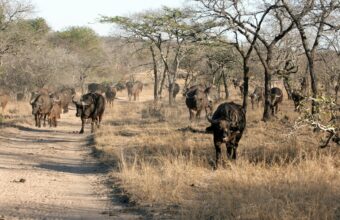
Thornybush Game Reserve
Best for: Luxury lodges and the Big Five
For many years, Thornybush was a fenced reserve which meant the management could guarantee the presence of many large mammals, but it also prevented the wildlife from moving freely between the reserve and Kruger itself. It also meant that the reserve lacked a little of the wilderness feel. The good news is that the fences have come down and, with its top-end lodges, acclaimed guides and a better than average chance of seeing cheetah (as well as many other flagship animals), Thornybush can now rightly hold its head up high as one of the best of the Kruger area’s private reserves.
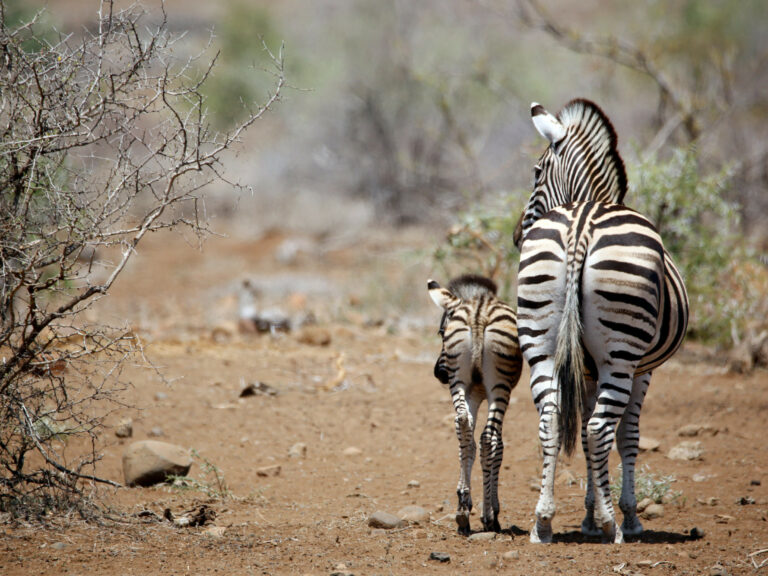
Timbavati Game Reserve
Best for: The Big Five and photography
This magical private reserve borders the main Kruger park and, with no fences to block access, it hosts all the main mammal and bird species that Kruger is famed for. What really puts Timbavati on the map is its very rare population of naturally white lions. Lions with such a genetic mutation can only be found in one or two other places in Africa. In 2017, the last white lion in the region died. However, in March 2018, a cub was born with the pigmentation, meaning the legend lives on.
Timbavati is known for its high-quality guides, wide range of safari activities, and superb, high-end lodges with a heavy dose of romance.
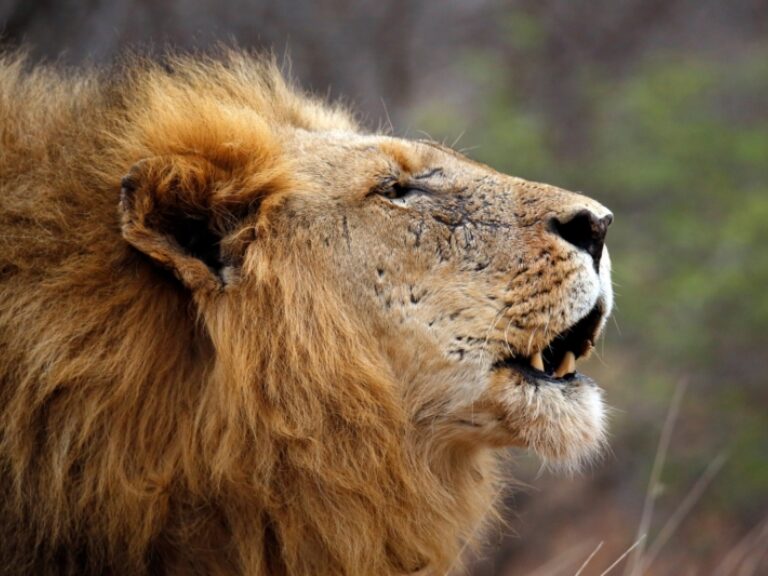
Balule Nature Reserve
Best for: The Big Five and luxury lodges
Sprawling across 250 sq km, the unfenced Balule Nature Reserve sits on the edge of the greater Kruger ecosystem with the Drakensberg escarpment as a memorable backdrop. The reserve is home to the Big Five as well as large numbers of hippo. There is also excellent birding with more than 260 recorded species including hobby falcon and harlequin doves. There are several quality lodges in different price ranges and activities include guided game drives and walking safaris, fishing, wine tasting and visits to a wildlife rehabilitation centre.
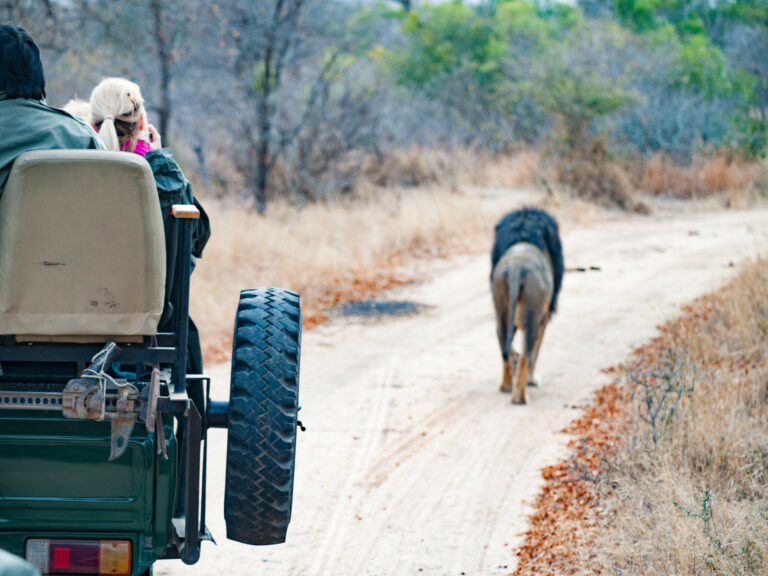
Kapama Game Reserve
Best for: Family friendly holidays and birdwatching
Kapama makes for a good first-time safari destination in the greater Kruger region. A few years ago, the fences that had for so long separated it from Kruger and the surrounding (unfenced) private reserves were taken down. This has done a lot to increase the wilderness feel of the place. There is a good range of safari activities on offer and it’s child-friendly (as child-friendly as anywhere with wild lions can be). One unique feature of a safari here is the reserve’s elephant experience. The reserve has a number of elephants (rescued from elephant-back safaris) and the elephant interaction experience allows you to get close to these not-so gentle giants while a guide explains elephant biology and conservation.
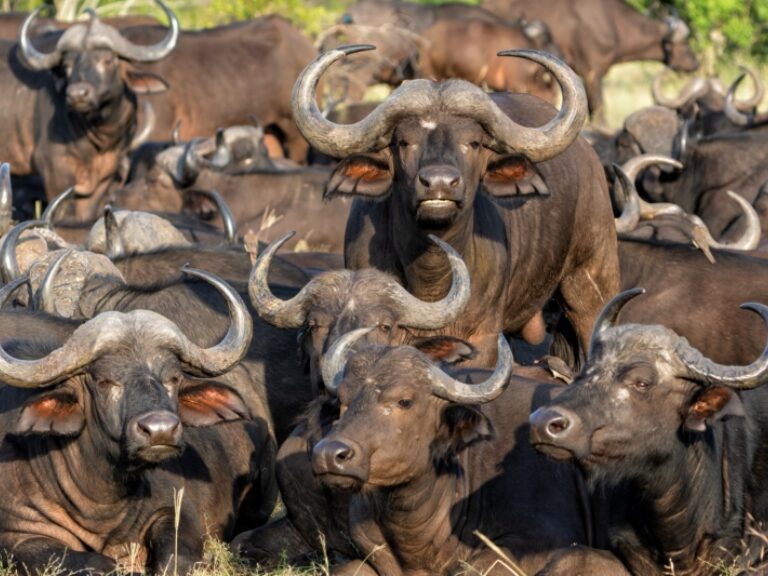
Manyeleti Game Reserve
Best for: The Big Five and family friendly safari
Covering 230 sq km and with an unfenced border with Kruger, Manyeleti, which means Place of the Stars in the local Shangaan language, was the only wildlife reserve that black people were permitted to visit during the apartheid era. Today it welcomes everyone, yet retains an exclusive atmosphere thanks to having only four excellent lodges and camps with accommodation suitable for budget, mid-range and luxury travellers. The reserve hosts all the so-called Big Five and a whole range of Kruger’s other stars.
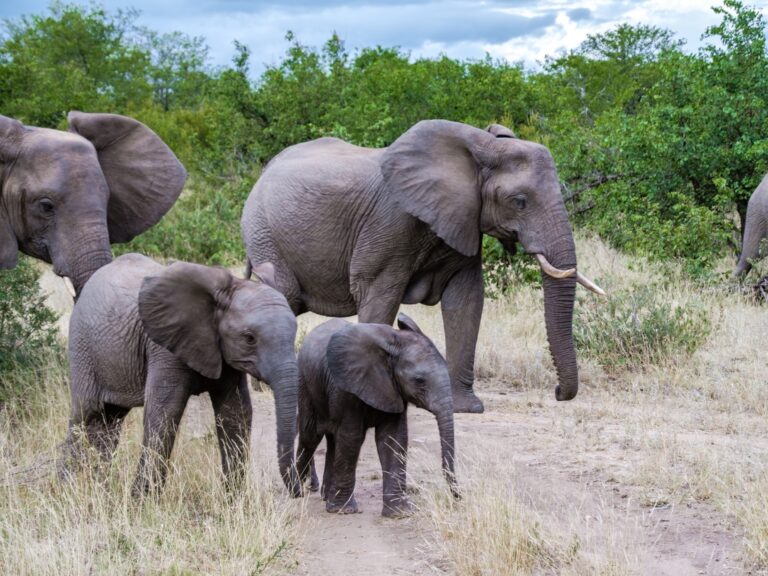
Klaserie Nature Reserve
Best for: Luxury lodges and photography
Covering some 60,000 hectares, the spectacular Klaserie Nature Reserve is one of the largest privately-owned nature reserves in South Africa. The reserve is also deeply committed to environmental education for local children and supports a number of long-term scientific studies. For the tourist, Klaserie combines memorably diverse scenery, including glittering waterways, and an impressive range of wildlife such as rhinos, elephants, lions, hippos and some massive buffalo. The birdlife is equally impressive and one of the scientific projects the reserve supports focuses on the prehistoric-looking ground hornbill. There’s a wide selection of accommodation within Klaserie, all of it very luxurious and intimate in scale, and the sheer size of the reserve means that Klaserie never feels busy — except with wildlife.
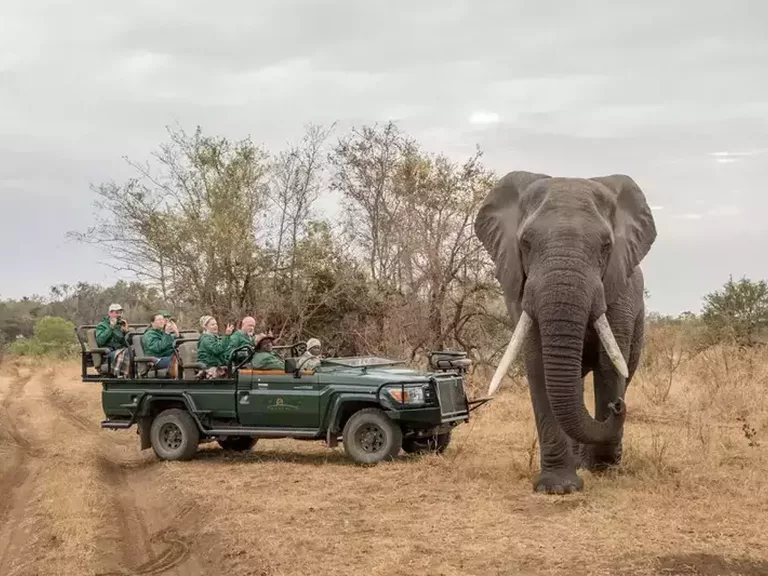
Karongwe Game Reserve
Best for: Birdwatching and the Big Five
Known for offering some of the highest chances of spotting the elusive leopard, Karongwe is a moderately-sized private game reserve hemmed in between four rivers with views of the Drakensberg Mountains. This gives it an unusually lush, green landscape, in contrast to some of Kruger’s drier regions. Other highlights are the superb guided bush walks and exceptional birdwatching (again, thank those rivers). Since there are just five unashamedly luxurious and very small camps, crowds are never an issue here and the quality of the guiding and accommodation is almost unsurpassed in the Kruger area.
featured kruger safaris
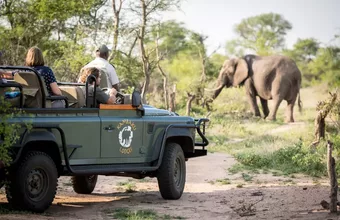
Affordable Greater Kruger Safari Combo
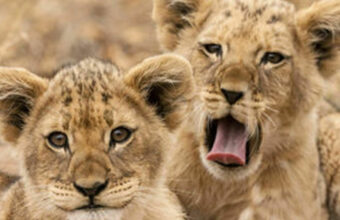
Kruger Safari & Beach
8 days from kruger to mozambique.
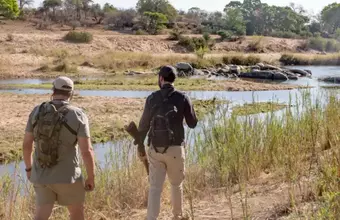
Cape Town & Kruger Luxury Safari
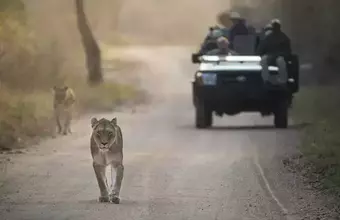
Cape Town & Kruger Family Safari

Lion in Kapama Game Reserve
Safari in Kruger National Park: Need to know
Everything you wish you'd known before you booked.
This is safari made easy — perhaps too easy. A park as good and easy to visit as Kruger attracts a lot of visitors and in high season main routes can be busy. The park’s highly-developed infrastructure also means that it doesn’t always feel all that wild. If this sounds off-putting, fear not.
The park is surrounded by a number of superb private reserves with limited numbers and no self-drives allowed, which means that wild Africa comes growling right up to you. Taking all this into account, whatever sort of safari you’re looking for, Kruger usually comes out on top.
Where to go in Kruger National Park
There’s a massive amount of accommodation in and around Kruger National Park. The park itself caters to all budgets, from hardcore bush campers to lodges with a luxury royal seal (and a price tag to match). In general, the finest accommodation and best safari guides can be found in the exclusive private reserves bordering Kruger itself. The prices quoted by such places might appear steep but keep in mind that they generally include all activities including guided safaris in state-of-the-art vehicles, meals and most drinks, plus the conservation fees that help maintain such wilderness areas.
Some suggested top-end places include Singita Lebombo Lodge and the Rzoyal Malewane, both of which are in the Kruger National Park itself. You can’t really go wrong with any of the accommodation in the private reserves but some worth building your safari around include Thornybush Waterside Lodge in the Thornybush Game Reserve, Kapama River Lodge in the Kapama Game Reserve, and the Klaserie Sands River Camp and Makumu Private Game Lodge, both in Klaserie.
Safari by foot
For the ultimate in Kruger adventures, try a short bush walk led by an expert walking safari guide in one of the private reserves or, for something even more thrilling, set out to hike one of the multi-day wilderness trails established by park authorities. There’s no better way to get to know wild Africa than by walking, which gives you the ability to touch, smell, taste, hear and sense the African bush in a way that’s never possible in a vehicle safari.
Kruger wildlife
One of the great parks of Africa, Kruger and the surrounding private reserves are home to all of southern Africa’s iconic mammal species including the famed Big Five — buffalo, elephant, lion, leopard and rhino. This is also a great park for giraffe, zebra, cheetah and even wild dogs. The sheer quantity of animals seen on a safari trip here can be mind-boggling.
There are tens of thousands of impala and blue wildebeest and, despite sustained recent poaching, there are still thousands of white rhino (plus some black rhino). The lion population is somewhere around thousand and elephants are doing exceptionally well, with some 13,000 present (which is about double the park’s real carrying capacity). In total, some 140 mammal species are known to live in and around the Kruger eco-systems, which makes it one of the most mammal-rich parks in the world.
The diverse habitats, which include thorn tree woodlands and shrub mopane veld, river valleys lined by tropical forest and searing granite kopjes (hills), supports an even more impressive array of birdlife. More than 500 different species of birds have been recorded in Kruger.
Kruger's hidden gems
Anthony Ham
Kruger may be busy, but it’s so big that you can still spend time alone with a lone leopard wandering along a quiet riverside track. As a general rule, I enjoy Kruger the further north I go: in the wild north, I’d happily live out my safari days looking for birds and lions that still seem surprised to see a vehicle.
When to visit Kruger National Park
Key wildlife viewing times are between June and September when the drier winter weather causes animals to congregate around water sources, and the March to May rutting season when male wildebeest, impala and other antelope butt heads over the ladies. Overall, June is probably the best month to visit. Wildlife activity is intense, but with school holidays yet to begin, human activity remains light and accommodation is cheaper.
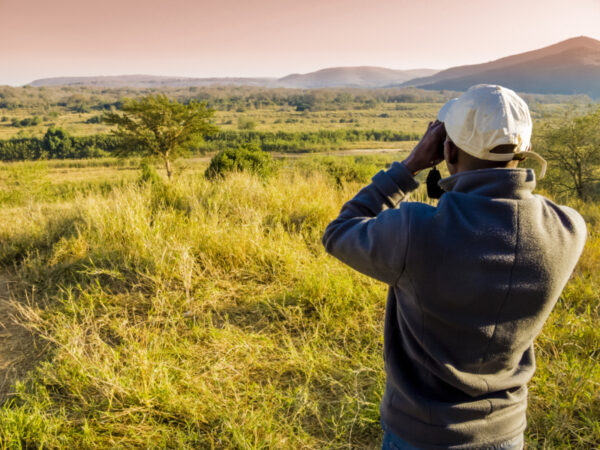
When to go on safari in South Africa
Blessed with incredible geographical diversity, South Africa is truly a year-round destination…
Kruger safari FAQs
Your questions, our expert answers, can you recommend any mid-luxury accommodation in kruger we don't need top luxury but happy to splurge a bit..
Most of the accommodation actually within Kruger National Park is run by the park authorities - great locations, but the accommodations are fairly basic and very busy. If you want to splash out, this is probably not what you're looking for.
Consider instead one of the private reserves (conservancies) that sit alongside Kruger - they have much the same wildlife, but way more choice when it comes to accommodation, and fewer visitors and vehicles. I've always enjoyed Timbavati Nature Reserve and Shindzela - I saw all the big five in one afternoon here!
The best safaris in Sabi Sands
About the author.
Stuart is an award-winning travel journalist covering safari, trekking and conservation in Africa for the Lonely Planet, Rough Guides, BBC, Bradt Travel Guides, amongst many others. He is the author of Walking With The Maasai , a journey through some of Kenya's lesser-visited Maasai lands.
Featured tours

Kruger Safari Packages
Mobile camping & walking safaris.

Jewels of South Africa
13 day small group tour of south africa.

Wonders of South Africa
15 days from port elizabeth to kruger.
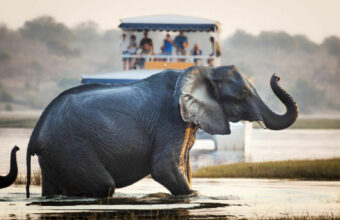
Ultimate African Taster
15 days from victoria falls to cape town.

Featured tours View all
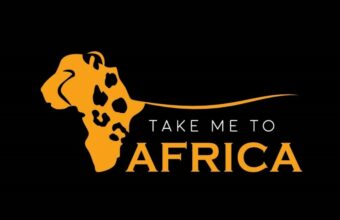
Why Horizon Guides?

Impartial travel guides
Our guides are written by the leading experts in their destinations. We never take payment for positive coverage so you can count on us for impartial travel advice.
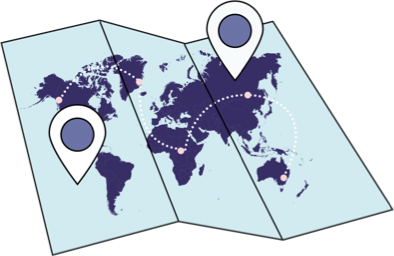
Expert itineraries
Suggested itineraries and routes to help you scratch beneath the surface, avoid the tourist traps, and plan an authentic, responsible and enjoyable journey.

Specialist advice
Get friendly, expert travel advice and custom itineraries from some of the world's best tour operators, with no spam, pressure or commitment to book.
Our guides are 100% impartial and are written by independent, professional travel journalists. We make money by charging carefully-screened travel companies to list their business on our website. Our advertisers have no influence on our editorial content and we never accept payment for positive coverage.
Read more about how we work and what we believe in here .
- Travel guides
- Work with us
Sitemap , Privacy Copyright © 2024 Horizon Guides
- Testimonios
- Por Qué Con Nosotros
- Términos y Condiciones
- Países
- Sudáfrica
- Alojamientos
- Actividades
Johannesburgo
Ciudad del cabo, parque kruger.
- Grootbos Nature Reserve
Ruta Jardín
- Reserva de Madikwe
- Stellenbosch
- Ciudad de Knysna
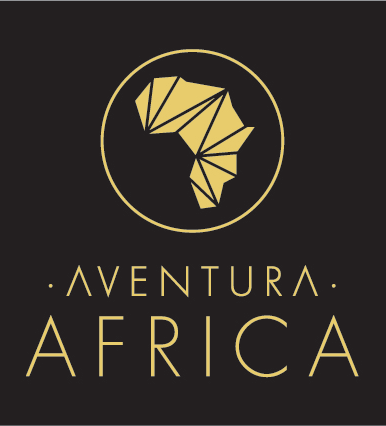
- Dirección
- · Inicio Inicio
- · Viajes a África
- · Viajes a Sudáfrica
- · Viajes a Mauricio
- · Viajes a Seychelles
- · Viajes a Namibia
- · Viajes a Botsuana
- · Viajes a Kenia
- · Viajes a Maldivas
- · Viajes a Mozambique
- · Viajes a Ruanda
- · Viajes a Tanzania
- · Viajes a Zambia
- · Viajes a Zanzibar
- · Destinos en África
- · Sudáfrica
- · Mozambique
- · Seychelles
- · Testimonios Testimonios
- · POR QUÉ CON NOSOTROS POR QUÉ CON NOSOTROS
- CONTÁCTANOS
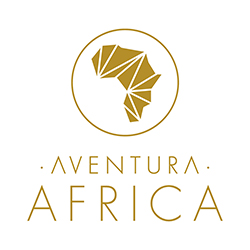
Para obtener una tarifa lo más aproximada posible al precio real, indica la moneda y el país de origen deseados.
2.000.000 hectáreas rebosantes de lujo salvaje , impresionante vida silvestre y zonas de conservación de fauna, la escapada perfecta a una de las legendarias reservas naturales y privadas de toda África. Aproximadamente del mismo tamaño que el conjunto de Israel, un poco más pequeño que Bélgica y básicamente un tercio del tamaño de Irlanda.
Podríamos catalogarlo como enorme y mágico ¡La Reserva Natural de safari más grande de África!
- Información
- Dónde quedarse
- Ver tours y safaris
Más que conocer, somos el Parque Kruger a su imagen y semejanza , expertos residentes y sabios en cualquier detalle que puedas detectar, cómo llegar, qué ver, qué necesitas, cuál es la mejor época de visita…etc. ¡Y mucho más!
Antes de nada deberías saber: El Parque fue proclamado en 1898 inicialmente como la Reserva de Caza Sabie por Paul Kruger , el entonces presidente; propuso por primera vez la necesidad de proteger a los animales salvajes [¡una idea excepcional!] Pero tardó 12 años en proclamarse cuando el área intermedia de los ríos Sabie y Crocodile fueron reservados para la caza restringida. James Stevenson-Hamilton finalmente fue el primer guardián del bosque y fue proclamado el 1 de Julio de 1902. ¡Un lujo poder colaborar con esta vibrante reserva natural!
La Ley de Parques Nacionales fue proclamada el 31 de Mayo de 1926 y con ella la combinación de las Reservas de Caza Sabie y Shingwedzi, y al fin, nació nuestro pasional Parque Nacional Kruger ¡Bienvenido!
336 especies de árboles, 49 de peces, 34 especies de anfibios, 114 de reptiles. 507 de aves y 147 de mamíferos. Leopardos, Leones, Rinocerontes Negros, Búfalos, Elefantes…Se dice que el Parque Nacional Kruger tiene almacenadas más de 48 toneladas de marfil y hay unos 12.000 elefantes en el hábitat.
A su vez, está dividido en 6 ecosistemas: Baobab sandveld, Mopane matorral, Lebombo knobthorn-marula bushveld, Mixto acacia matorral, Combretum-silver clusterleaf, Bosque en granito y Bosque ribereño. Los rangers y guías personales, te mostrarán secretos fascinantes de su fauna y flora, algo que probablemente nunca te hayas detenido a observar; ¡la rutina de un simple escarabajo te hará sentir tan fascinante como el majestuoso rugido de un león!
Nuestro Parque Kruger en sí, hace referencia a un parque repleto de naturaleza sin vallados, pero es mucho más grande y salvaje de lo que nunca podrías imaginar . Los más codiciados e icónicos Big Five de África , los avistarás en primer plano, disfrutarás de safaris realmente sensacionales, ¡incluso realizándolos a pie! con elegantes alojamientos galardonados, Alto Standing internacional y guías privados.
Además, acoge unos 254 sitios de patrimonio cultural, incluidos 125 sitios de arte rupestre, existiendo una amplia evidencia de que el Homo erectus (hombre prehistórico) vivió en el área 100.000 años atrás. Los artefactos culturales de entre 100.000 y 30.000 años atrás, son evidencia de que el hombre de la Edad de Piedra también deambuló por estos recónditos lugares. Los bosquimanos y la gente de la Edad de Hierro de hace unos 1.500 años también estuvieron presentes; existen ruinas arqueológicas importantes en Thulamela y Masorini, ¡Hay numerosos ejemplos de San Rock Art en el Parque!
Seas veterano en safaris o nuevo en este tipo de experiencias, te llevarás un recuerdo de tu viaje, digno por excelencia.
Con nuestra selección de los más célebres tours por este territorio de incalculable valor natural, vivirás la auténtica emoción de safaris, condensada en la más bella flora y fauna del continente africano; con todo tipo de comodidades, seguridad, aventura y estancias de lujo garantizadas. ¡La Reserva dispone de 21 Campamentos de descanso, 2 concesiones privadas de lodges y 15 oportunidades de estancias privadas en pleno safari!
Artículos Relacionados
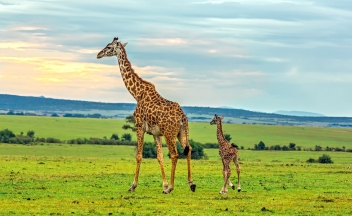
Descubre los secretos del mágico turismo en África. Su hospitalidad y gente, sus maravillas naturales, las típicas joyas artesanales y mucho más.
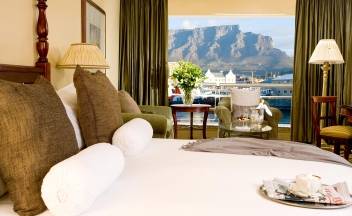
El corazón de · AVENTURA ÁFRICA ·, Ciudad del Cabo te sorprenderá, descubre nuestros mejores hoteles y resorts de lujo.
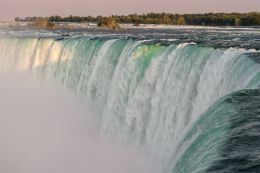
¿Aún no conocéis los destinos Top del Sur de África, familia? Aventuraros al auténtico templo del safari y descubrid la clave de vuestro viaje.
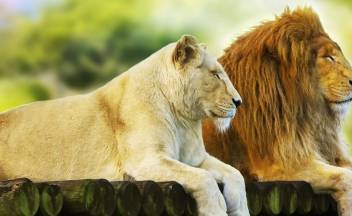
Elige un paquete de viaje personalizado con las tres joyas del Sur de África, sin duda será un placer… ¿Qué mejor para tu Luna de Miel?
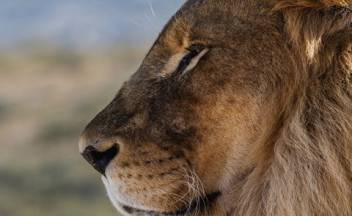
Datos curiosos y útiles para disfrutar África con un auténtico safari. ¡Existen tantas formas de disfrute, que no sabrás definir el ideal!
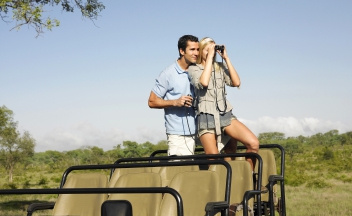
Averiguad nuestro itinerario ejemplo para parejas exigentes a África, imaginarlo, crearlo y nosotros lo diseñaremos a vuestro gusto y medida.
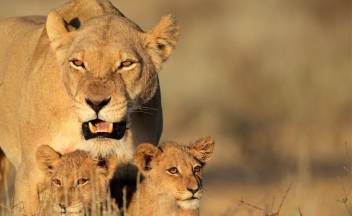
Adéntrate al detalle en el turismo real del Parque Kruger. ¿Sabías que cerca de la reserva se encuentra el espectacular Blyde River Canyon?
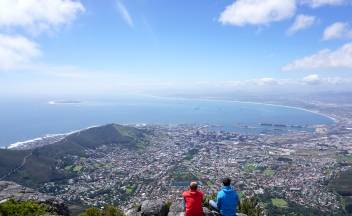
Nueva Ley del Menor 2015. Viajes a Sudáfrica con Menores, Trámites y Documentación, Visados, Vacunas, Pasaportes.
Curiosidades
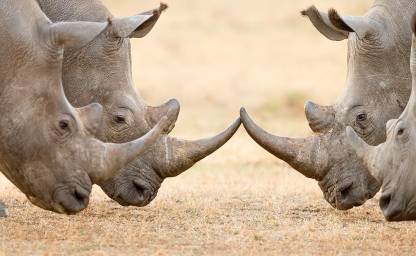
¡Buenas noticias! Nuestro fantástico Parque Kruger es un destino para todo el año. Aunque atraviesa varios flujos estacionales típicos del Sur de África , cada trasformación brinda su propio conjunto de atracciones. En verano, el sol y la lluvia compiten entre sí, las tormentas eléctricas dan luz a las tardes y nacen lindos animales bebés. En otoño, el color marrón reemplaza al verde a medida que la temporada seca avanza.
La temporada seca de invierno se considera el mejor momento para ir a Kruger a disfrutar de actividades de exploración al aire libre, los encuentros con la vida silvestre se intensifican por la escasa vegetación: la falta de agua obliga a los animales a congregarse en las cuencas de agua ¡el mejor momento de visita salvaje! Y finalmente, la primavera, donde la sequía aumenta, y comienza el mejor momento para un safari excelente, ¡además las primeras lluvias avanzan a pasos diminutos!.
Mapa de Sudáfrica
Actividades en sudáfrica.
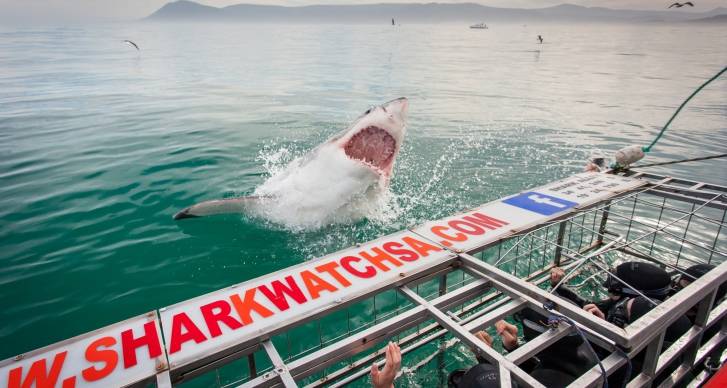
Buceo en jaula con tiburones
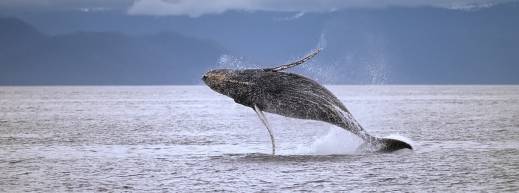
Avistamiento de ballenas
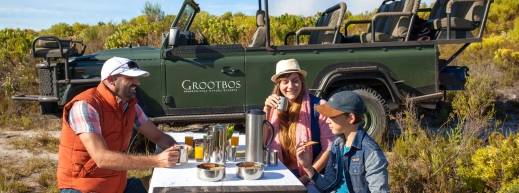
Safari de lujo
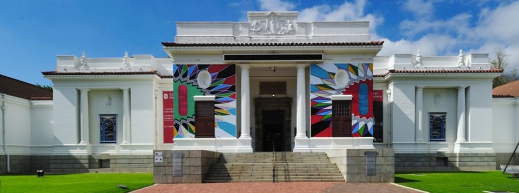
Museos y galerias de arte

Cata de vino
Alojamientos en sudáfrica.
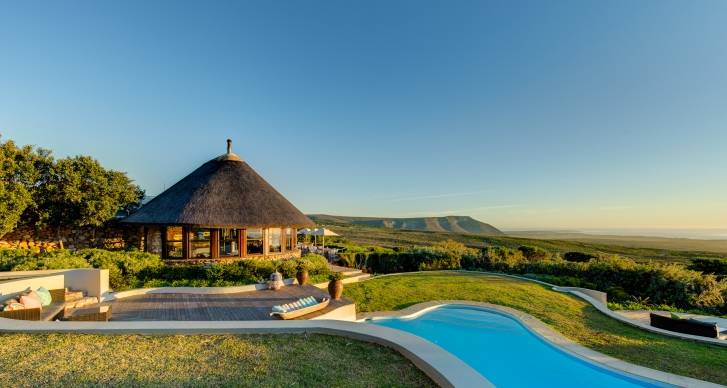
Mosselberg on Grotto Beach
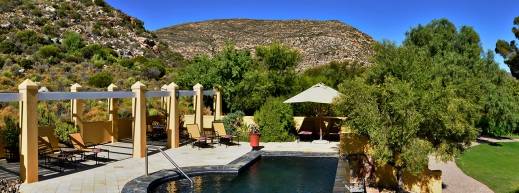
Grand Dédale
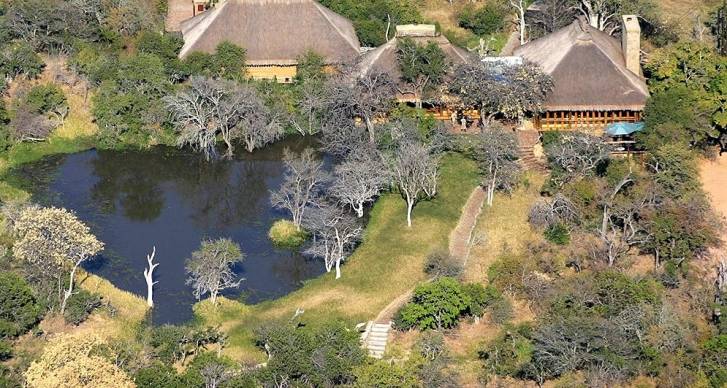
Camp Jabulani
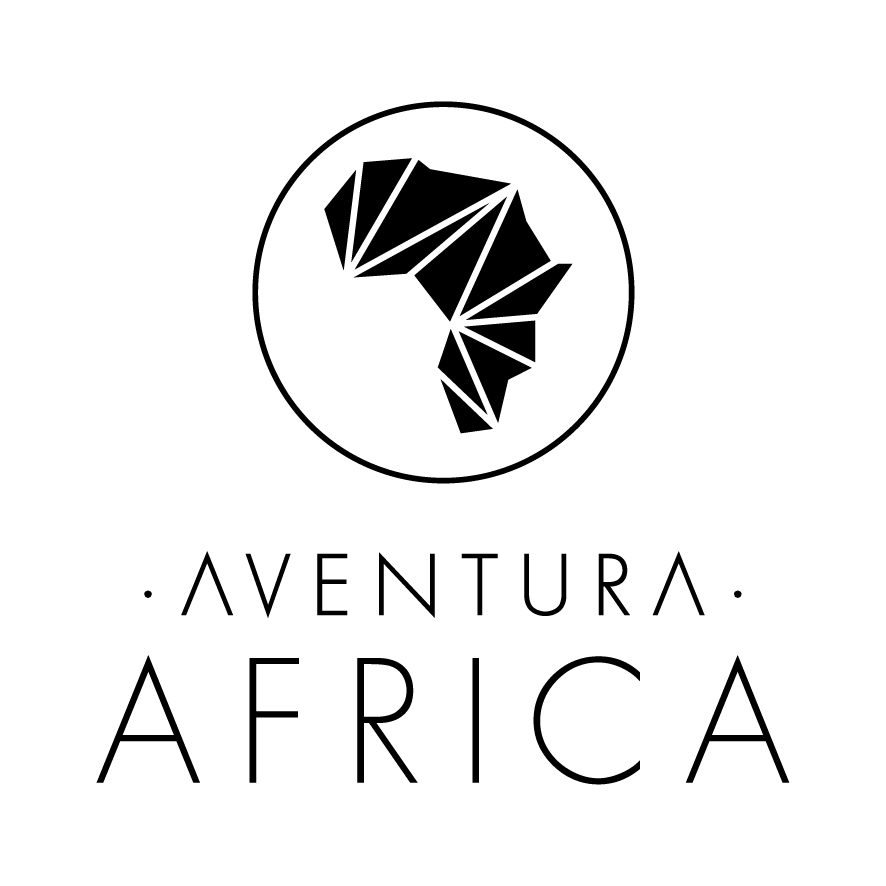
Aventura África, expertos en organizar viajes privados a África, combinamos a la perfección las playas paradisíacas más selectas y los destinos de safari más encantadores del continente, por excelencia.
Compartimos todo lo que es único, cálido y bello de África.
Nuestros viajes son sólo la chispa de tu inspiración, personalizaremos todo lo que desees.
Apasionados por cumplir todo al detalle, nuestros servicios y alojamientos ofrecen experiencias de primera clase.
Lo que dicen nuestros clientes de su experiencia en África
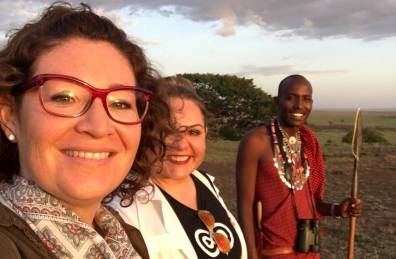
“El mejor viaje de nuestra vida, las palabras quedan cortas para describir lo vivido...”
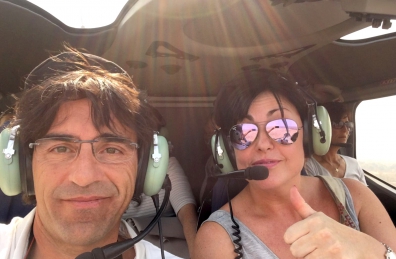
"Mil gracias por todo vuestro trabajo y enhorabuena de verdad, por hacer que los sueños se hagan realidad..."
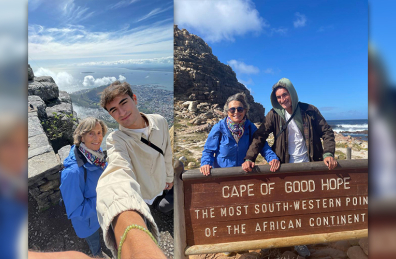
Gracias Jorge y Anri por el viaje tan especial que hemos vivido en todos los sentidos. No ha habido ni un solo fallo, ¡todo perfecto! Isabel y Miguel
Viajes Recomendados
El viaje más estiloso a sudáfrica.
Disfruta de la exquisita gastronomía de Sudáfrica, sus premiados vinos y su fauna a través de safaris únicos.
Descubre la mejor oferta de ocio y cultura de Ciudad del Cabo y haz un safari de lujo en el Kruger National Park donde vivirás una experiencia inolvidable.
Safaris en Kruger y playas de Mozambique
Un viaje muy cómodo que combina el Parque Nacional Kruger en Sudáfrica con el paraíso tropical de la Isla de Bazaruto en Mozambique.
Explora la sabana africana a través de auténticos safaris en todoterrenos, y relájate en las playas vírgenes de arena blanca de Bazaruto.
La forma más auténtica y lujosa de vivir un Safari en África
Otros destinos.
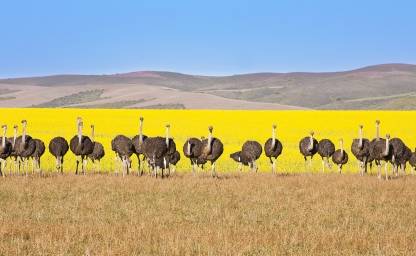
Parque Nacional Kruger | Safaris | Sudáfrica
Safaris en el parque nacional kruger.
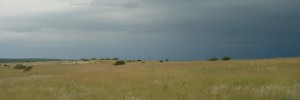
Sobre el Parque Kruger
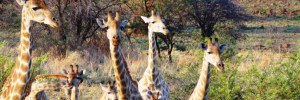
Actividades Imperdibles
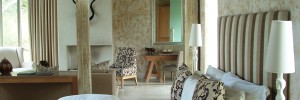
Alojamiento en Parque Kruger
Información sobre kruger - lo más buscado.
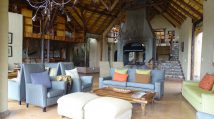
Zona sur de Kruger – Lukimbi Lodge
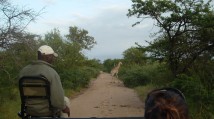
Safaris en Español
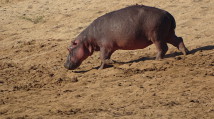
Galería de Fotos
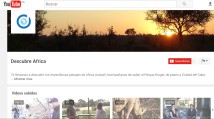
Videos de actividades y lodges
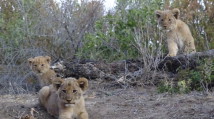
Cuántos días en Kruger?
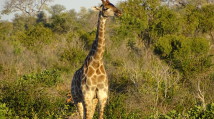
Dentro o fuera del Parque?
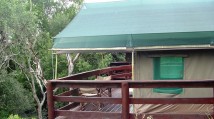
Campamentos de Lujo
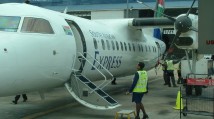
Aeropuertos en Kruger
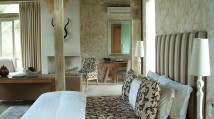
Cotizaciones en Español
Parque nacional kruger....
…hogar de los 5 grandes: Elefante, Rinoceronte, León, Leopardo y Búfalo.
… 2 millones de hactáreas de naturaleza salvaje
…336 especies de árboles, 49 de peces, 34 de anfibios, 114 de reptiles, 507 de aves y 147 de mamíferos
© 2024 Parque Nacional Kruger | Safaris | Sudáfrica. All Rights Reserved.

10% OFF 4-day Kruger Park SAFARI
The first private lodge in the kruger park, luxury right inside the kruger national park.
Experience an authentic, unfiltered safari like never before on this 4 day safari at Jock Safari Lodge, located within the Kruger National Park.
Private lodges inside the Kruger enjoy special benefits like driving off-road to track the BIG 5. Your stay with us includes 2x daily game drives.
The camp is made up of only 12 thatched luxury suites.
The rooms in the camp each have their own private deck and private plunge pool.
Location and getting here
The nearest airport is Skukuza Airport (SZK). It is approximately a 45min flight from Johannesburg airport (JNB), and a 2.5h flight from Cape Town (CPT). Once at Skukuza airport, a road-transfer of 1 hour will have you at the lodge, inside the Kruger National Park. Firstly, we'll handle everything including your lodging, flights and transfers!

Our 5-star service
1 Place your enquiry. Be sure to include number of travelers, dates and whether you require flights and/or transfers
2 A reservations agent will liaise with you directly to coordinate all the details of your trip.
3 You'll receive a provisional booking via email. Complete payment and you're ready to travel!

Our reviews from TripAdvisor
Read unfiltered reviews of guests who have stayed with us at Jock Safari Lodge
ONLY 12 UNITS AT LODGE
Main jock with private deck and plunge pool.
Air Conditioning Private Minibar Hairdryer Tea & Coffee making Facilities Private Plunge Pool Ball & Claw bath on private deck International Dial Telephone Electronic Safe Ceiling Fan En-Suite Bathroom, with Outdoor Shower Sala (Outdoor Day Bed) overlooking the River
SPECIAL: 4 DAY package in MAIN JOCK suite
Come and visit the magnificent jock safari lodge.

Passing Thru Travel
A Guide to the 10 Best Safari Experiences in Africa
Posted: February 20, 2024 | Last updated: February 20, 2024
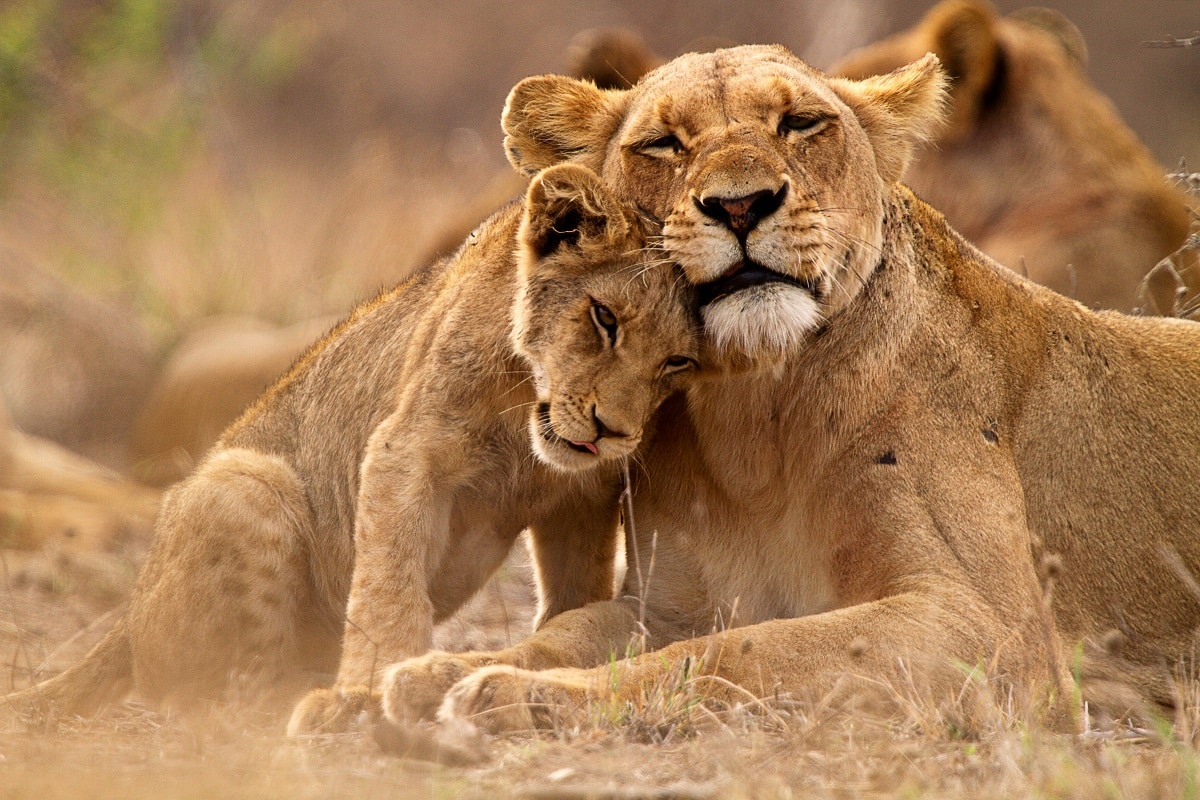
Embarking on an African safari is an experience like no other. The continent’s vast and diverse landscapes, rich wildlife, and unique cultural heritage make it a dream destination for nature and adventure enthusiasts. From the savannas of the Serengeti to the deltas of Botswana, each safari destination offers a unique glimpse into the wild heart of Africa. This guide will take you through ten of the best safari experiences in Africa, providing insider tips to help you make the most of your adventure.
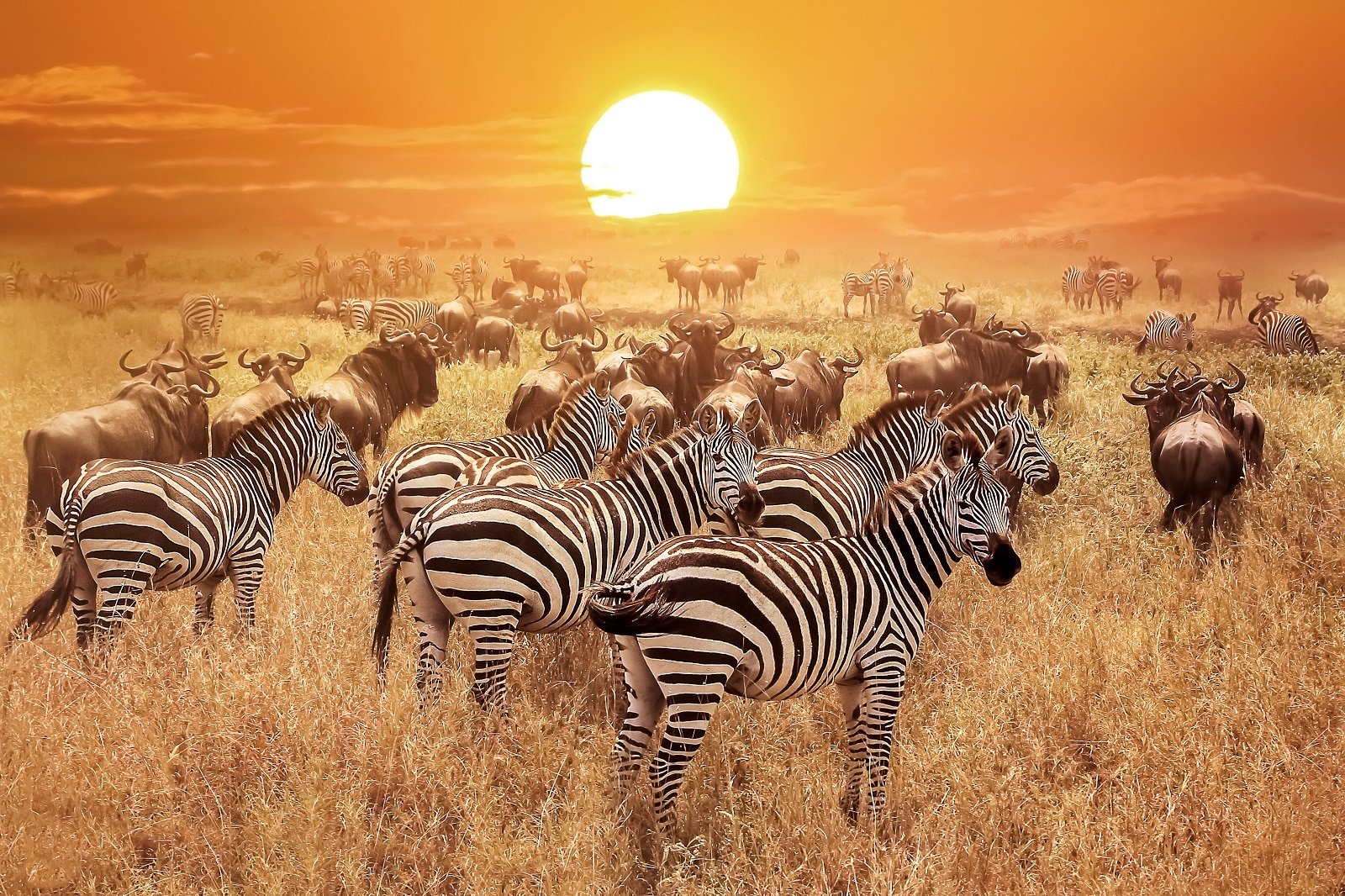
Serengeti National Park, Tanzania
In the Serengeti National Park, you’ll witness the quintessence of the African savanna. The vast open plains are home to the Great Migration, an awe-inspiring natural spectacle where millions of wildebeest and zebras journey in search of greener pastures. The park’s diverse habitats, including riverine forests and swamps, are teeming with wildlife, from lions and leopards to giraffes and elephants. For a unique experience, plan an early morning hot air balloon ride, providing a stunning aerial view of the plains at sunrise.
Insider’s Tip: Book a hot air balloon safari for an unforgettable aerial view of the migration.
When To Travel: June to October for the migration; January and February for the calving season.
How To Get There: Fly to Kilimanjaro International Airport, then a local flight to the Serengeti.
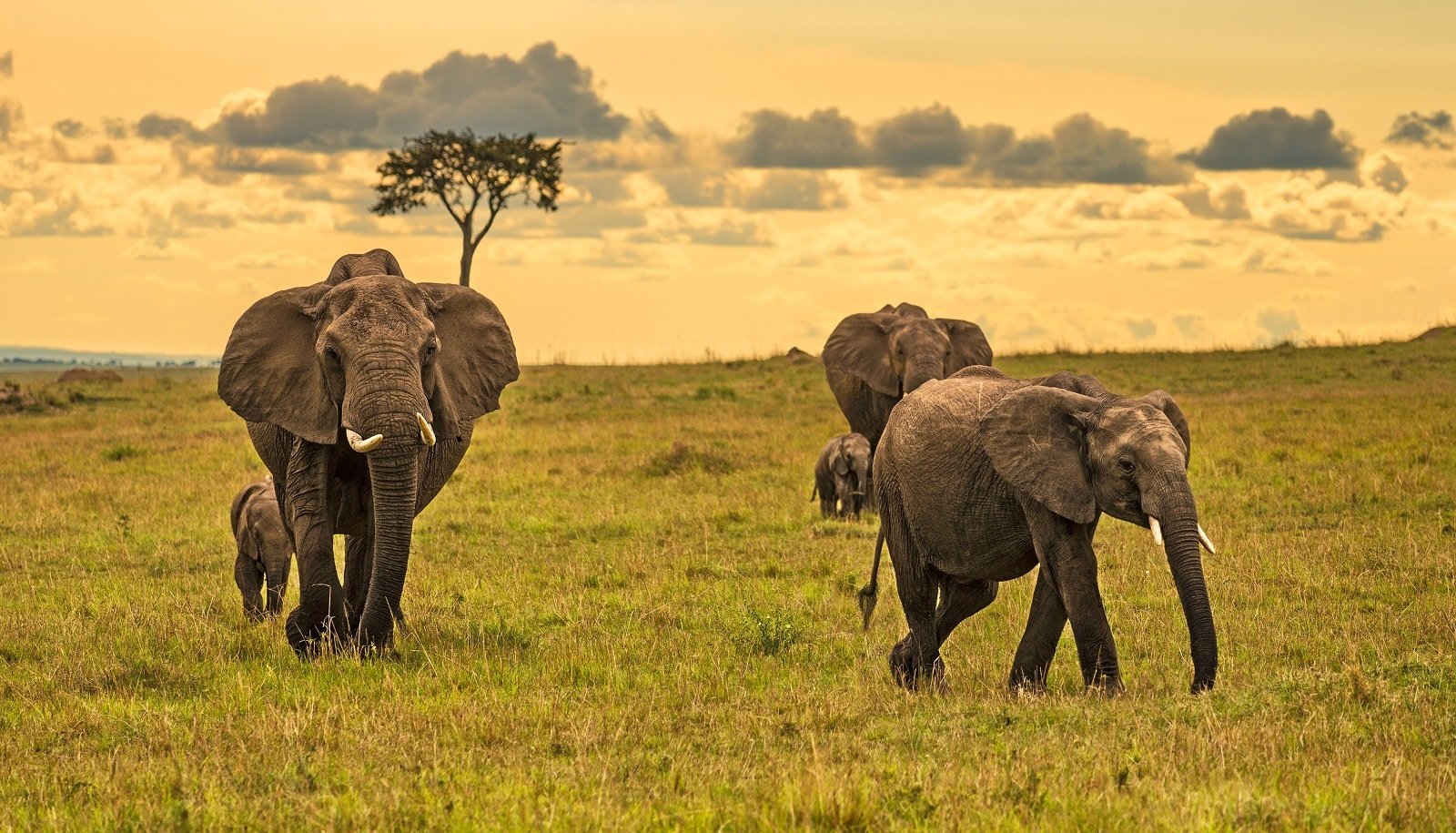
Maasai Mara National Reserve, Kenya
In the Maasai Mara, you’ll experience one of Africa’s most abundant wildlife reserves. It is best known for the migration period when massive herds cross the Mara River. However, it’s also home to the Big Five and an excellent location for spotting predators in action. The Mara’s landscape of rolling grasslands and acacia woodlands adds to its charm. Consider visiting a local Maasai village for a cultural insight into the lives of the indigenous community.
Insider’s Tip: Visit a Maasai village for a cultural experience.
When To Travel: July to October for the migration.
How To Get There: Fly to Nairobi, followed by a local flight or drive to the reserve.
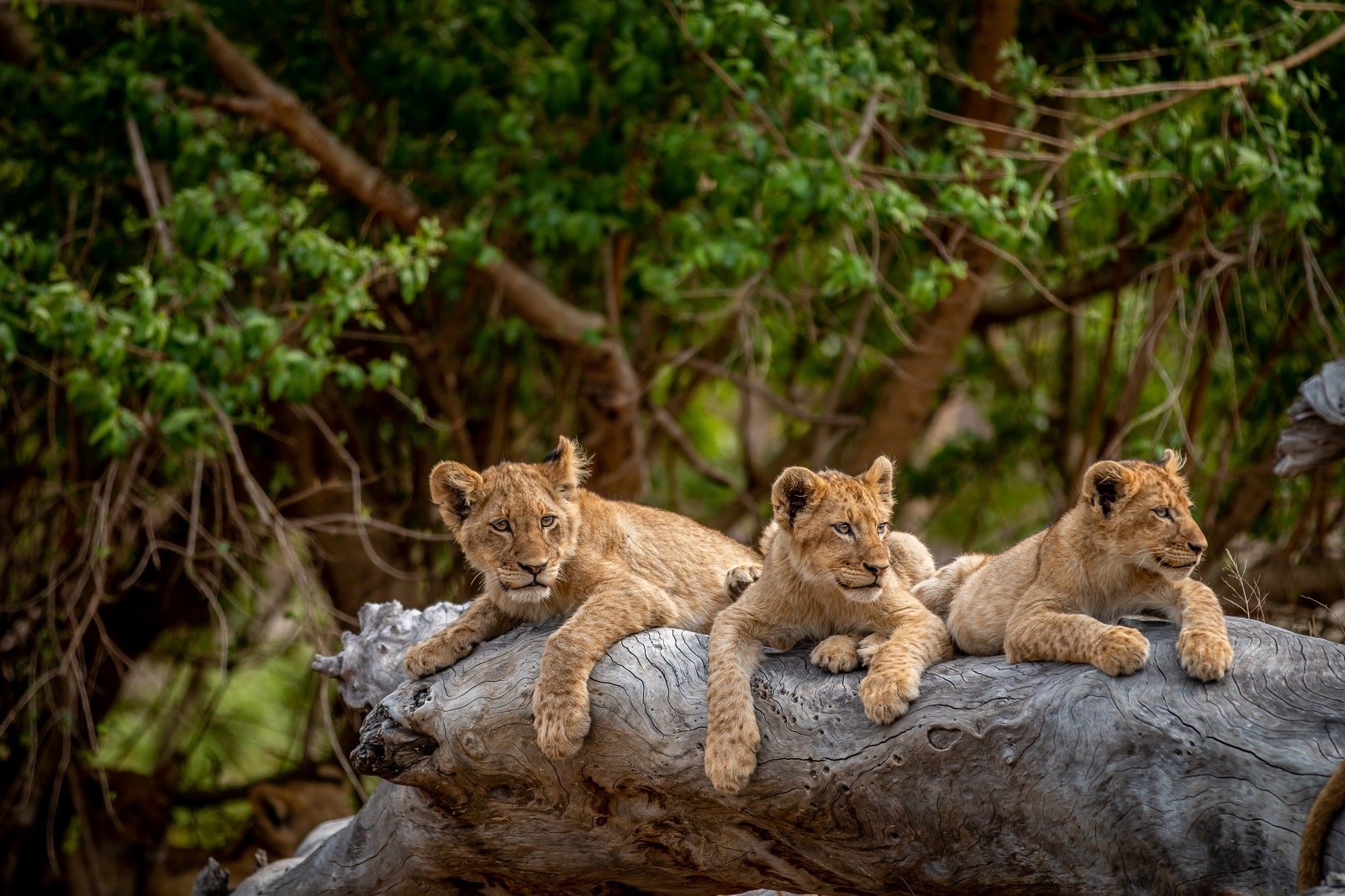
Kruger National Park, South Africa
Kruger National Park offers a more accessible safari experience without skimping on wildlife diversity. It’s one of the best places to self-drive, giving you the freedom to explore at your own pace. The park is home to a vast array of animals, including the Big Five, and has a well-developed infrastructure, making it ideal for first-time safari-goers. Stay in one of the park’s private lodges for a more secluded experience and expert-led game drives.
Insider’s Tip: Stay in one of the park’s private lodges for exclusive game drives.
When To Travel: May to September for dry season game viewing.
How To Get There: Fly to Johannesburg, drive to Kruger, or take a local flight to nearby airports.
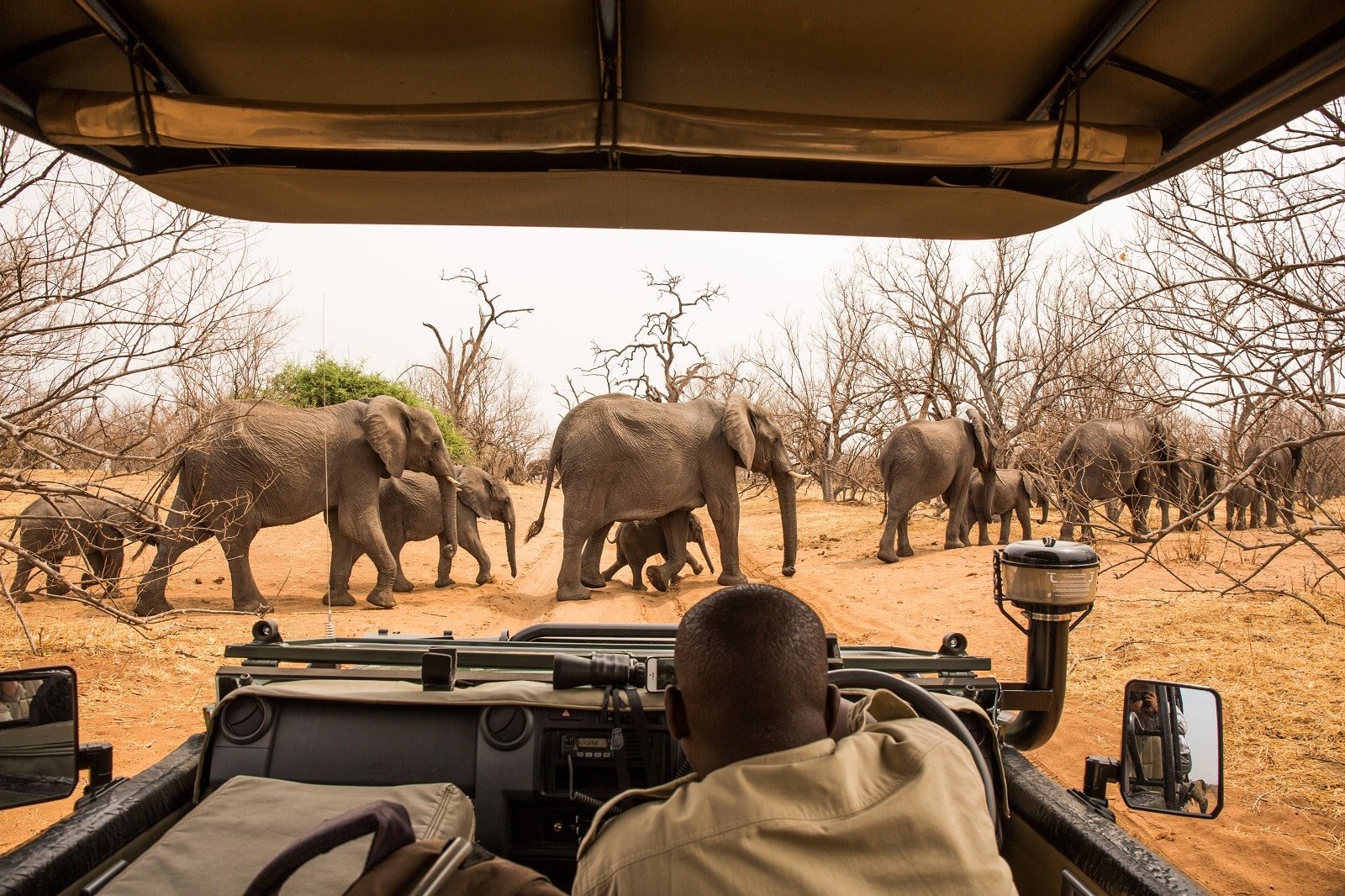
Chobe National Park, Botswana
Chobe National Park is renowned for its large elephant population and river safaris on the Chobe River. These unique water-based safaris offer a different perspective and the opportunity to see a variety of aquatic wildlife and birds. The park’s proximity to Victoria Falls makes it easy to combine your safari with one of the world’s most spectacular natural wonders. The dry season brings large concentrations of wildlife to the riverbanks, making for exceptional game viewing.
Insider’s Tip: Combine your visit with a trip to Victoria Falls.
When To Travel: May to October for the dry season.
How To Get There: Fly to Kasane Airport or drive from Victoria Falls or Livingstone.
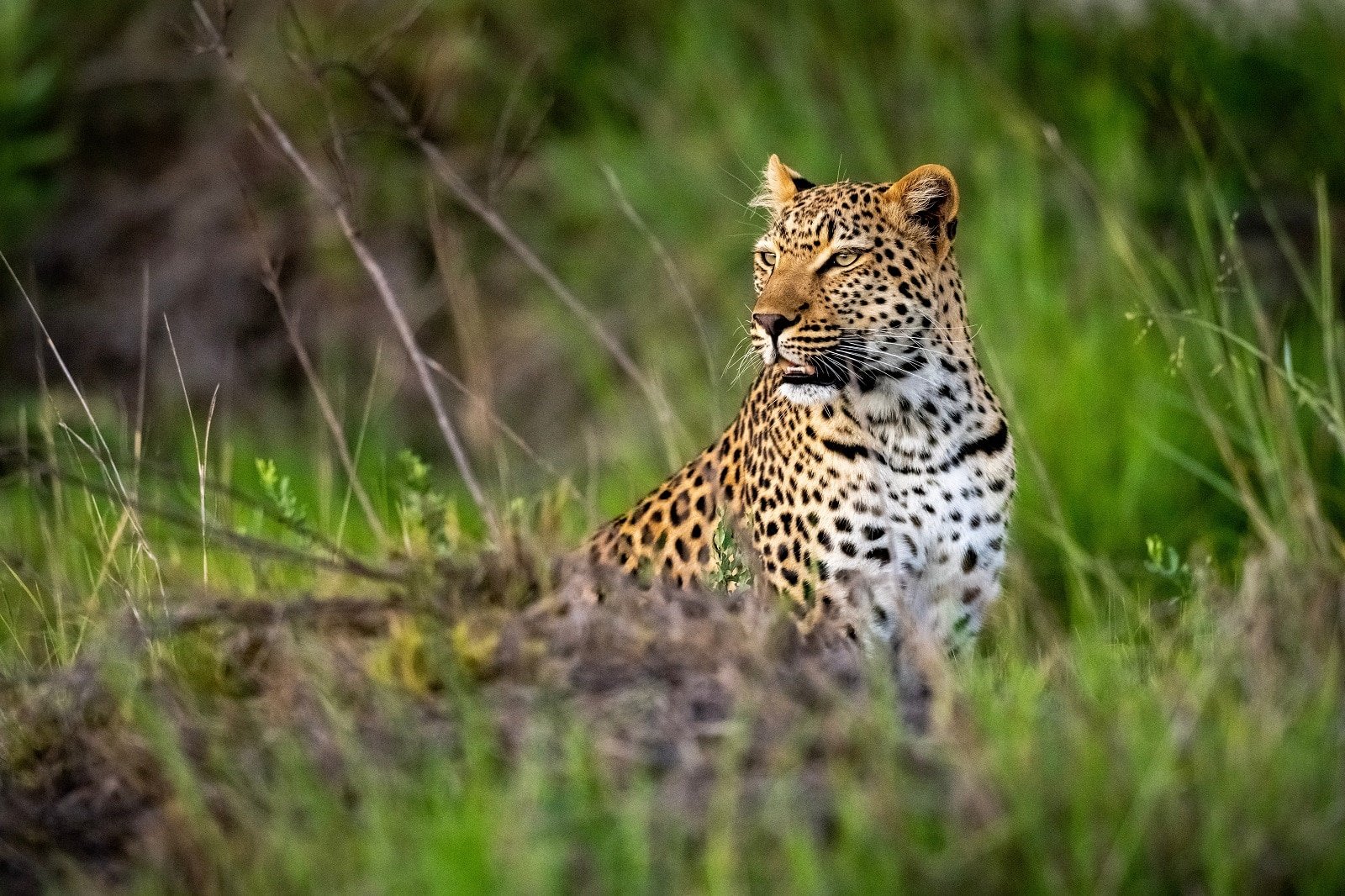
Okavango Delta, Botswana
The Okavango Delta is a unique wetland within a desert, offering an unparalleled safari experience. The annual flooding of the delta creates a lush habitat for a diverse array of wildlife. Exploring the delta by mokoro, a traditional dugout canoe, is a serene and intimate way to experience this unique ecosystem. Staying in a bush camp on one of the delta’s islands provides an immersive wilderness experience.
Insider’s Tip: Book a bush camp on one of the delta’s islands.
When To Travel: July to October for the flood season.
How To Get There: Fly to Maun Airport, then take a charter flight to the delta.
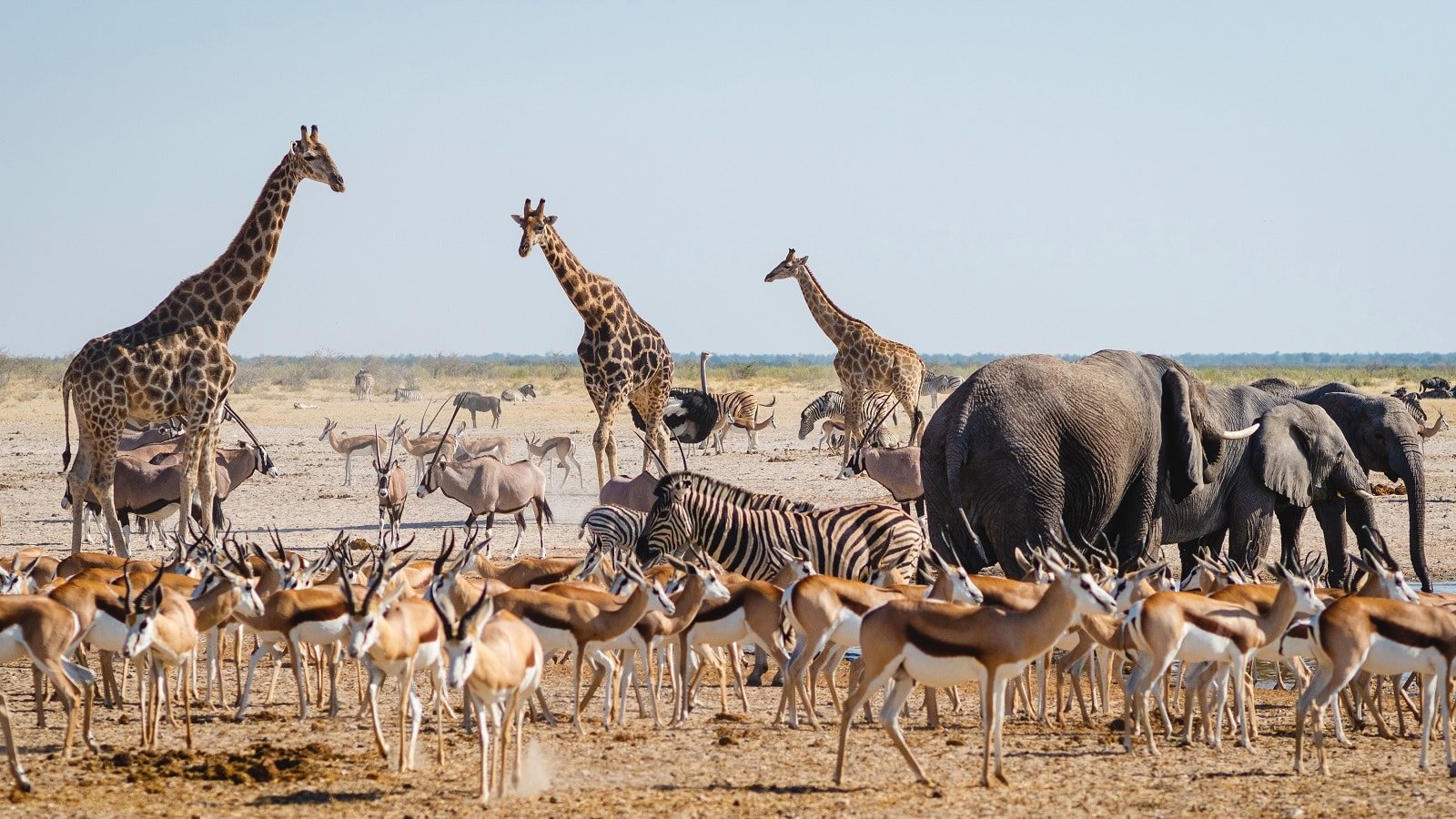
Etosha National Park, Namibia
Etosha National Park is centered around the vast Etosha Salt Pan, providing a unique backdrop for wildlife viewing. The park’s numerous waterholes attract a variety of animals, particularly during the dry season, making it an excellent location for photographers. Night-time game viewing at the waterholes offers a chance to see nocturnal species and unique animal behaviors not typically observed during the day.
Insider’s Tip: Stay inside the park for night-time waterhole viewing.
How To Get There: Fly to Windhoek, then drive or take a local flight to Etosha.
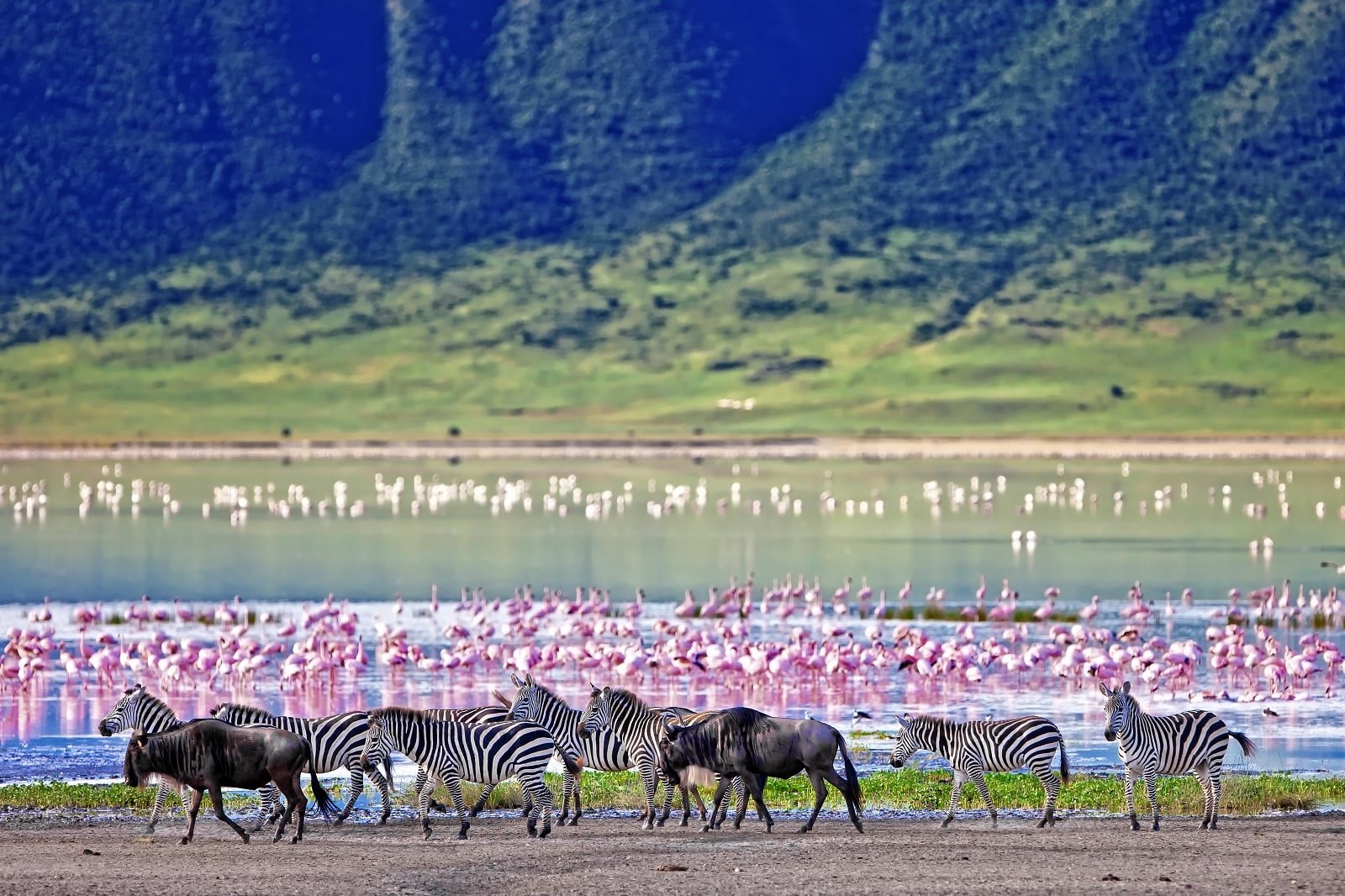
Ngorongoro Crater, Tanzania
The Ngorongoro Crater offers a once-in-a-lifetime safari experience. As you descend into the world’s largest inactive, intact, and unfilled volcanic caldera, you’ll find an abundance of wildlife in this natural amphitheater. The crater floor is home to over 25,000 animals, including the endangered black rhino. Early morning visits allow for fewer crowds and more active wildlife.
Insider’s Tip: Visit the crater early in the morning to avoid crowds.
When To Travel: June to September for cooler weather and optimal wildlife viewing.
How To Get There: Fly to Kilimanjaro Airport, then drive or take a local flight.
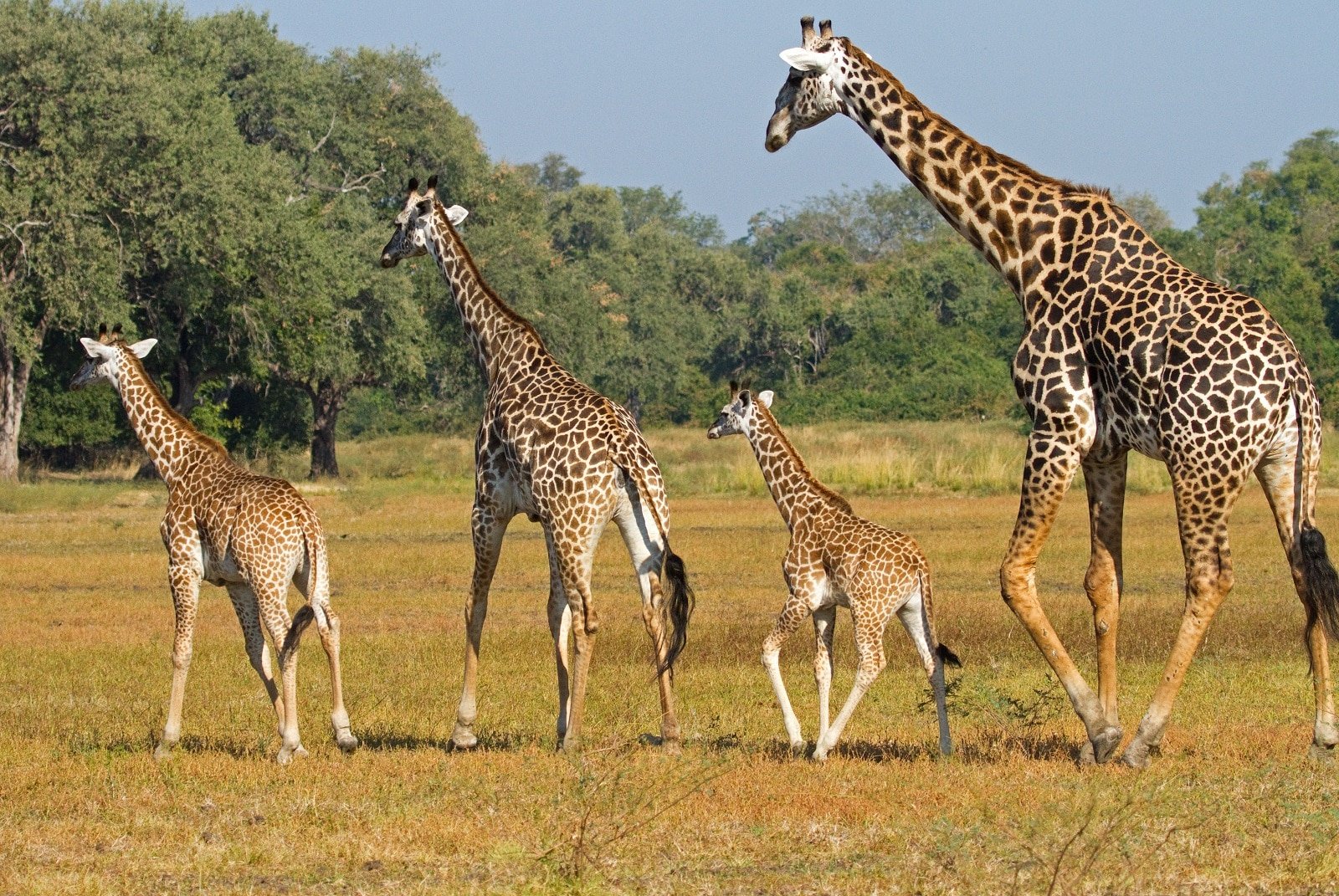
South Luangwa National Park, Zambia
South Luangwa National Park is a haven for those seeking a more adventurous safari. Known as the birthplace of the walking safari, it offers an intimate and immersive experience. The park is renowned for its high-quality guides and exceptional leopard sightings. Night drives here are especially rewarding, with chances to see nocturnal animals like genets, civets, and bush babies.
Insider’s Tip: Try a night drive for a chance to see nocturnal animals.
When To Travel: July to October for the dry season.
How To Get There: Fly to Lusaka, then take a local flight to Mfuwe Airport.
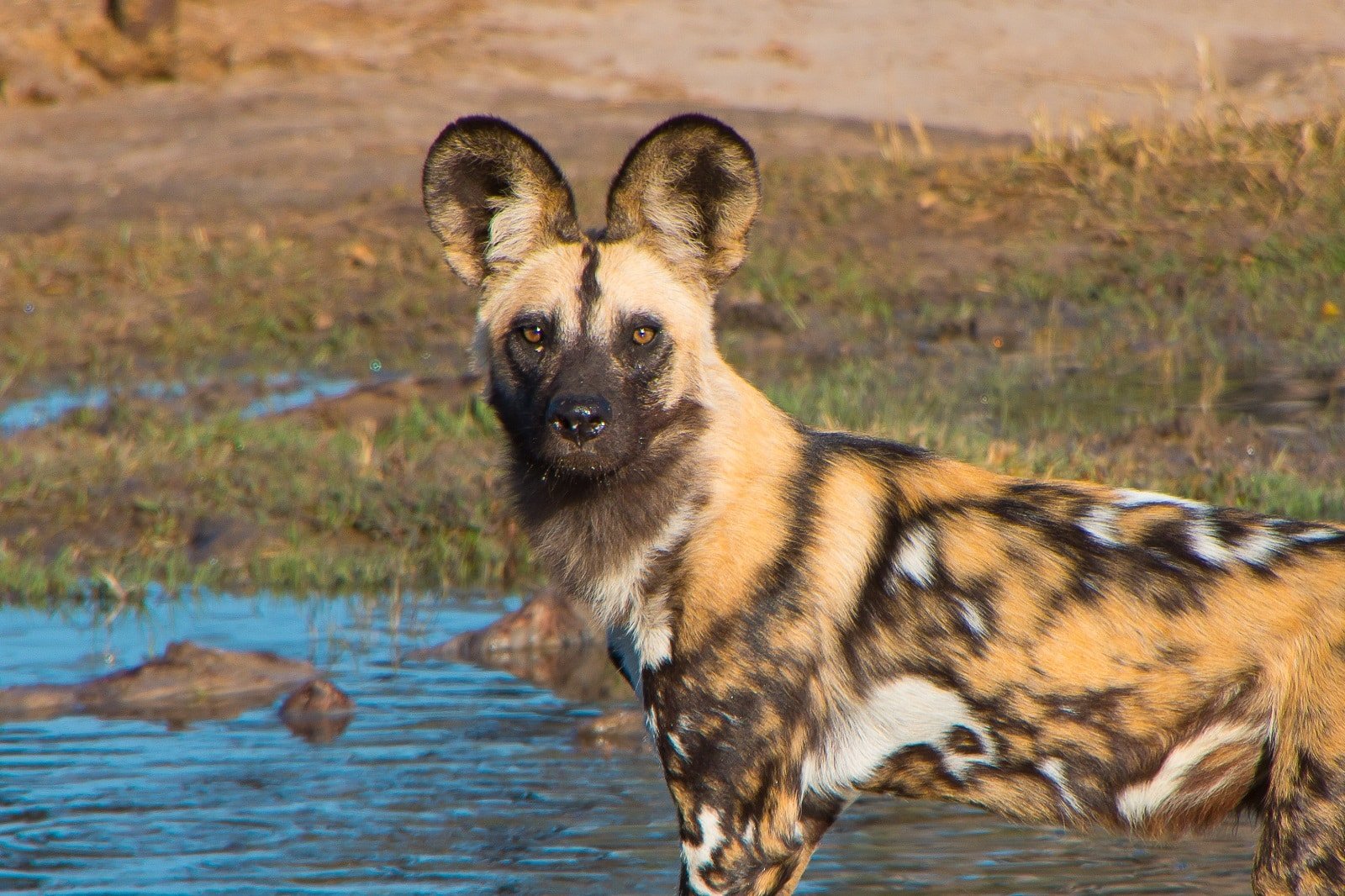
Hwange National Park, Zimbabwe
Hwange National Park, the largest in Zimbabwe, is known for its vast elephant herds and diverse landscapes ranging from desert sands to forests. It’s also one of the best places to see African wild dogs. The park’s numerous waterholes are magnets for wildlife, especially during the dry season, offering superb game viewing opportunities.
Insider’s Tip: Visit the park’s waterholes for excellent game viewing.
How To Get There: Fly to Victoria Falls, then drive to Hwange.
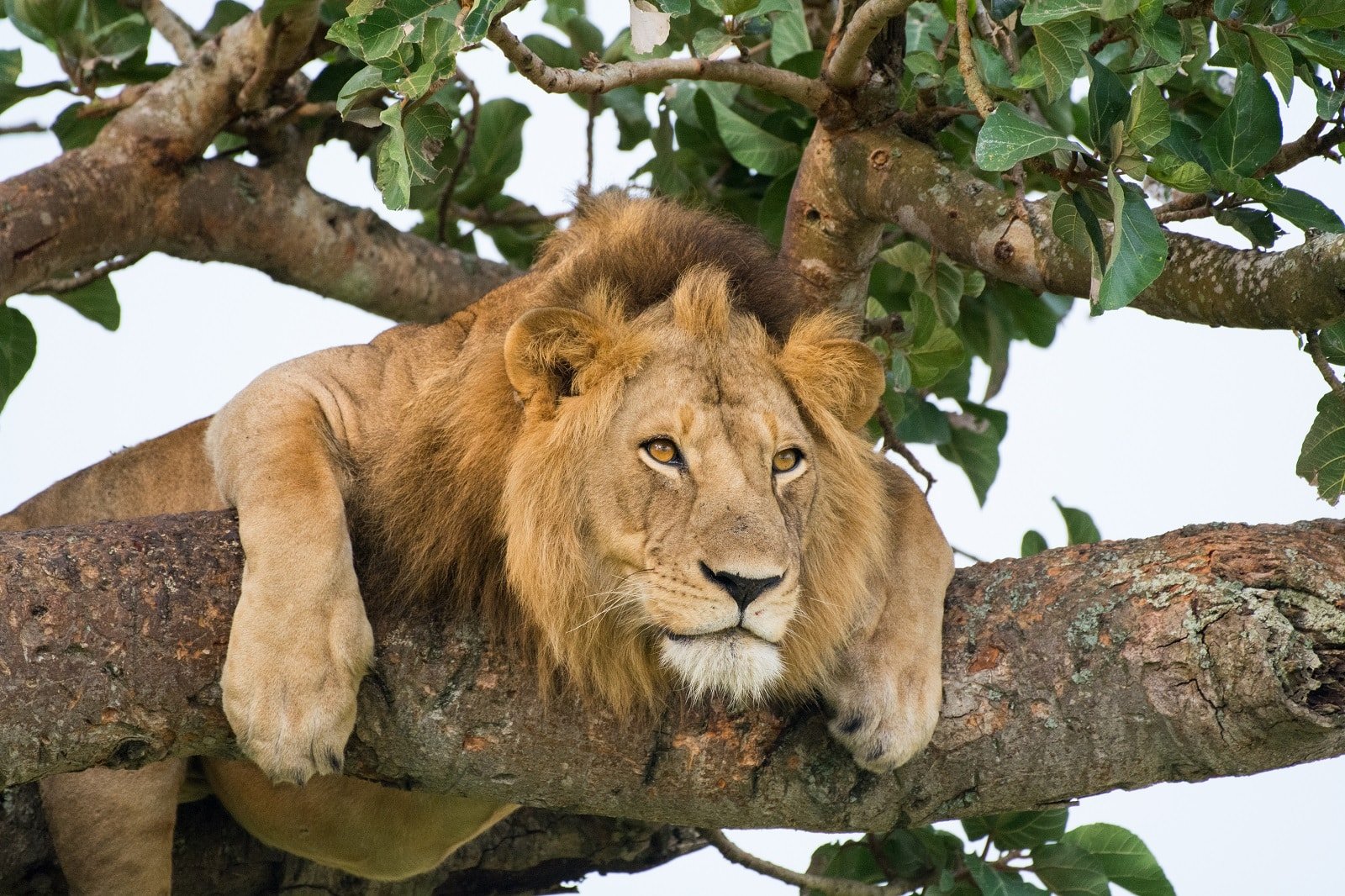
Queen Elizabeth National Park, Uganda
Queen Elizabeth National Park offers a diverse safari experience, with landscapes including savannas, wetlands, and forests. It’s an excellent location for seeing tree-climbing lions and various primates, including chimpanzees. A boat trip on the Kazinga Channel is a must, providing close encounters with hippos, crocodiles, and a variety of water birds.
Insider’s Tip: Take a boat trip on the Kazinga Channel to see hippos and crocodiles.
When To Travel: January to February and June to July for dry weather.
How To Get There: Fly to Entebbe, then drive to the park or take a local flight.
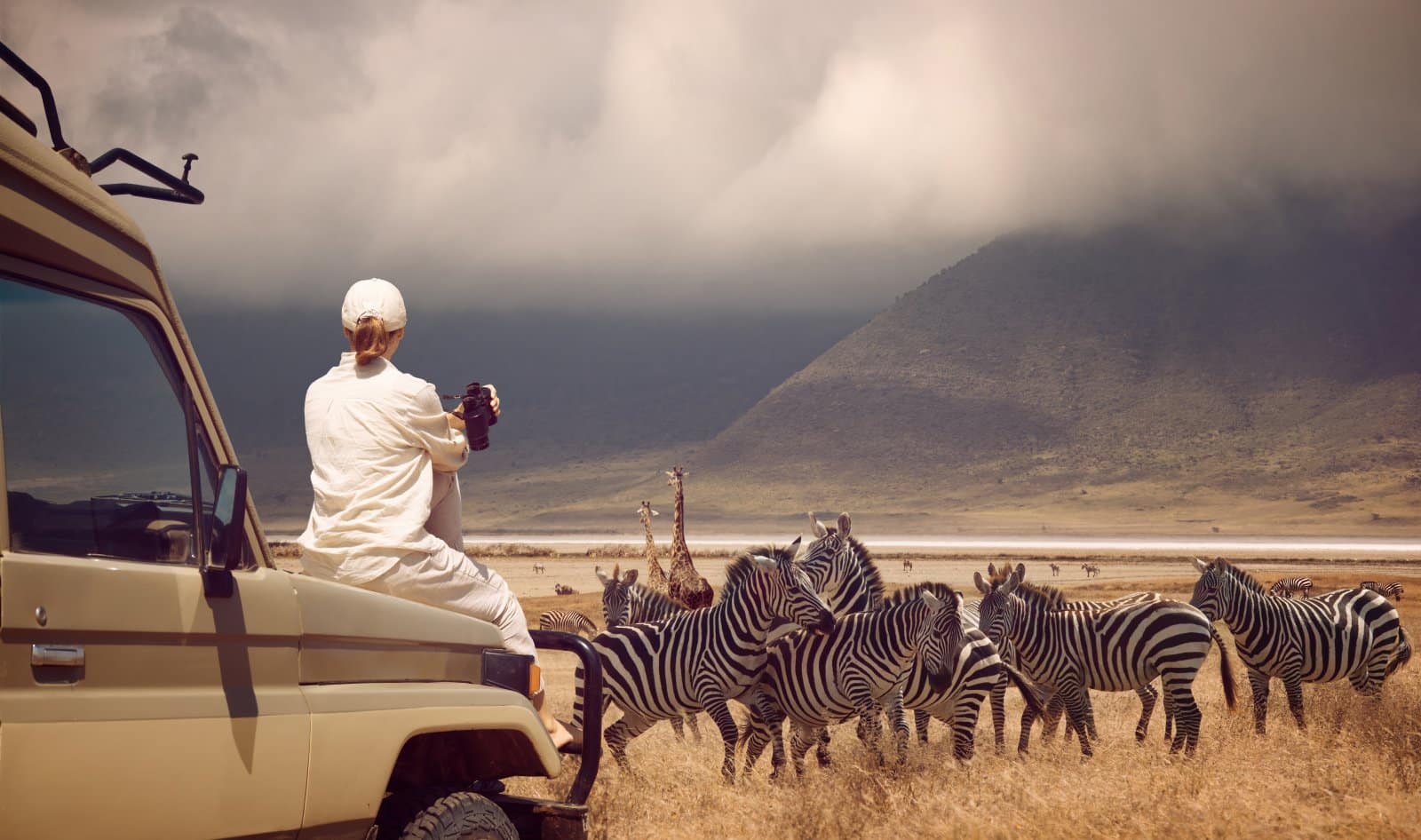
The Bottom Line
Your African safari adventure awaits, with each destination offering a unique window into the continent’s incredible wildlife and landscapes. Whether you’re floating down the Okavango Delta, witnessing the Great Migration in the Serengeti, or walking among the wildlife in South Luangwa, these experiences will leave you with memories to last a lifetime. Choose your destination based on the wildlife you want to see and the type of safari experience you’re after. Get ready for an adventure that will bring you face-to-face with the wonders of the African wild.
More Articles Like This…
Barcelona: Discover the Top 10 Beach Clubs
2024 Global City Travel Guide – Your Passport to the World’s Top Destination Cities
Exploring Khao Yai 2024 – A Hidden Gem of Thailand
The post A Guide to the 10 Best Safari Experiences in Africa republished on Passing Thru with permission from The Green Voyage .
Featured Image Credit: Shutterstock / Thomas Retterath.
For transparency, this content was partly developed with AI assistance and carefully curated by an experienced editor to be informative and ensure accuracy.
More for You
Florida Sees Thousands of People Quit Their Jobs
OJ Simpson has been cremated, estate attorney in Las Vegas says. No public memorial is planned
25 Beloved Movies We’ll Never Let Our Kids Watch
Senate kills Mayorkas impeachment trial, votes both articles 'unconstitutional'
17 'Titanic' Characters With Their Real-Life Counterparts
19 Workplace Norms That Millennials and Gen Z Are Refusing to Accept
Was the wreckage found off Argentina a Nazi submarine?
Top 20 Saturday Night Live Sketches That Broke the Whole Cast
Dr Pepper Has a New Flavor Hitting Shelves Now
The Most Visited Attraction in Every US State
Ketanji Brown Jackson's New Warning To Supreme Court
29 Ridiculous Lies That Hollywood Has Managed to Mainstream
The obesity rate in America is the highest in these cities, according to data
'Shōgun' Really Did That in Episode 9
Biden is off on details of his uncle's WWII death as he calls Trump unfit to lead the military
8 Shoes to Wear with Leggings This Spring That Aren’t Sneakers
Alaska Airlines Planes Grounded Nationwide: Everything We Know
20 Saddest Kids' Movies of All Time
I moved from California to Tennessee for my husband's job. We can finally save money, but it's been a major culture shock.
14 Things You’re Not Buying from Walmart—But Should

- Tented Safari
- 4 Day Classic Tented Safari
Reservation for Explore Kruger - Classic Tented Kruger Park Safari Package
- All accommodation is subject to availability
- All last minute reservations (less then 31 days prior to arrival date) are payable within 48 hours after receiving a confirmed provisional reservation via e-mail.
- As accommodation availability changes from day to day all enquiries about general availability are subject to change without notice. Accommodation availability is only guaranteed once you receive a provisional reservation confirmation. In order to secure your reservation full pre-payment is required.
- Customer Support
- Tel: +27 21 424 1037
- Fax: +27 21 424 1036
- Contact by Mail
- Business Hours
- Mon - Fri. 08:00 - 17:00
- Saturday. 08:00 - 12:00
- Reservations and Booking
- Booking Conditions
- Visa and Passport
- About Siyabona Africa (Pty) Ltd
- Game Reserves
- Balule Game Reserve
- Manyeleti Game Reserve
- Sabi Sand Game Reserve
- Thornybush Game Reserve
- Timbavati Game Reserve
- Near Kruger National Park
- Birding in Kruger Park
- Kruger National Park
- Most Popular Pages
- Kruger Park Maps
- Best Time to Visit Kruger
- Getting to Kruger
- Accommodation at a Glance
- Camp Gates Map
- Kruger Park Gate Times
- Kruger Travel Help
- Conservation Fees
- Kruger Park News
- Reference Guide
- Africa Mammal Guide
- Africa Bird Guide
- African Flowers Guide
- Africa Grass Guide
- African Tree Guide
- African Reptiles Guide
- Kruger Park Culture
- Kruger Park History
- Kruger National Park Tourism
- Kruger National Park Hotels
- Kruger National Park Bed and Breakfast
- Kruger National Park Vacation Rentals
- Flights to Kruger National Park
- Kruger National Park Restaurants
- Things to Do in Kruger National Park
- Kruger National Park Travel Forum
- Kruger National Park Photos
- Kruger National Park Map
- All Kruger National Park Hotels
- Kruger National Park Hotel Deals
- Kruger National Park
- Things to Do
- Restaurants
- Vacation Rentals
- Travel Stories
- Rental Cars
- Add a Place
- Travel Forum
- Travelers' Choice
- Help Center
Camera Beanbags - Kruger National Park Forum
- Africa
- South Africa
- Kruger National Park
Camera Beanbags
- United States Forums
- Europe Forums
- Canada Forums
- Asia Forums
- Central America Forums
- Africa Forums
- Caribbean Forums
- Mexico Forums
- South Pacific Forums
- South America Forums
- Middle East Forums
- Honeymoons and Romance
- Business Travel
- Train Travel
- Traveling With Disabilities
- Tripadvisor Support
- Solo Travel
- Bargain Travel
- Timeshares / Vacation Rentals
- South Africa forums
- Kruger National Park forum

We are heading to Kruger for a month in early May. Does anyone know if you can buy camera beanbags from any of the shops in Kruger Park? Having trouble sourcing in Australia. Thank you
7 replies to this topic

What the hell is a "camera bean bag"? One would presume you have tried Teds or Micheals?

I somehow doubt it, but you never know. Is there no online photography supplier in Australia?
You could always call say Lower Sabie (which has a good sized shop) on +27 (0)13 735 6056/7 and ask.

Is a beanbag the right thing? Rarely see them in the parks. More common is to rest the lens on the top edge of the window. We have a short piece of slitted hosepipe for this. You also get purpose made window edge clamps. These things are small to carry - try at home first.

This company rents camera equipment and will deliver anywhere in South Africa. They have the bean bag wedges for over the door or window. https://www.outdoorphoto.co.za/mobile-camera-support/beanbags
Please note that I have not used them but am aware of them through others that have.
In the US Amazon also sells bean bags. Of course, make sure to travel with it empty and fill it with sand, rice or beans once in South Africa.

Agree with @Gerald D.
But I first roll up a t-shirt place that on the edge of the window, and then the camera lens rests on that.

We do use a beanbag, if we're there for a week or more, we have one with a plate for a gimbal. But you can make a very simple one yourselves if you have a sewing machine, ideally sew in a liner so the rice doesn't escape. Examples... https://www.wexphotovideo.com/camera-bean-bags/?p=categoryPath%3A%22tripods%3Esupports%3Ecamera-bean-bags%22&rows=12&start=0
While the parks shops have started selling things like cool boxes I don't recall them having beanbags. They are reasonably rare to see in the park.
- Camera Beanbags yesterday
- Help with Lodging Split Apr 14, 2024
- Kruger Safari questions for 7 nt safari Oct 2025 Apr 11, 2024
- Help with bewildering amount of info Apr 11, 2024
- Sabi Sands (4n) OR Timbavati+Klaserie (7n) Combo Apr 08, 2024
- Guided tours start and end at the park Apr 06, 2024
- Free week for SA residents Apr 05, 2024
- Kruger Gate or Crocodile Bridge Gate or Malelane gate Apr 05, 2024
- Which area to stay for best wildlife viewing in July? Apr 04, 2024
- Help with lodge in Sabi Sands Apr 04, 2024
- questions about sabi sands/kruger and lodgings Apr 04, 2024
- First time safari with teens Apr 03, 2024
- Travel with teenagers and safety Apr 01, 2024
- Royal Malenwane Lodge or Singita Lemombo? Apr 01, 2024
- Best time of year to go to Kruger National Park area? 3 replies
- Organised safari tour Johannesburg to Kruger 13 replies
- Closest Airport to Kruger National Park 7 replies
- Flights from Victoria falls to Kruger 5 replies
- Siyabona Africa Safaris 9 replies
- Icon Expeditions Tour Company South AFrica 8 replies
- Flights from Cape Town to Kruger National Park 6 replies
- Sabi Sands OR Timbavati 26 replies
- Go2africa? Are they good? Can anybody advise? 28 replies
- Kruger, Chobe or Okavango Delta 7 replies
Kruger National Park Hotels and Places to Stay
- How to do Kruger
- Under what circumstances do I need to take Malaria Prophylaxis in Kruger area
- Tipping during safari
- Background to staying and booking in Kruger National Park
- Top Safari Destinations
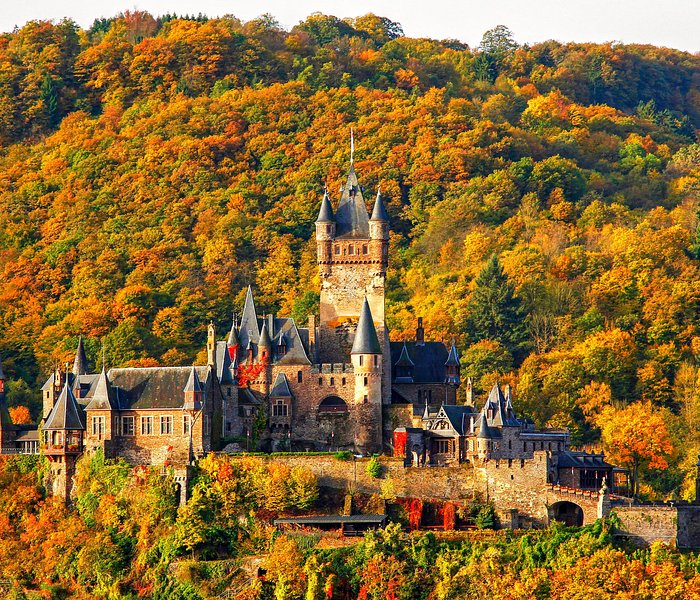

IMAGES
VIDEO
COMMENTS
3-Day Ultimate Kruger Park Open Safari Vehicle Tour. $614 pp (USD) South Africa: Shared tour (max 6 people per vehicle) Guest House. You Visit: Johannesburg (Start), Elephant Whispers (Elephant Sanctuary), Kruger NP, Nelspruit (End) Elephant Herd Tours & Safaris. 4.8 /5 - 90 Reviews.
The Kruger national park is a leading African wilderness, not only does it offer the Big 5 but cheetah and Wild Dogs, and…. Free cancellation. Recommended by 100% of travelers. from. $124. per adult. 6. Kruger National Park sunrise Morning Private safari. 104.
Classic Kruger Safari. 2 to 7 Day safaris from R10 900 per person. As the name states, this is the classic way of going on safari in the Kruger National Park. On a Classic safaris, you will stay in en-suite chalets in the heart of the National Park with open vehicle safari drives. View Our Classic Safaris.
3 Day Kruger Park Lukimbi Fly-in Safari. 2 Nights at Lukimbi Safari Lodge in the Kruger Park, three full meals per day, all teas and coffees, two game drives daily in open land rovers and a safari walk. BIG 5 off-road game viewing. Big Five sightings in their natural habitat. Private views of the river or bush from your suite.
Guided by trained and passionate guides, guests can enjoy up to 9 hours of safari time in the Kruger National Park on our Full Day Safaris, a longer duration compared to most other companies. We use comfortable open-air safari vehicles, providing guests with a remarkable bird's-eye view of the wildlife encounters.
4-Day Unforgettable Kruger Park Safari & Panorama Tour. $855 pp (USD) South Africa: Shared tour (max 6 people per vehicle) Hotel. You Visit: Johannesburg (Start), Southern Kruger, Kruger NP, Panorama Route (Highlight), Nelspruit (End) Elephant Herd Tours & Safaris. 4.8 /5 - 90 Reviews.
5 Day Kruger Park Jock Safari Lodge. Embark on a remarkable 5 Day safari expedition at Jock Safari Lodge, nestled within the iconic Kruger National Park. Encounter the Big Five, indulge in luxury accommodations, and create lifelong memories in the heart of the African wilderness. Collection from OR Tambo Airport Bus Terminals by 07:00am.
Kruger National Park is justifiably one of the most famous parks in Africa. The park is the size of a small country and supports a huge variety of wildlife. All of the Big Five are present in large numbers. A comprehensive road network that is fine for 2WD cars means Kruger is one of the best parks for self-drive safaris.
4-Day Kruger National Park Train on the Bridge Safari. $2,030 to $2,370 pp (USD) South Africa: Shared tour (max 9 people per vehicle) Lodge. You Visit: Johannesburg (Start), Kruger NP, Johannesburg Airport (End) The Kruger Safari Co. 5.0 /5 - 125 Reviews.
The Kruger National Park is the largest game reserve in South Africa and one of the world's biggest wildlife sanctuaries. It is approximately the same size and shape as Israel or Wales and covers 20,720 square kilometers. It is no wonder Kruger National Park offers visitors an experience of a lifetime. The reserve's unspoiled and untamed ...
Kruger National Park. South Africa, Africa. Kruger is one of the world's greatest wildlife-watching destinations. All of Africa's iconic safari species - elephant, lion, leopard, cheetah, rhino, buffalo, giraffe, hippo and zebra - share the bushveld with a supporting cast of 137 other mammals and over 500 varieties of bird.
Kurt Safari offers one of the widest varieties of Kruger National Park Safari Packages, from exciting 3, 4, and 5 Day Packages to an epic 8 day Photographic and Birding safaris. Each tour is conducted with professional guides, who are both passionate about the park and knowledgeable about its inhabitants. To book any of our Kruger Park safaris ...
Luxury Lodge Safari in Kruger National Park. This selection of the finest luxury accommodation and lodging in Kruger Park is where you will discover a way to appreciate the African wild and do it in comfort - with exceptional cuisine, magnificent wildlife experiences and great hospitality. Our South African safari and game lodges range from artistically elegant to super luxurious with en-suite ...
A Kruger National Park safari offers some of the finest Big 5 game viewing in the world, award-winning accommodation, smooth-running logistics, and some of Africa's best trackers and guides. If you're looking for some of the very best luxury Kruger safaris, then visiting the Kruger's private game reserves will satisfy your every need for a ...
5-Day Kruger Park and Manyeleti Bongan African Lodge. $864 pp (USD) South Africa: Shared tour (max 12 people per vehicle) Lodge. You Visit: Johannesburg (Start), Manyeleti GR (Greater Kruger), Central Kruger, Blyde River Canyon (Panorama Route), Kruger NP, Johannesburg (End) Bongan Safaris. 4.9 /5 - 18 Reviews. Top Rated Operator.
The Kruger offers top-notch classic safaris where expert guides and trackers go in search of the Big 5 in customised 4×4 vehicles. For the truly adventurous, lodges like Rhino Post in the national park, Africa on Foot in Klaserie and Ngala Safari Lodge in Timbavati offer walking safaris, where your game drives can be replaced by venturing out on your own steam with a guide to discover Kruger ...
Established in 1898 to protect the wildlife of the South African Lowveld, this national park is unrivalled in the diversity of its life forms and a world leader in advanced environmental management techniques and policies. Kruger is home to an impressive number of species: 336 trees, 49 fish, 34 amphibians, 114 reptiles, 507 birds and 147 mammals.
From humble beginnings in 1991, Viva Safaris has grown to become the most sought after tour operator servicing the Kruger National Park region. Our diversity of Kruger Park safari experiences easily beat those of any competitor. Get up close to the Big 5 in the Kruger Park with one of our open game viewers!
The showpiece of South African safari, Kruger National Park is one of the world's most famous protected areas, and for good reason. This huge (19,485 sq km) park in the far northeast of South Africa is home to tens of thousands of mammals and birds including large numbers of all your African favourites. The scenery is classic Africa, with the ...
The African Rock Lodge is an affordable lodge in a wildlife estate near Kruger National Park. With its Big Five theme, the thatched accommodation complements the natural environment. The suites have private decks, opening onto the sounds of the wild. The main building has a pool, terrace, and large barbecue area.
Un viaje muy cómodo que combina el Parque Nacional Kruger en Sudáfrica con el paraíso tropical de la Isla de Bazaruto en Mozambique. Explora la sabana africana a través de auténticos safaris en todoterrenos, y relájate en las playas vírgenes de arena blanca de Bazaruto. Ver destinos. VER VIAJE. Safaris en Kruger y playas de Mozambique.
Sobre el Parque Kruger. LO QUE HAY QUE SABER ANTES DE LLEGAR. El Parque Nacional Kruger es uno de los destinos preferidos por quienes visitan Sudáfrica. Sus casi dos millones de hectáreas son un refugio para la vida salvaje. Campamentos, lodges y hoteles para disfrutar de un safari inolvidable en el Parque Kruger.
Experience an authentic, unfiltered safari like never before on this 4 day safari at Jock Safari Lodge, located within the Kruger National Park. Off-road safaris Private lodges inside the Kruger enjoy special benefits like driving off-road to track the BIG 5. Your stay with us includes 2x daily game drives.
The Kruger Park was up against the likes of Zanzibar in Tanzania, Mauritius, Hurghada in Egypt and Grand Cayman in the Caribbean. The Kruger offers wildlife safaris, hiking trails, game viewing ...
3. Chimpanzees. 2. Tigers. 1. Bears. Embarking on an African safari is an experience like no other. The continent's vast and diverse landscapes, rich wildlife, and unique cultural heritage make ...
Kruger National Park - South African Safari. Customer Support; Tel: +27 21 424 1037; Fax: +27 21 424 1036; Contact by Mail; Business Hours; Mon - Fri. 08:00 - 17:00; Saturday. 08:00 - 12:00; Booking; Reservations and Booking; Booking Conditions; Visa and Passport; About Siyabona Africa (Pty) Ltd;
Does anyone know if you can buy camera beanbags from any of the shops in Kruger Park? Having trouble sourcing in Australia. Thank you. Kruger National Park. Kruger National Park Tourism ... Kruger Safari questions for 7 nt safari Oct 2025 Apr 11, 2024; Help with bewildering amount of info Apr 11, 2024; Sabi Sands (4n) OR Timbavati+Klaserie (7n) ...
Maps Kruger National Park South Africa safari - This definitive Kruger Park safari accommodation guide offers suggested package tours, day trips, safari lodges. Zelia. Natal. Durban. South Africa Road Trips. South African. Trip. Tips Krugerpark Bezoeken | Praktische info, mooie routes, safari, slapen.